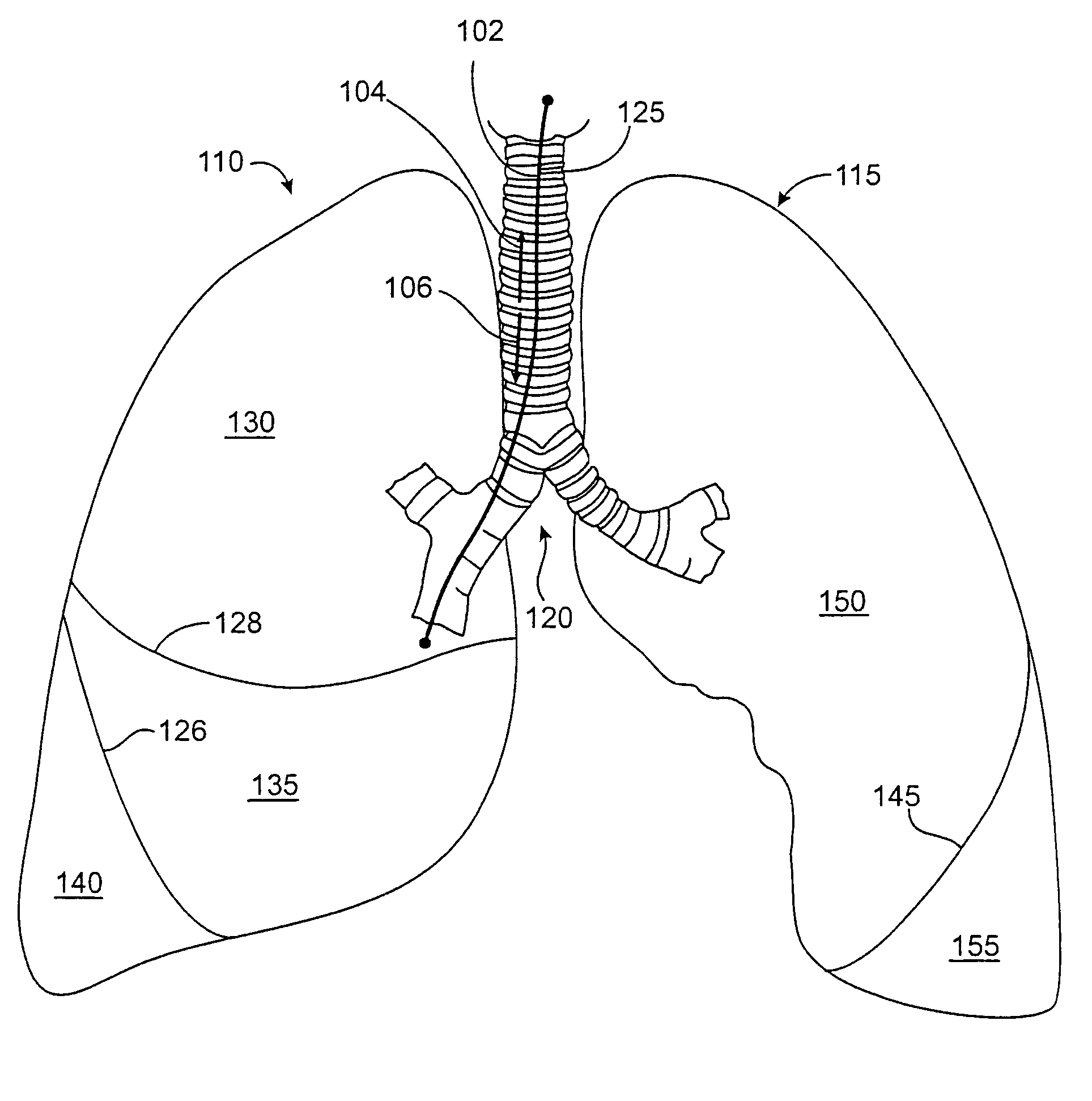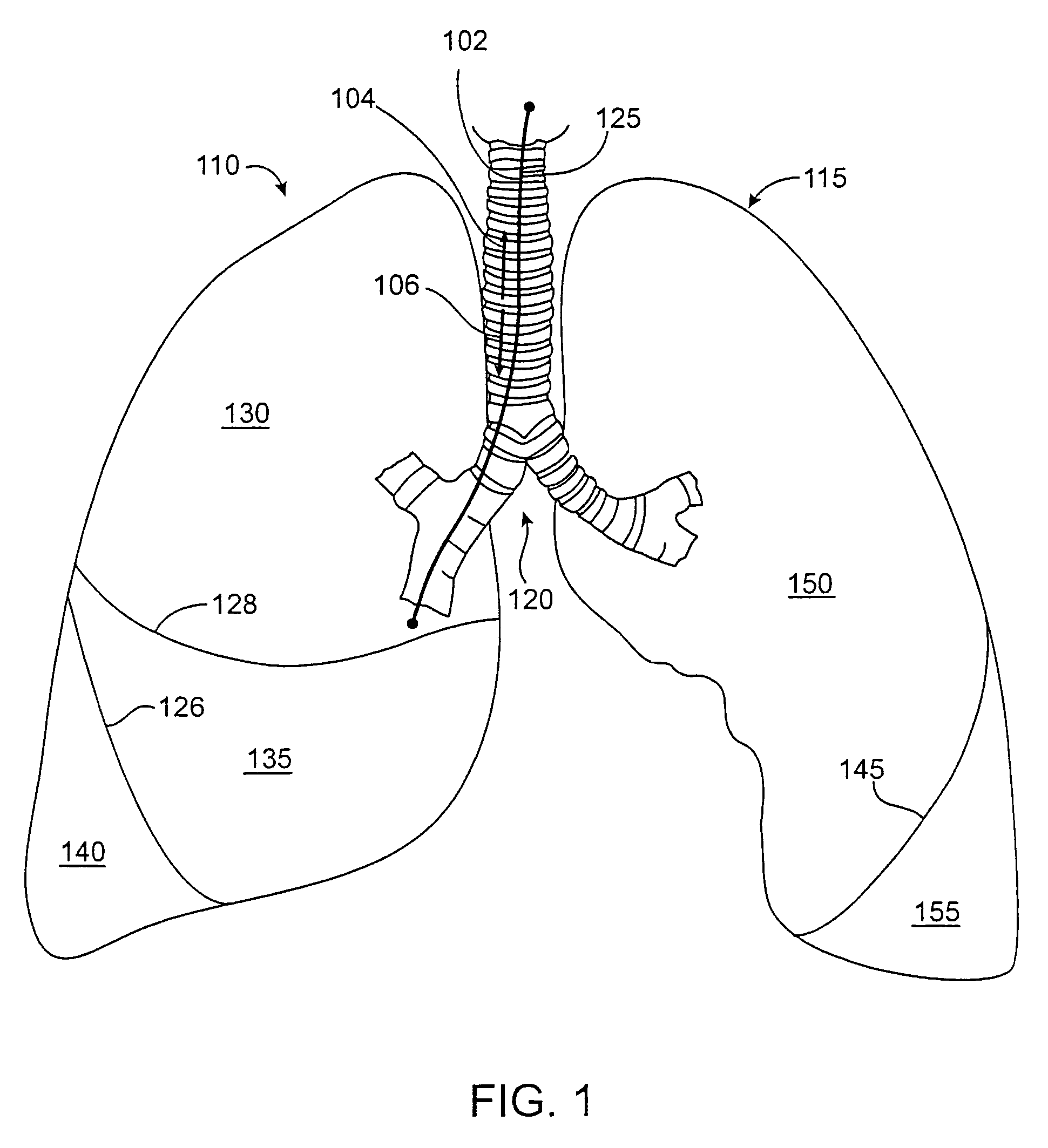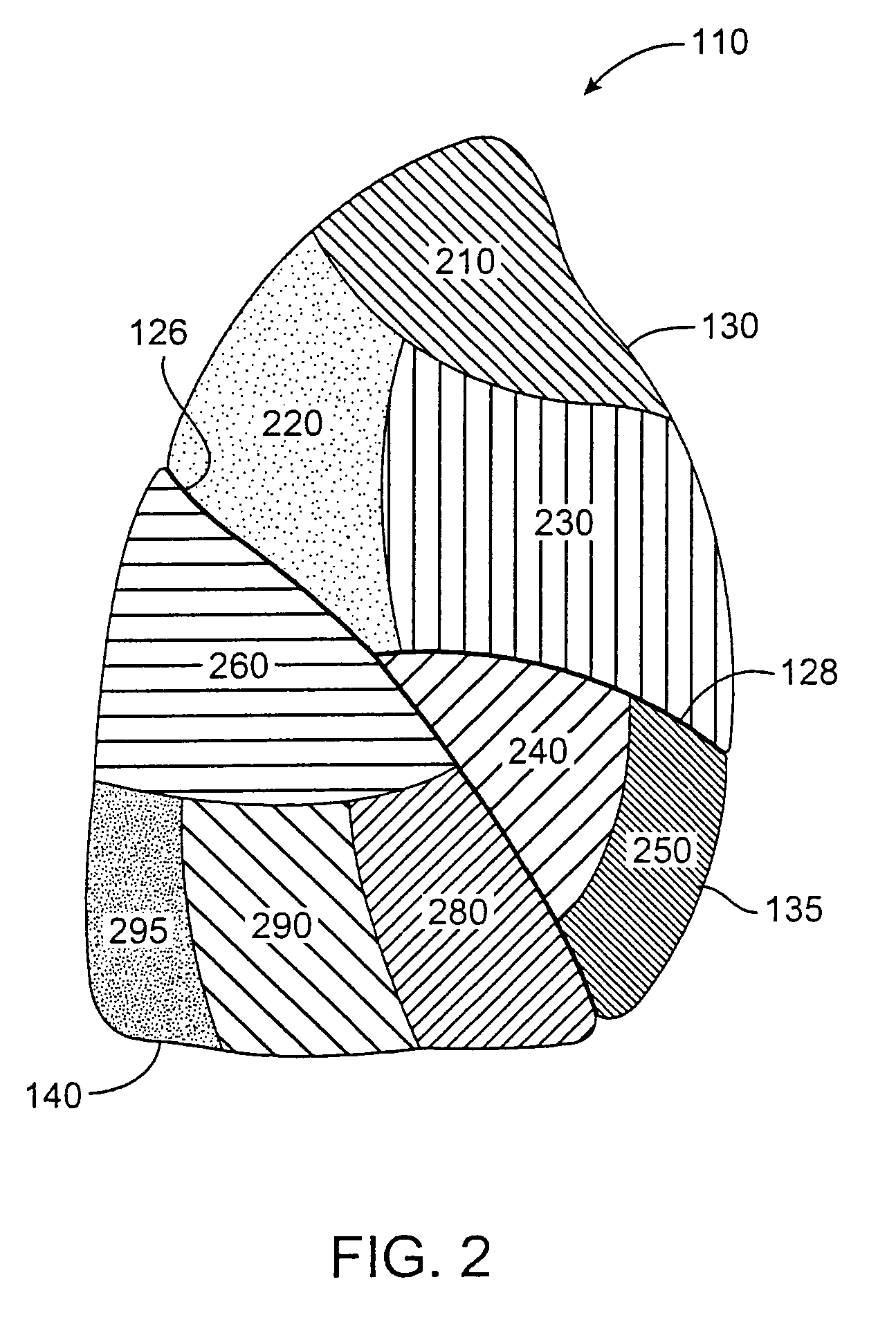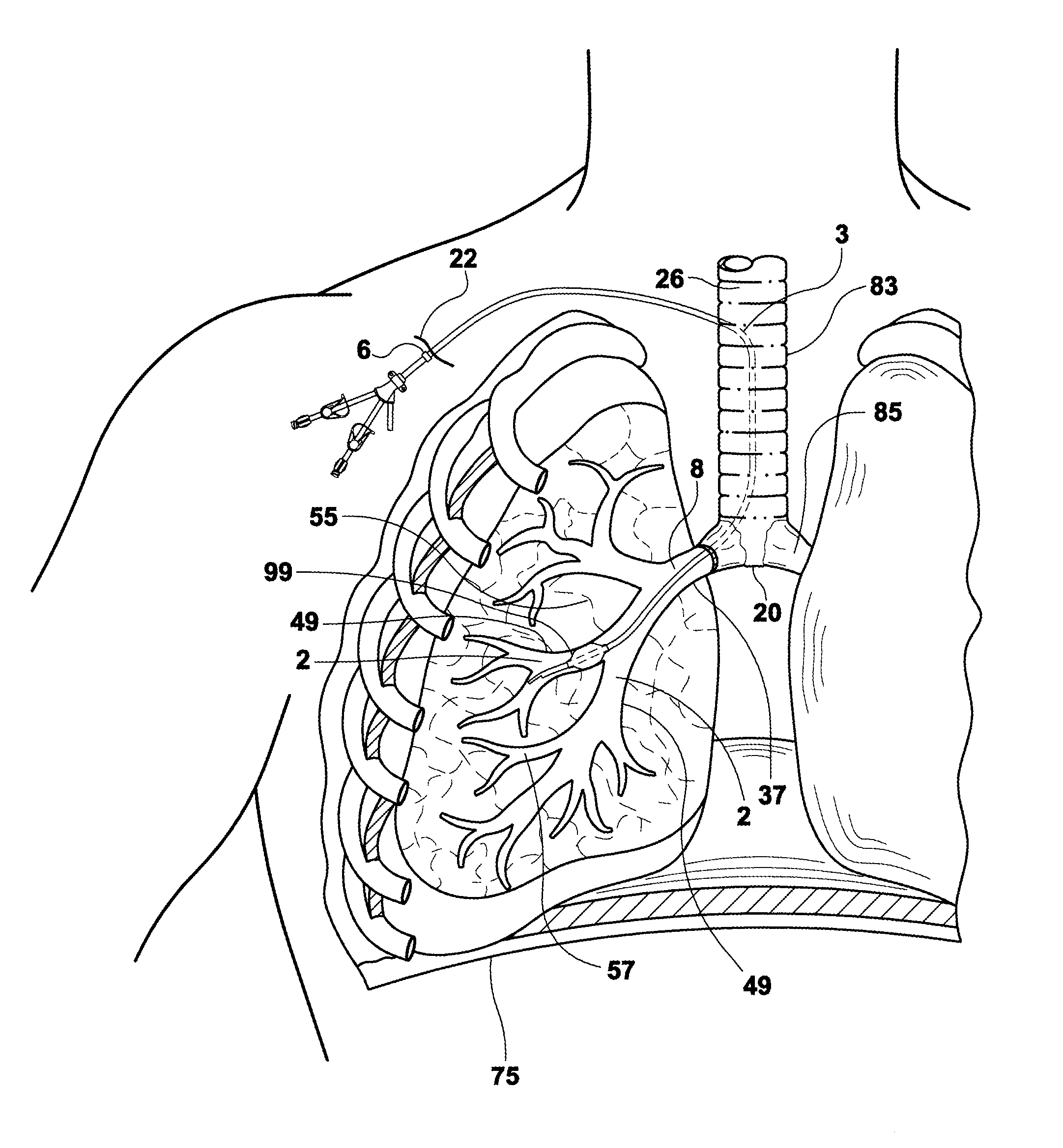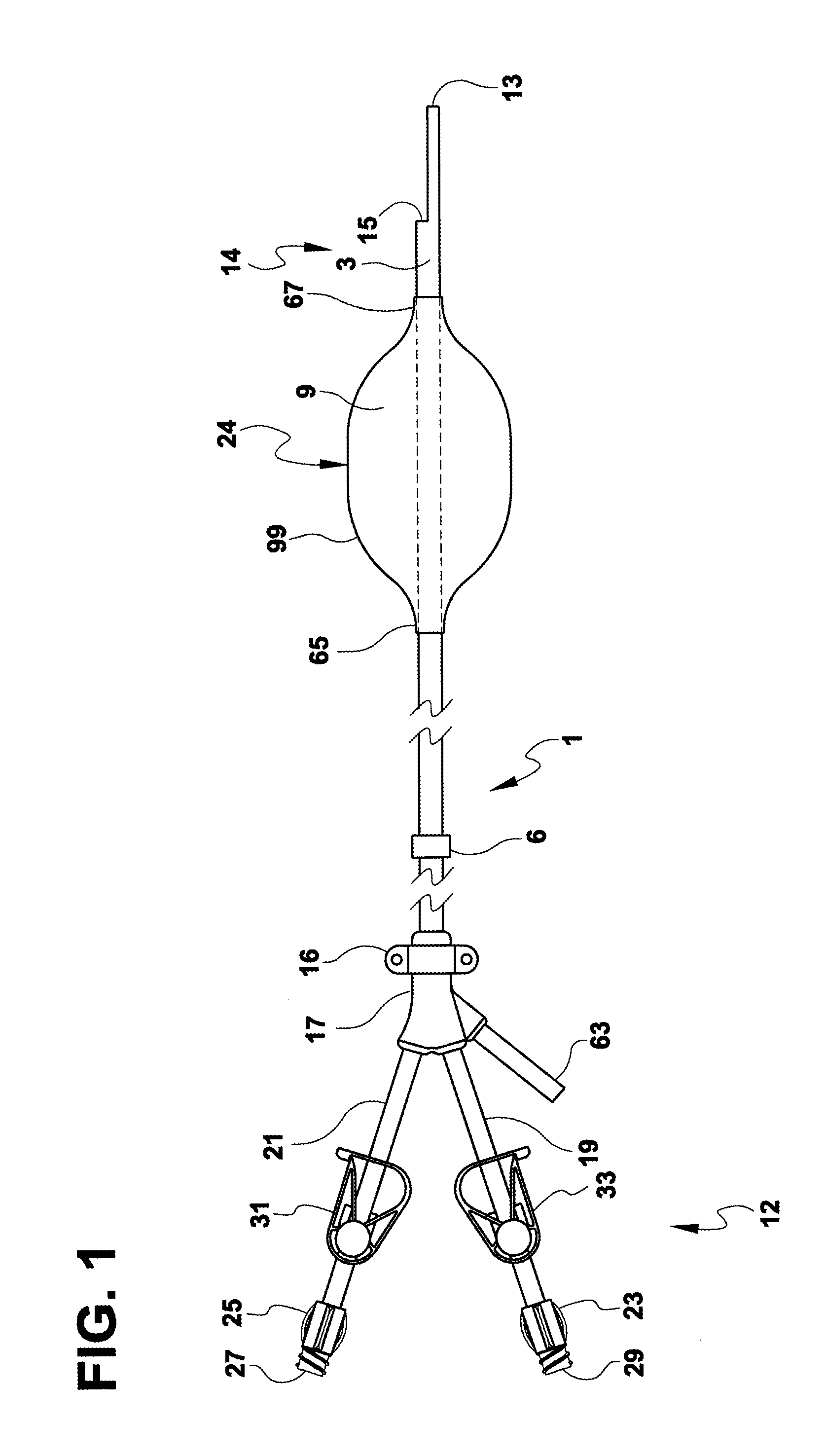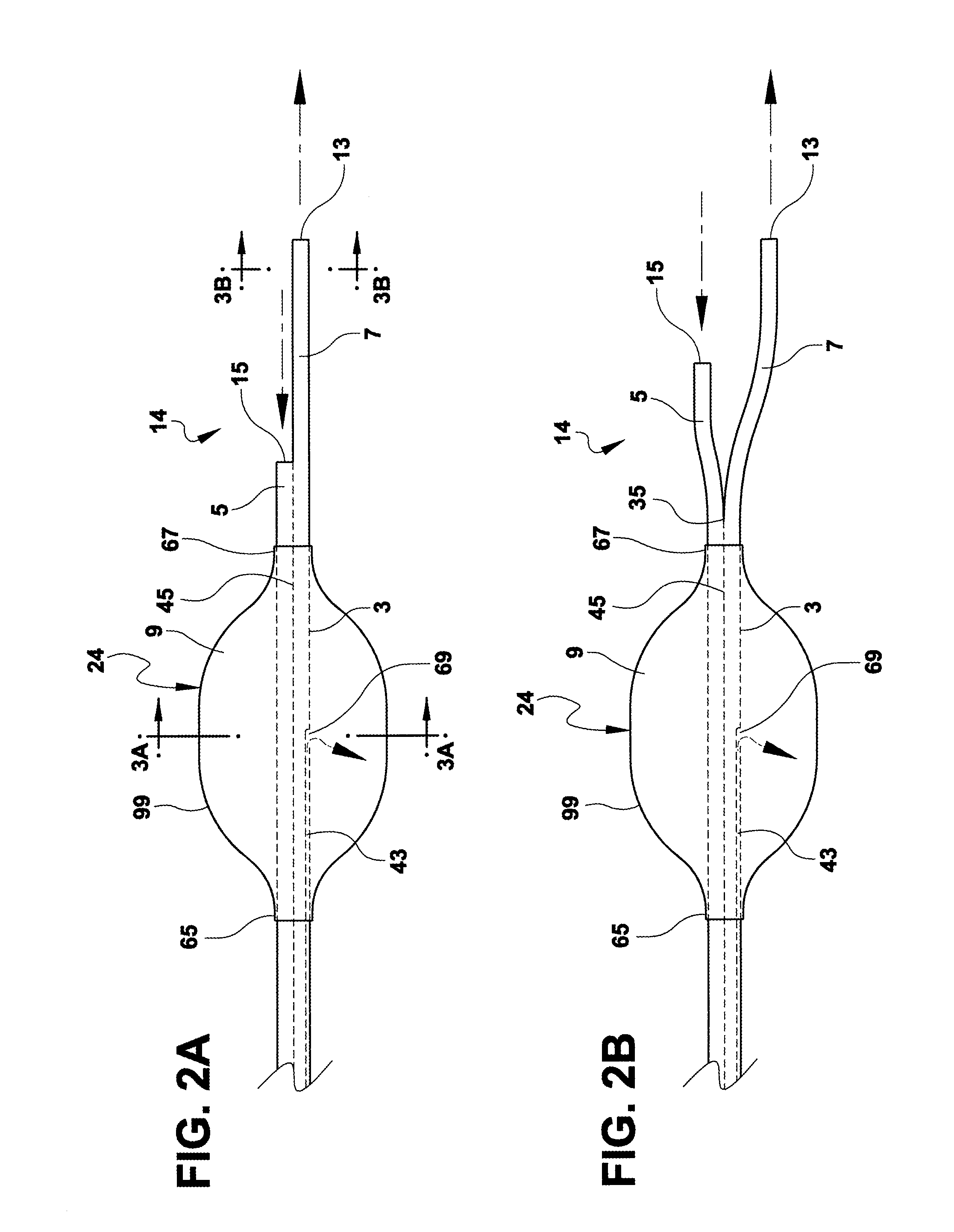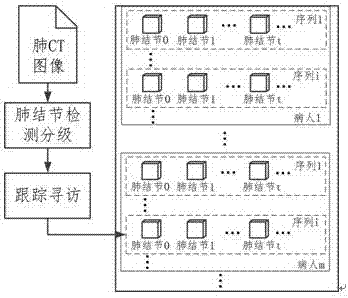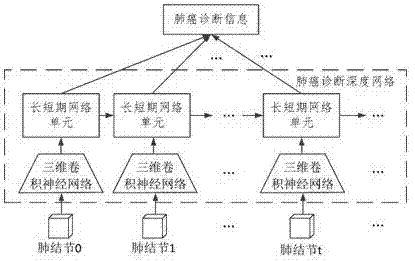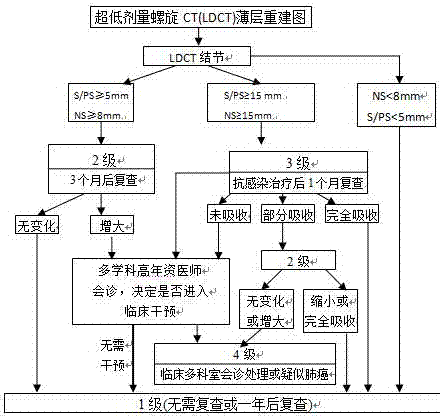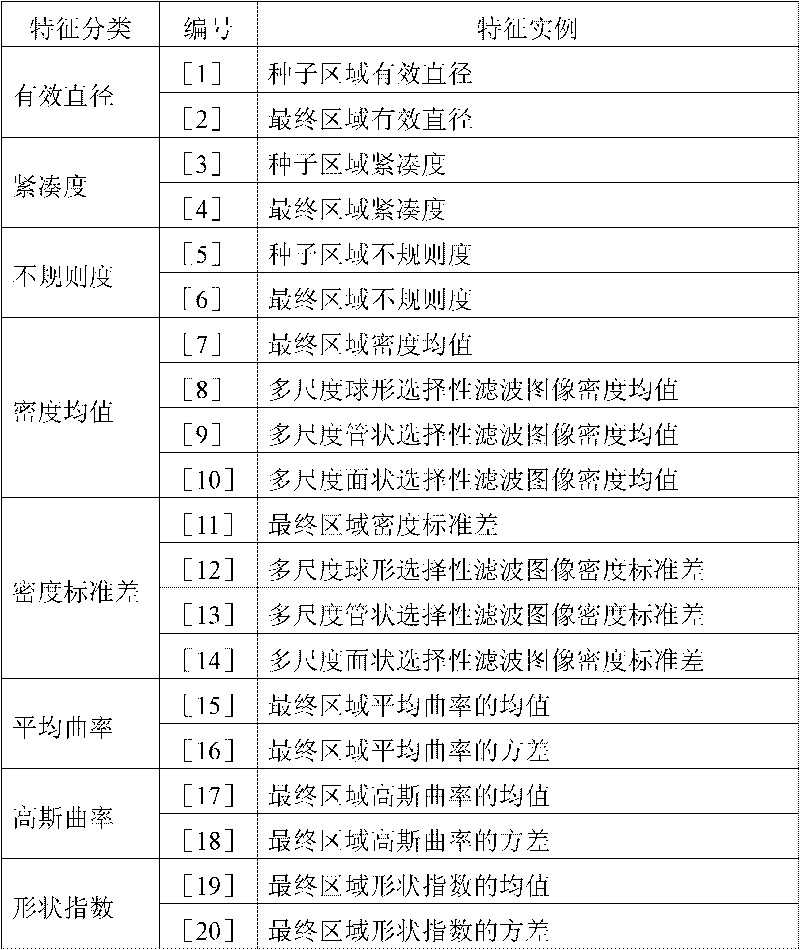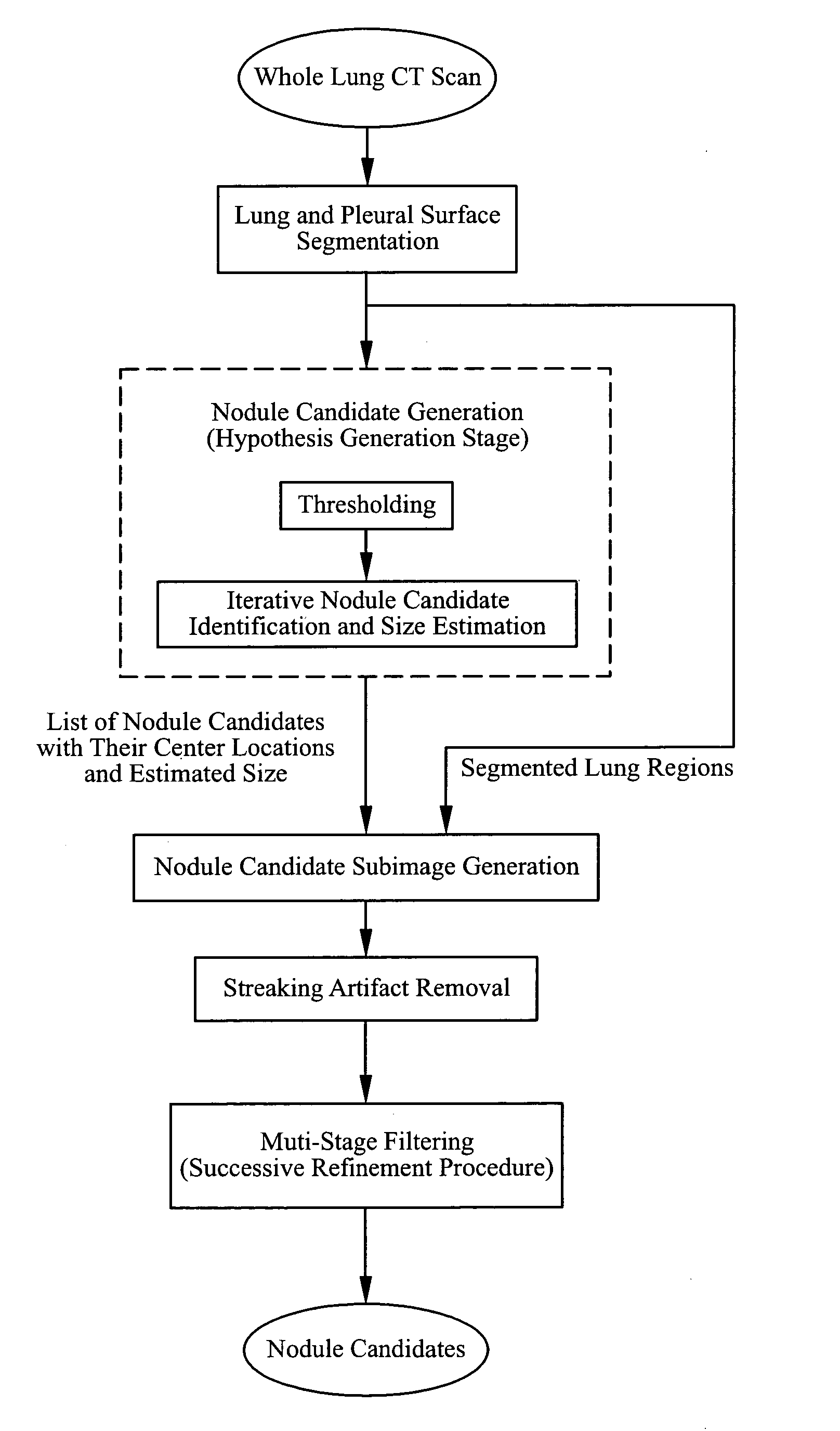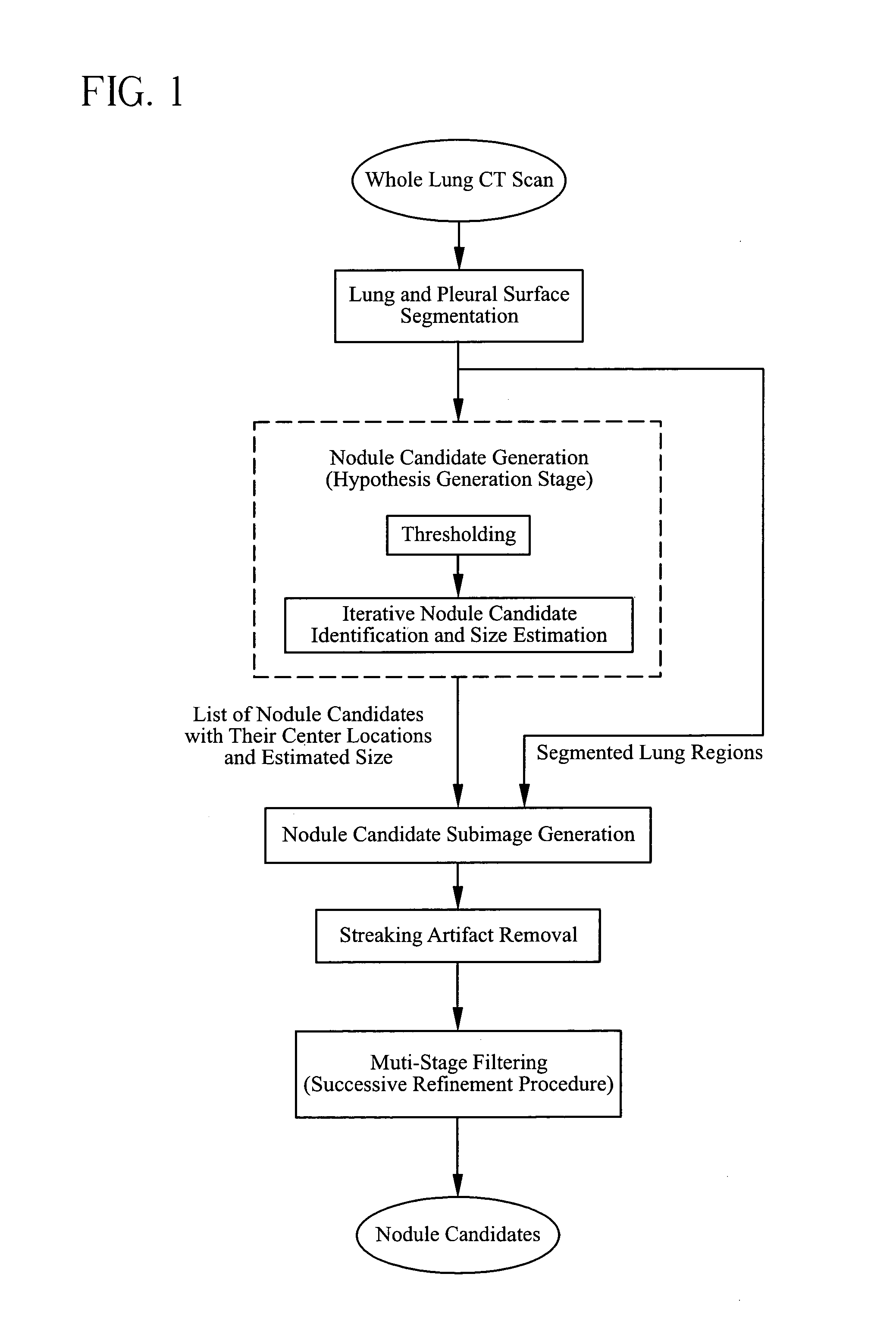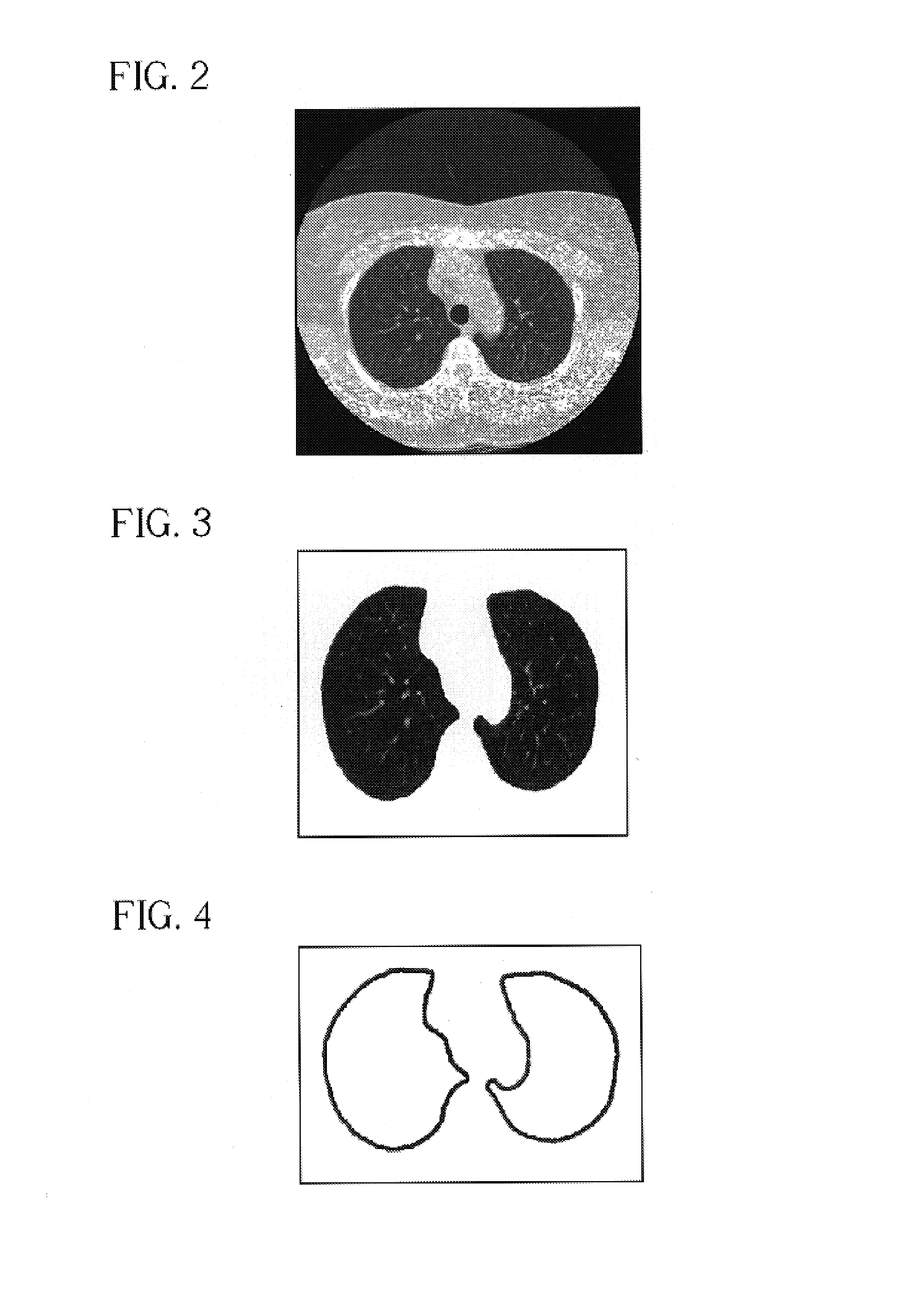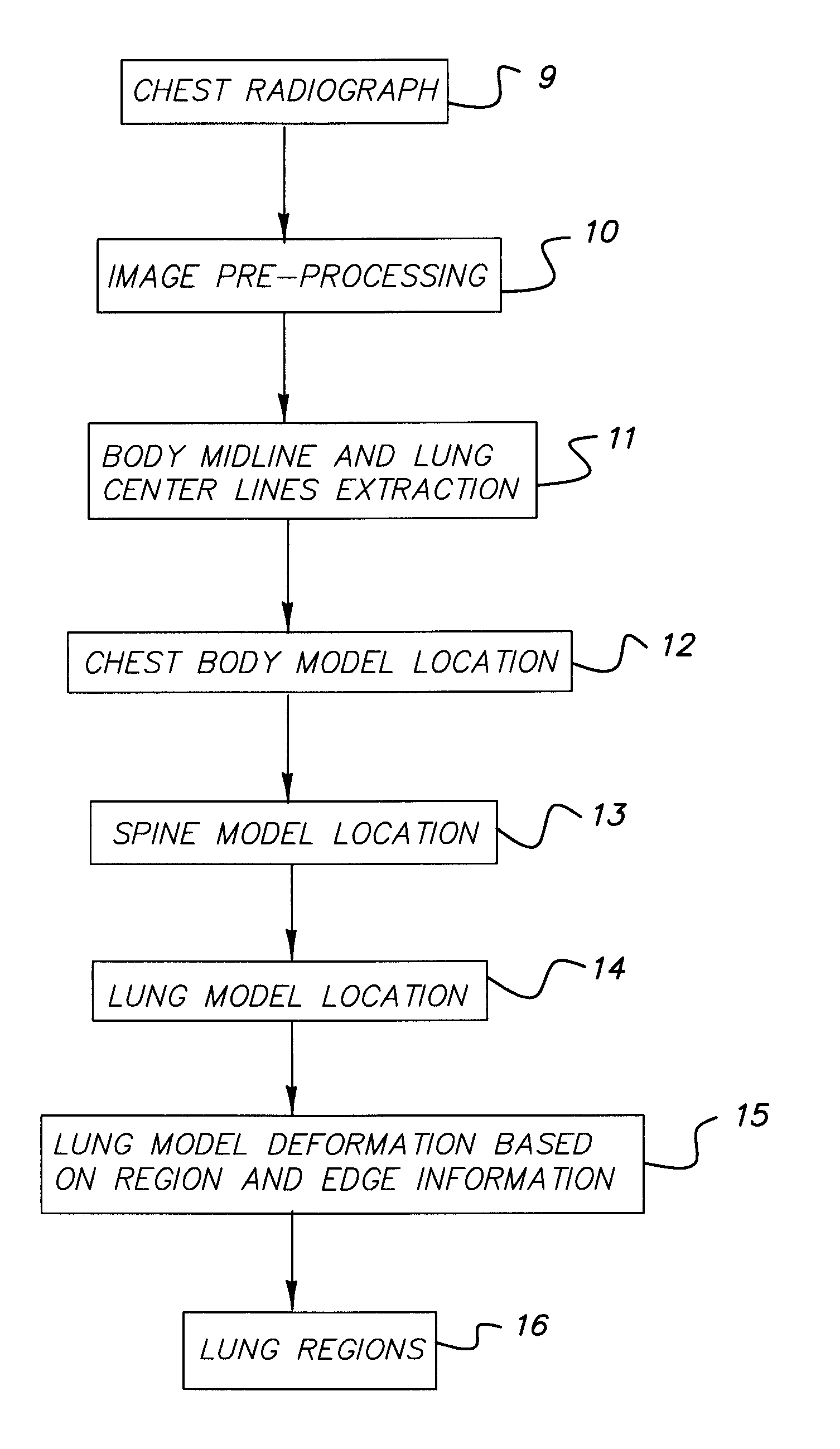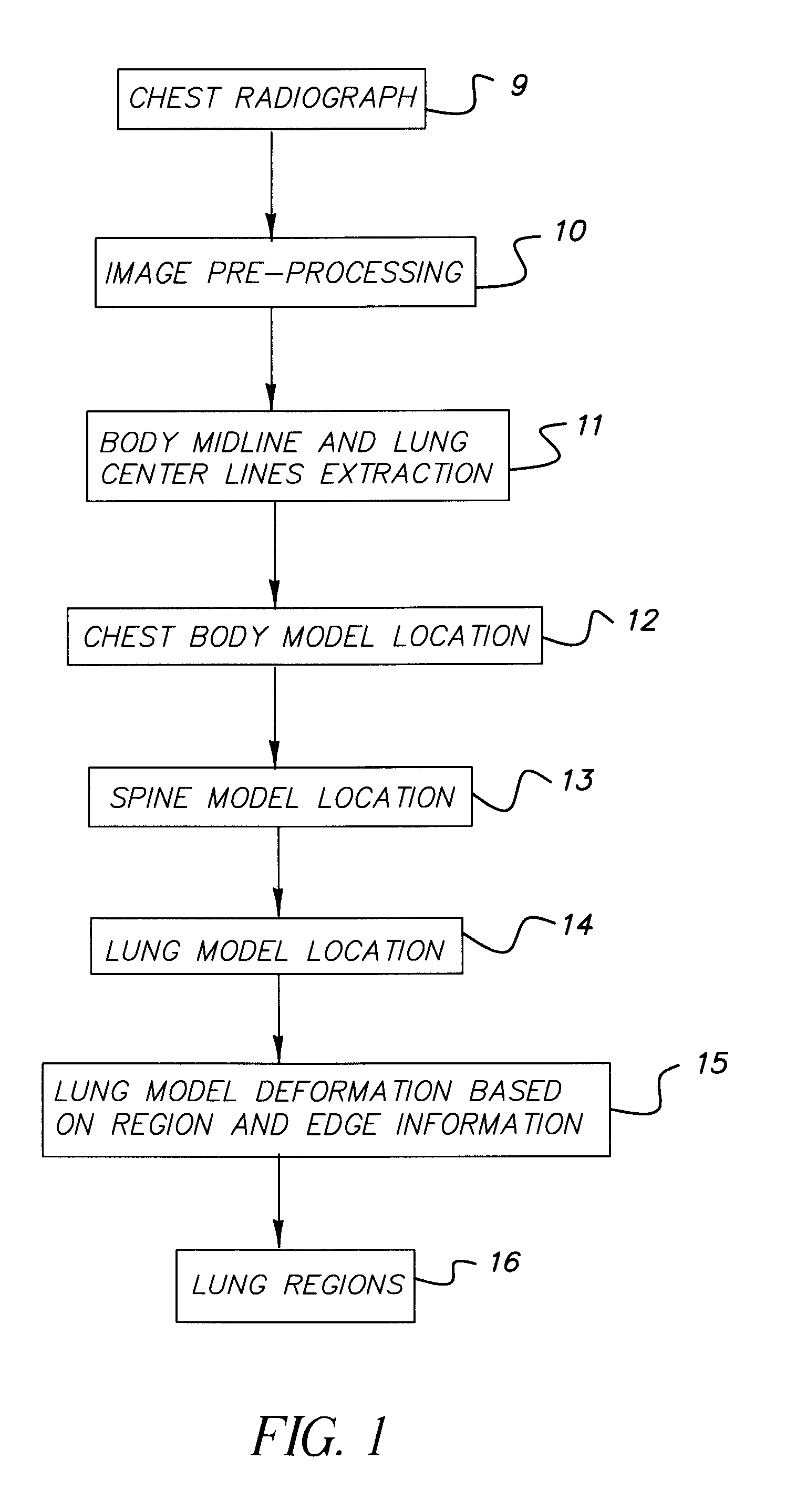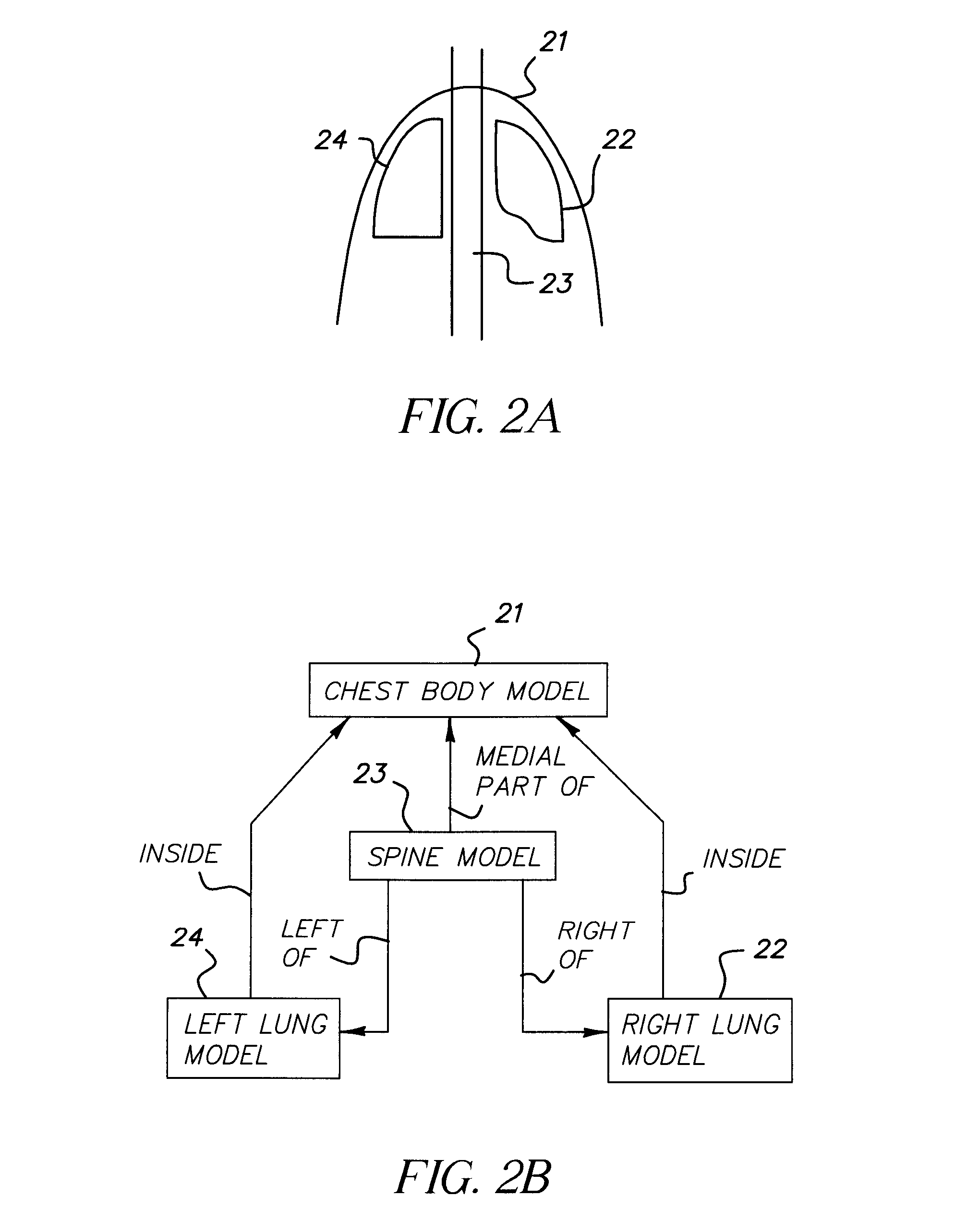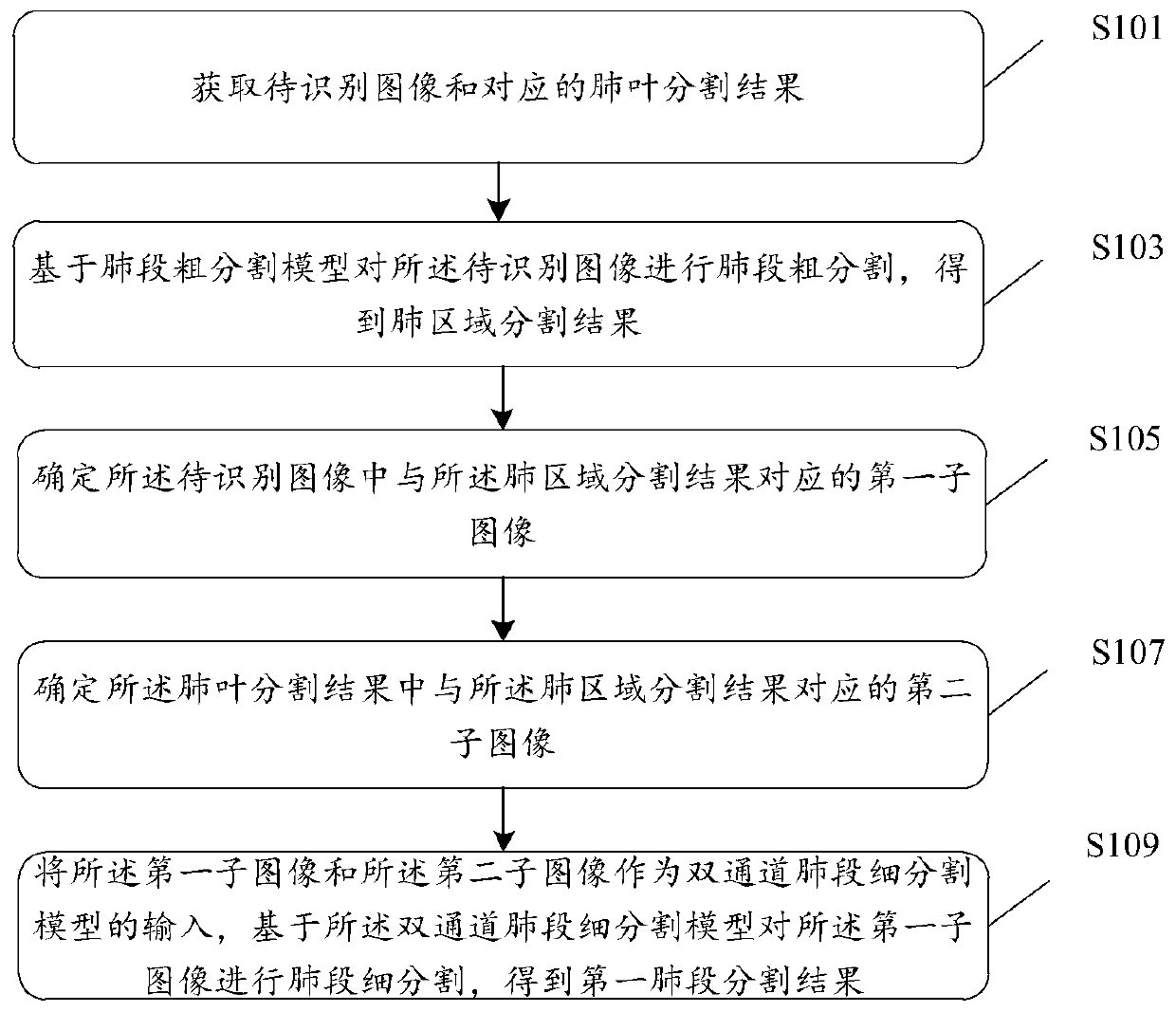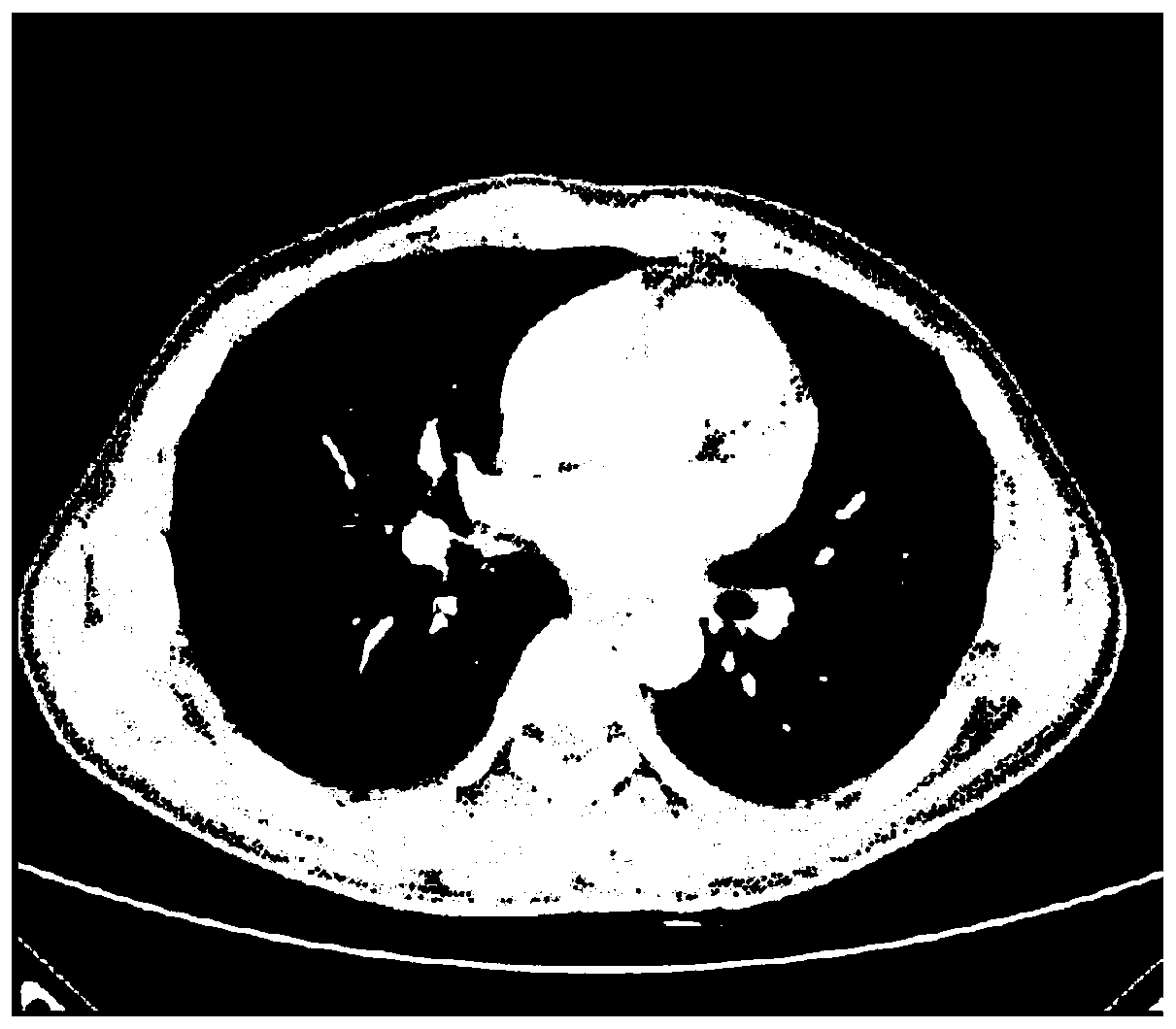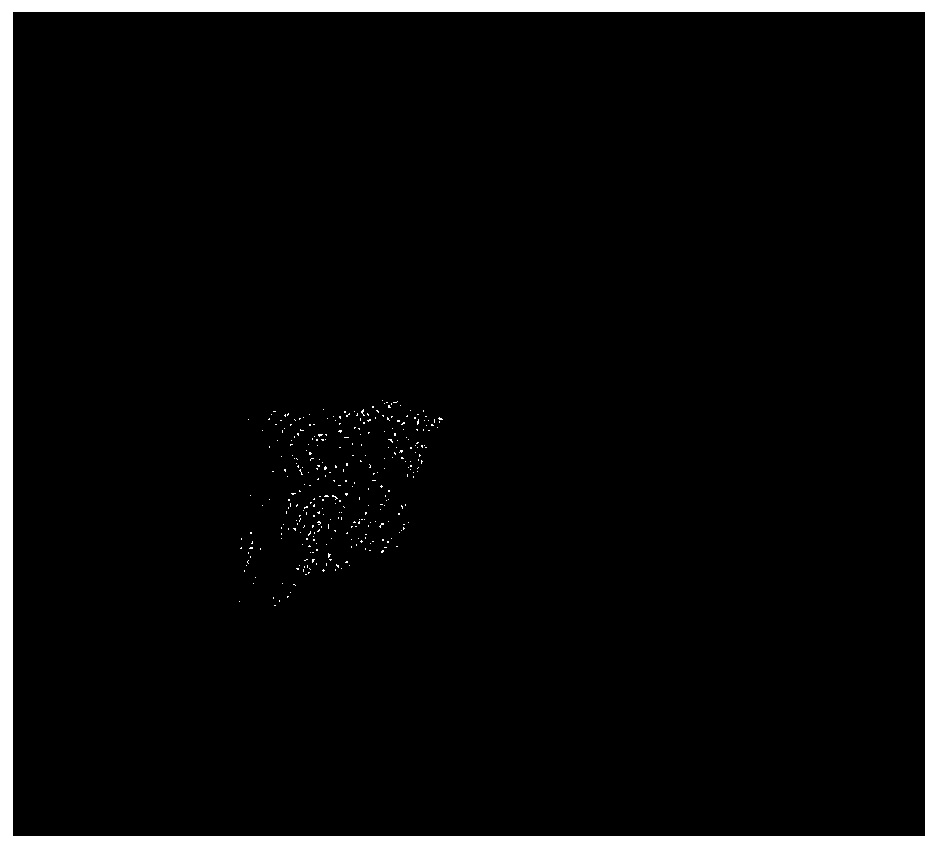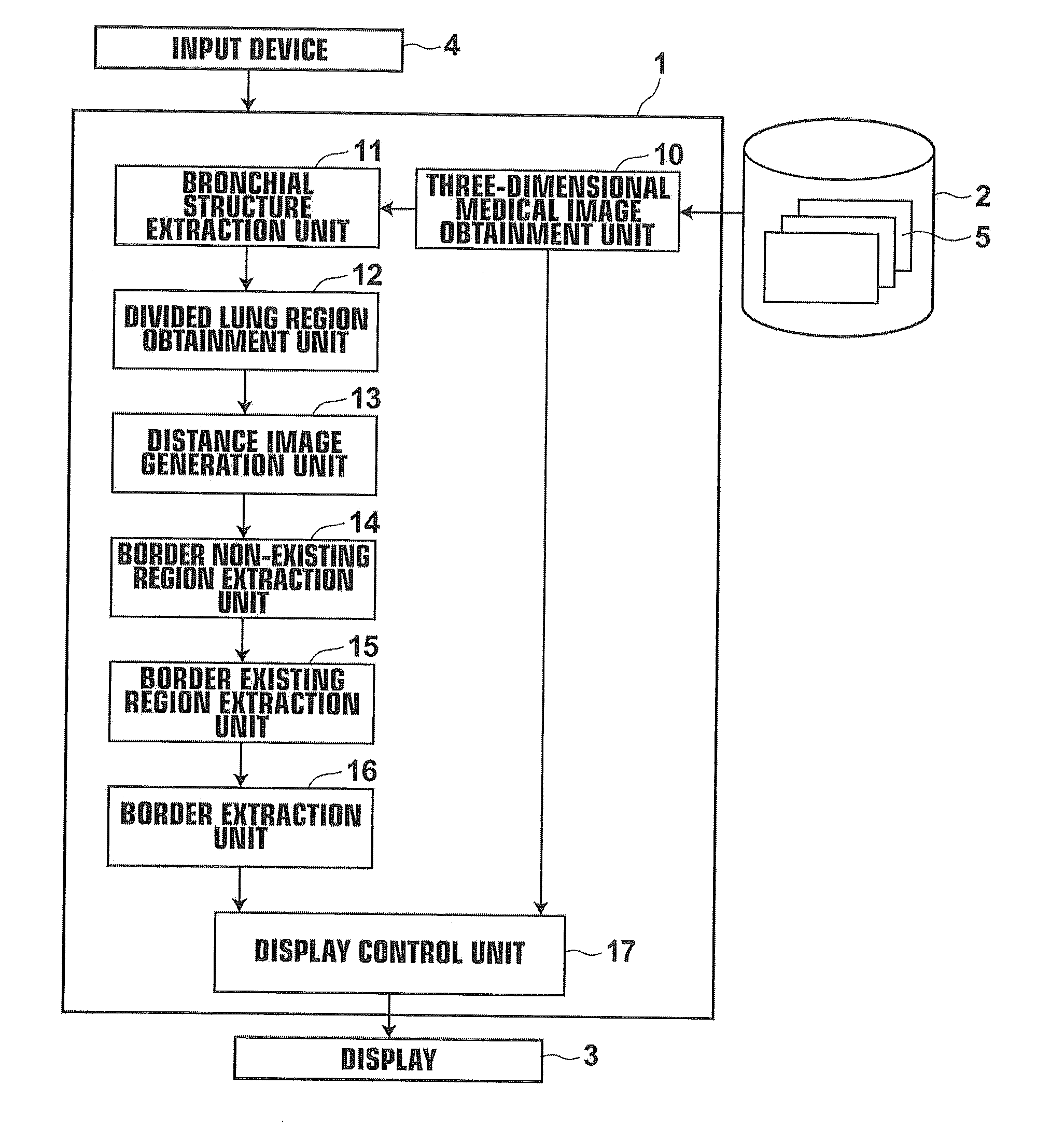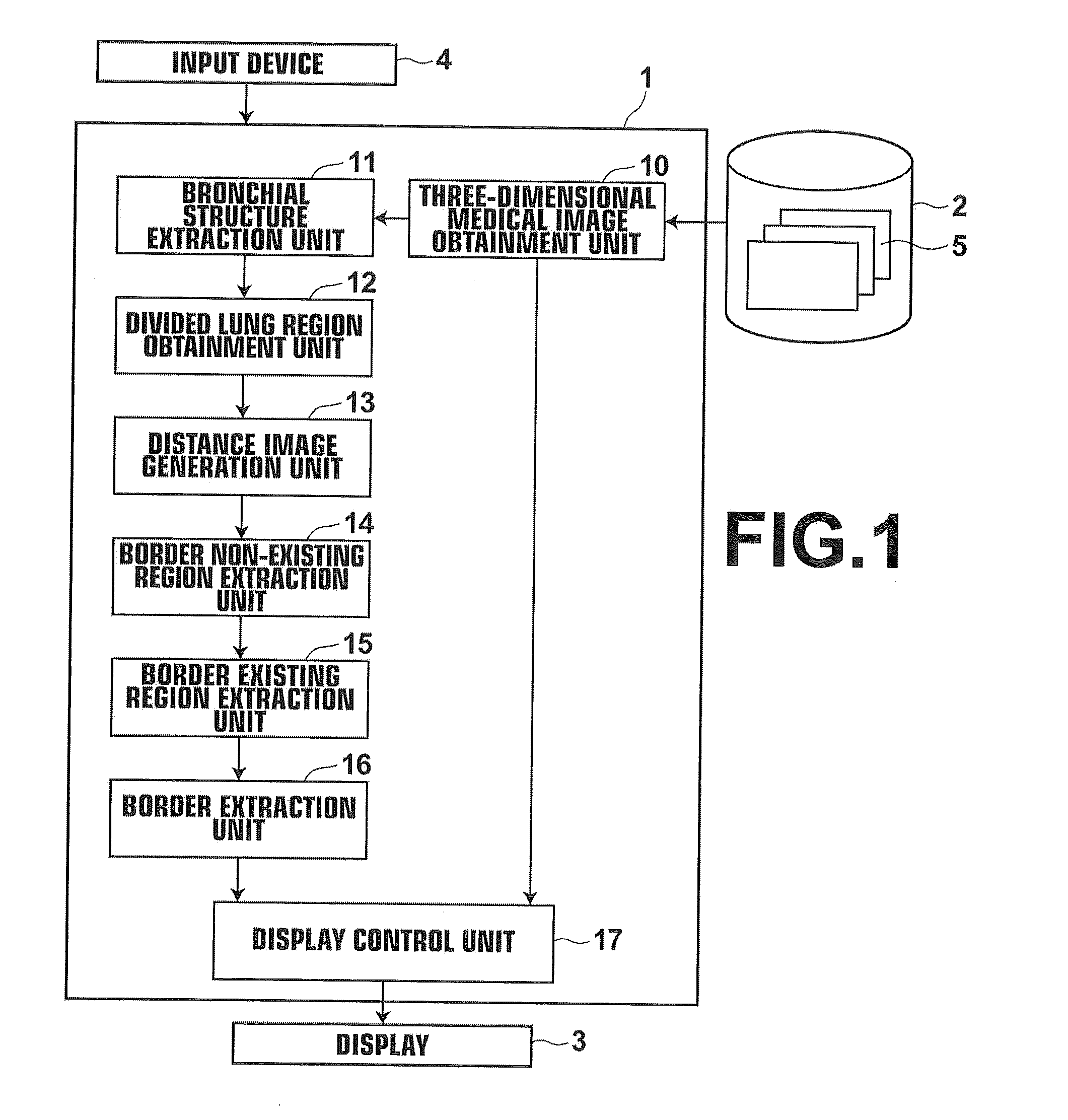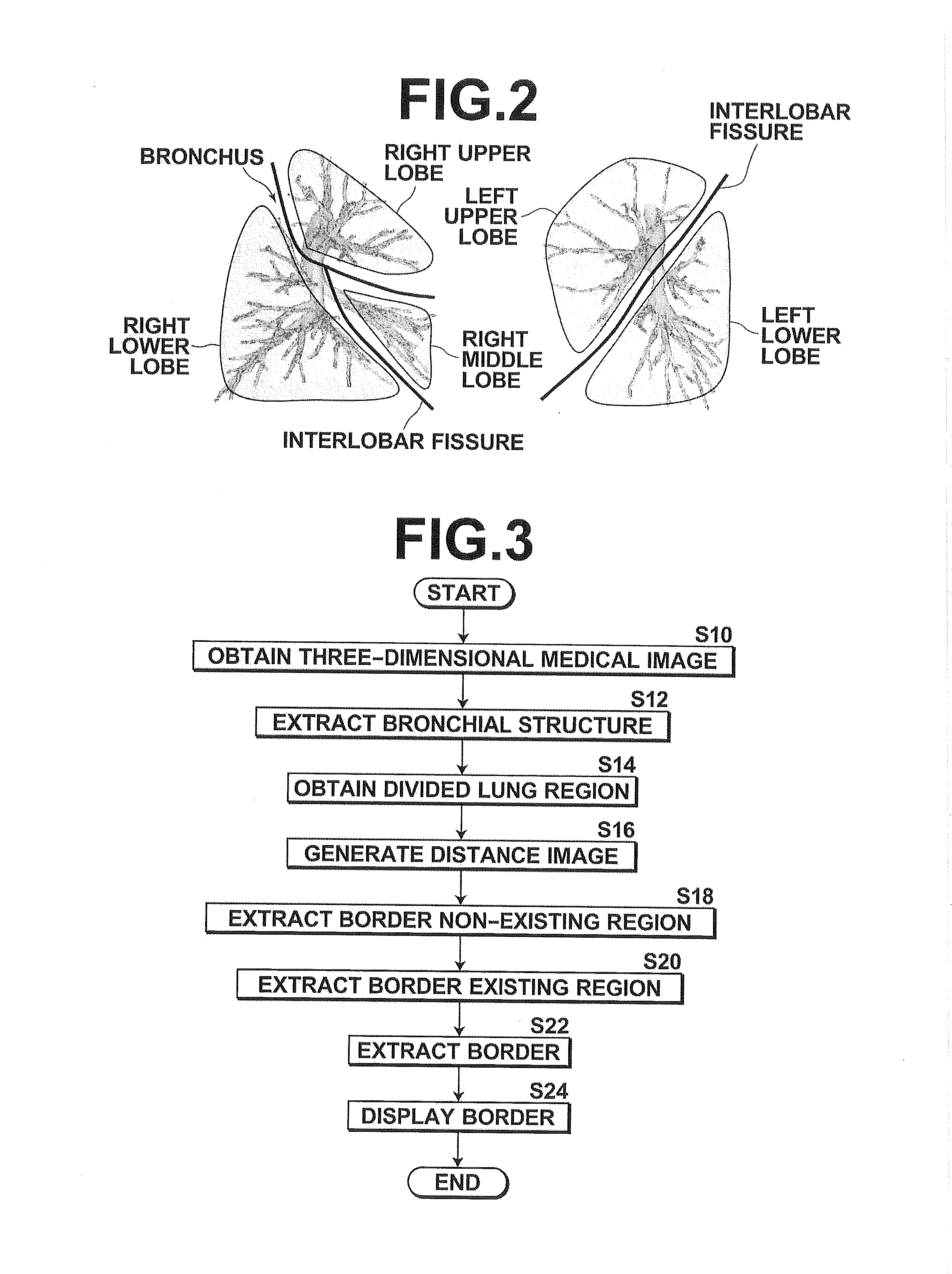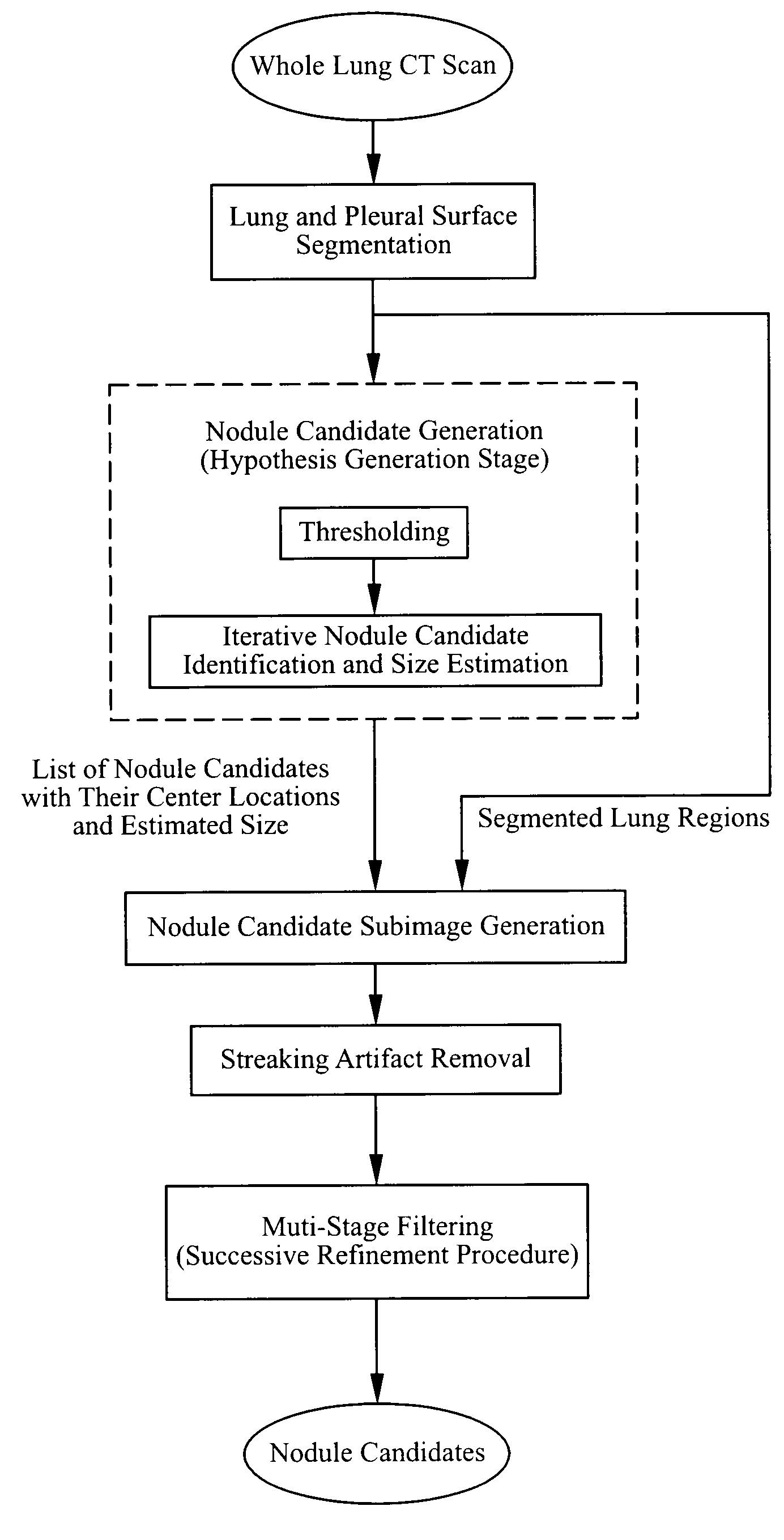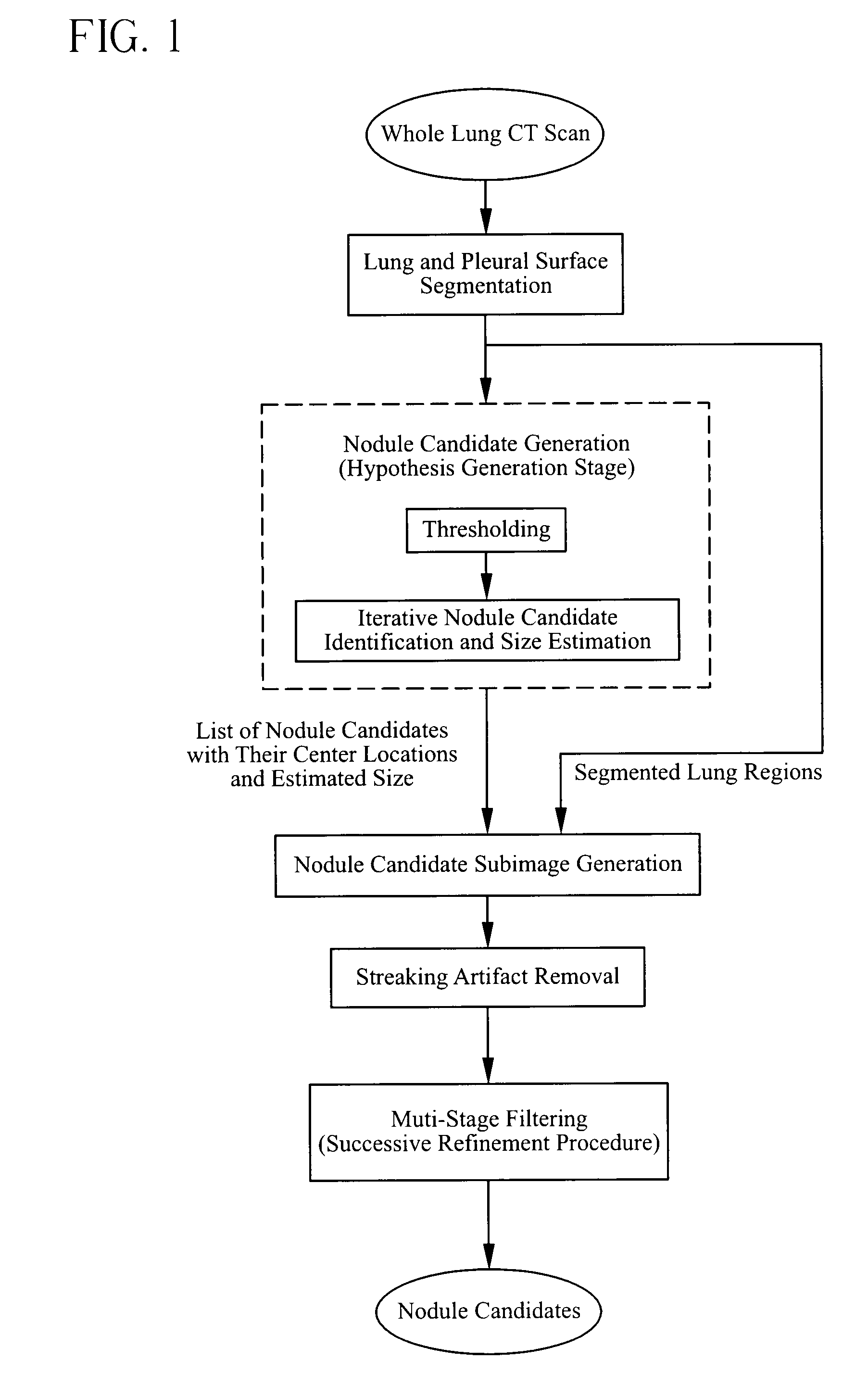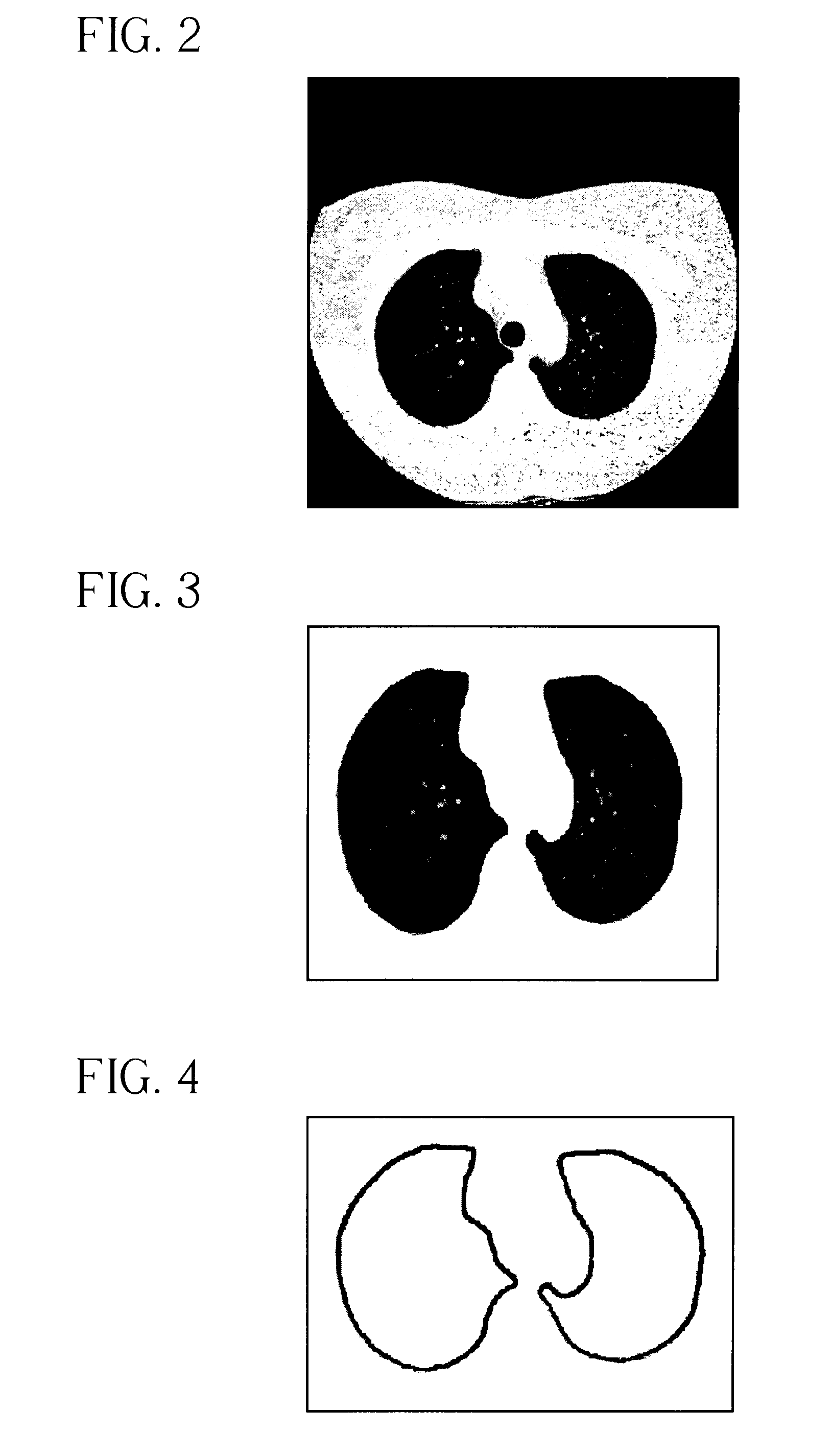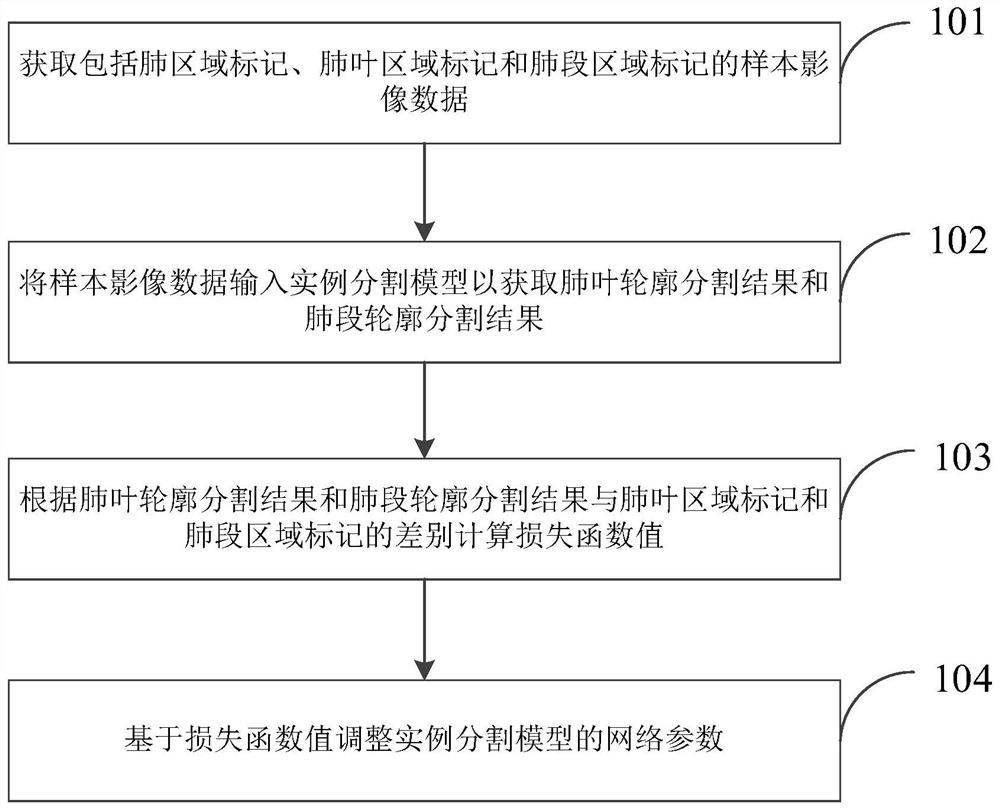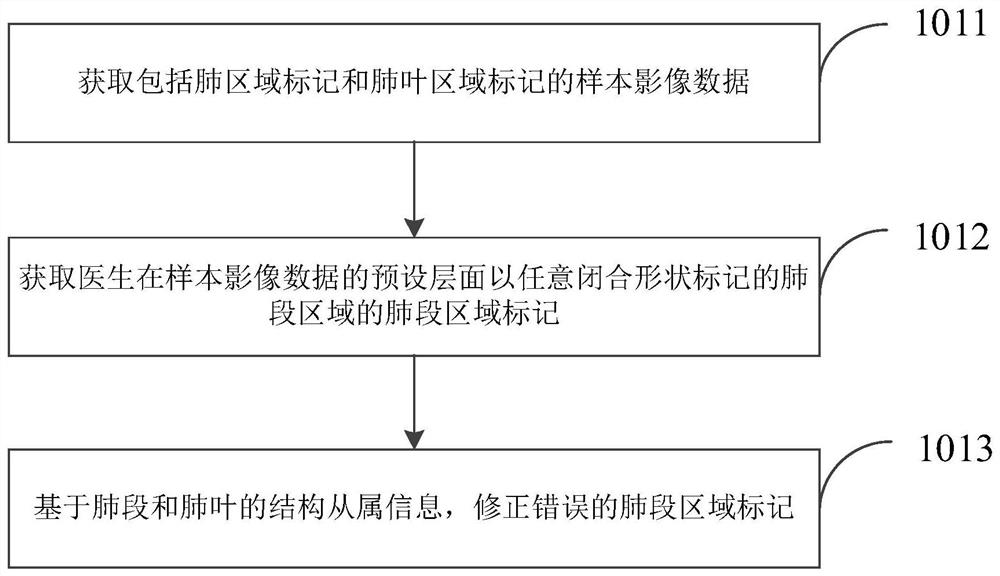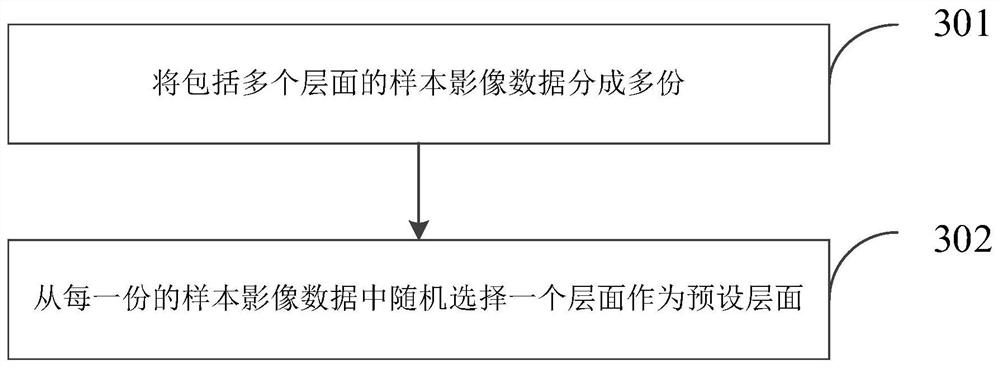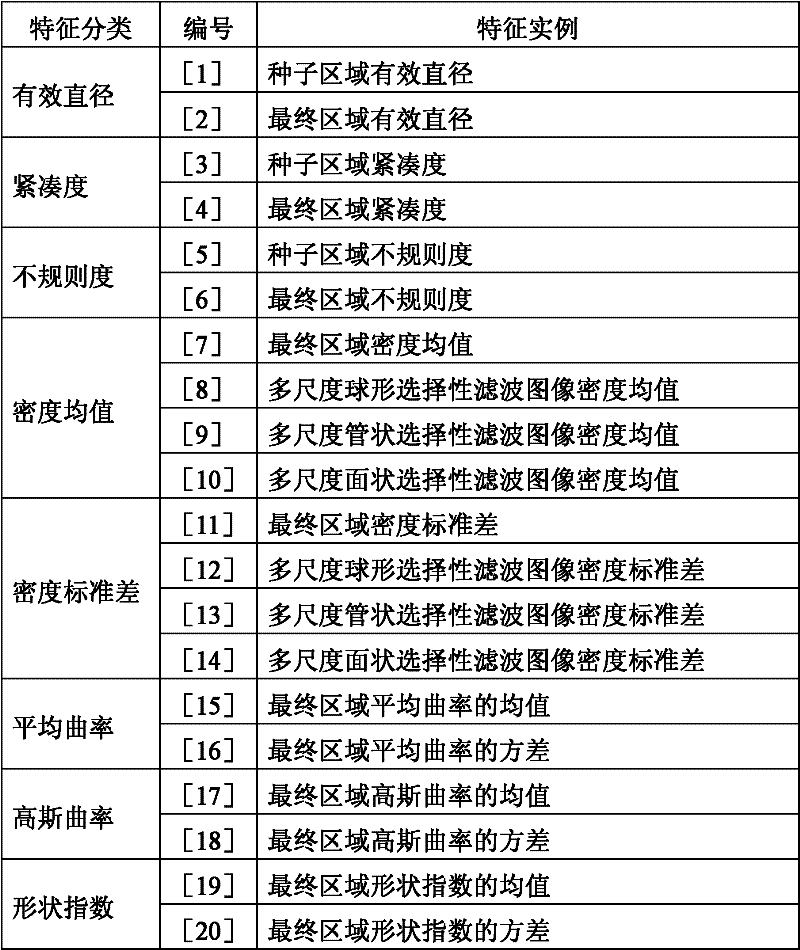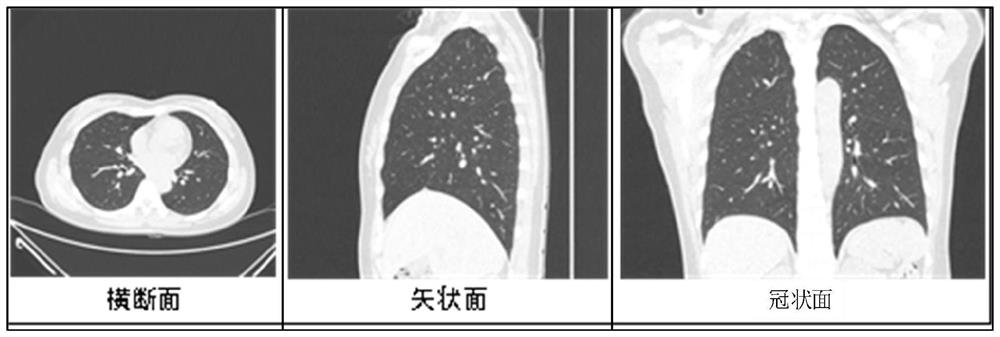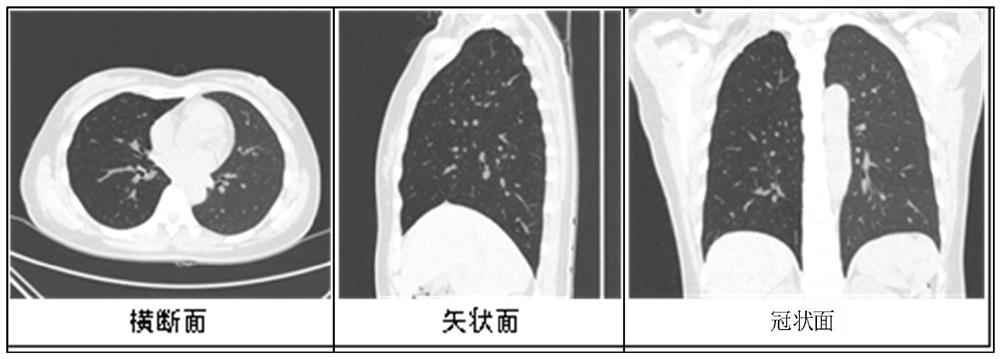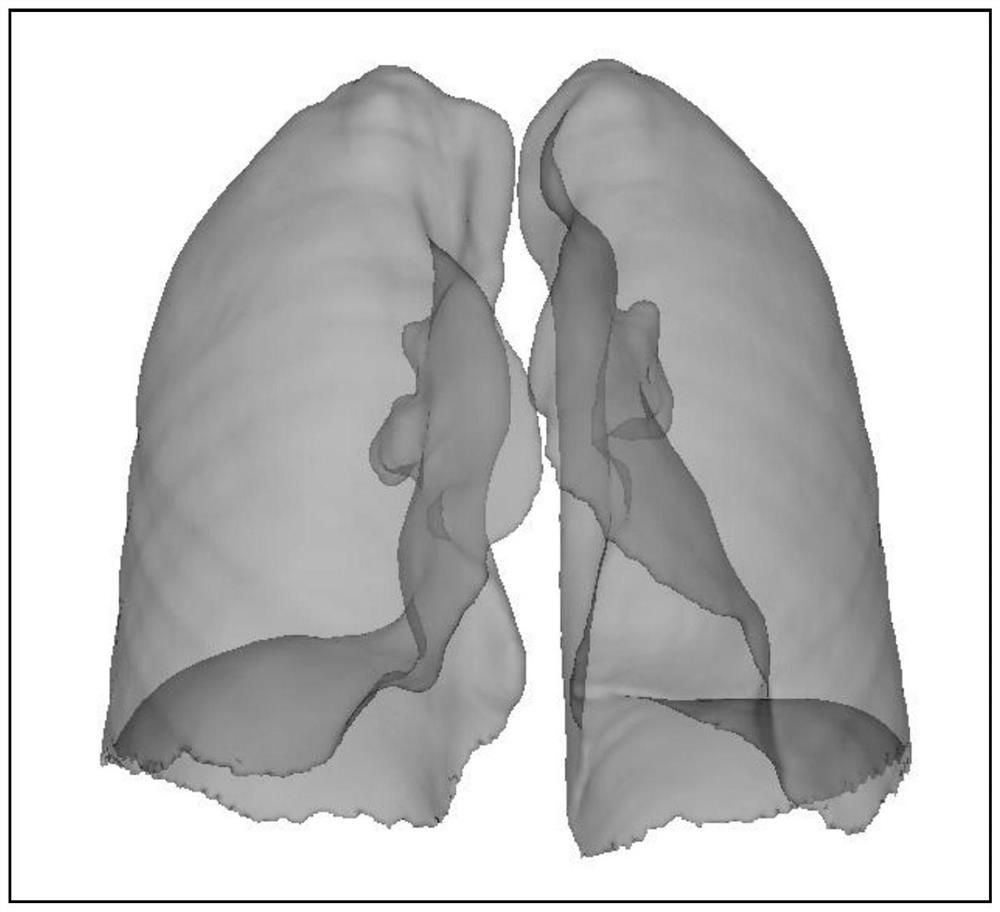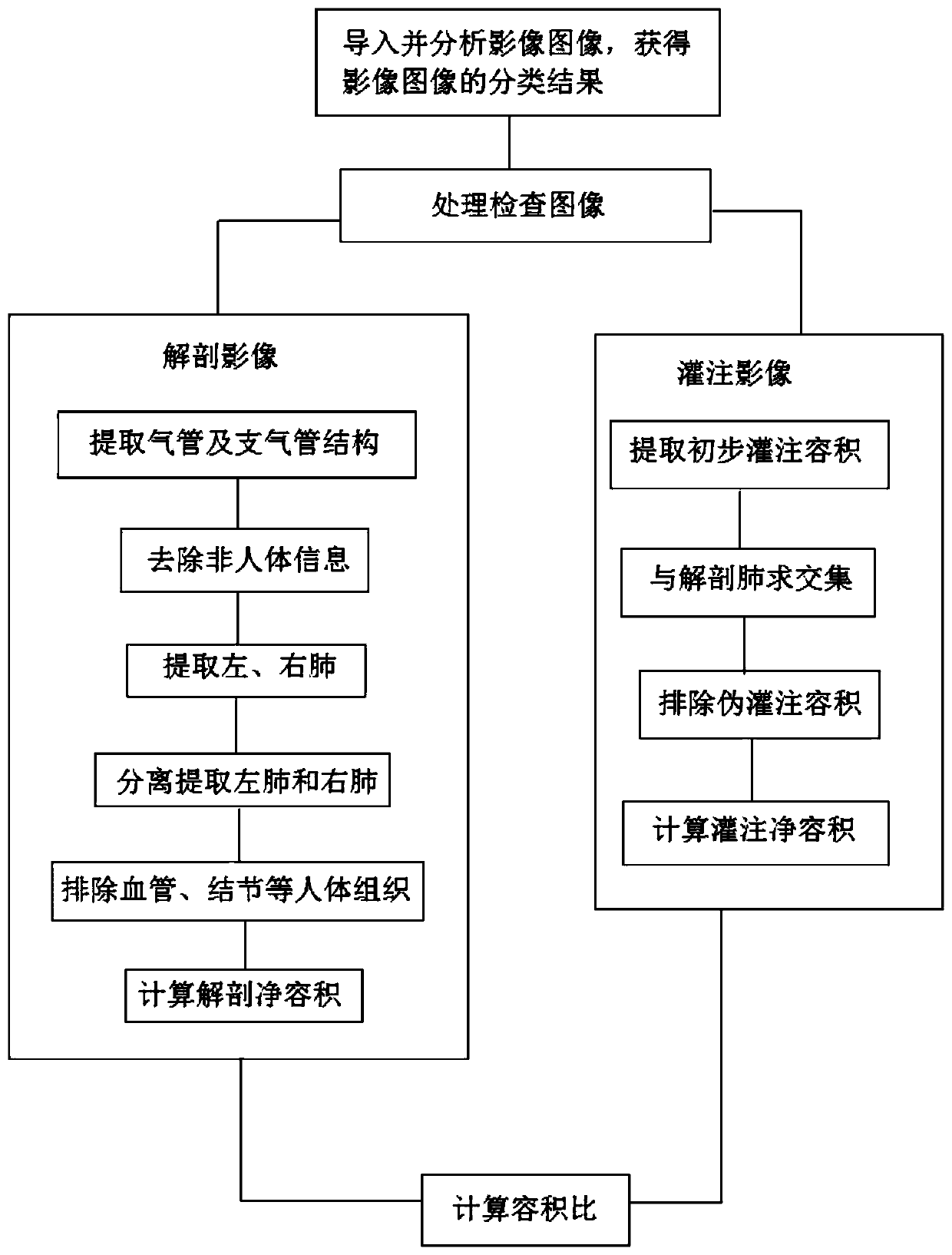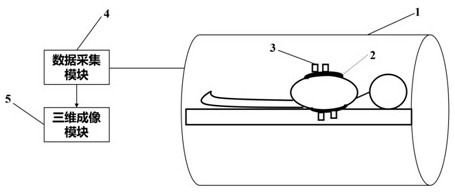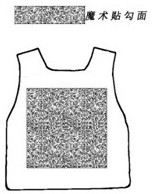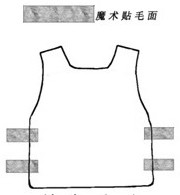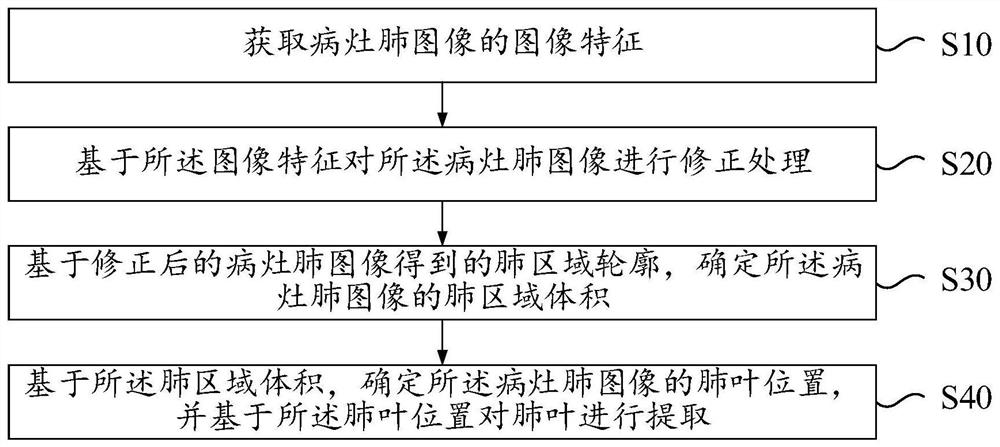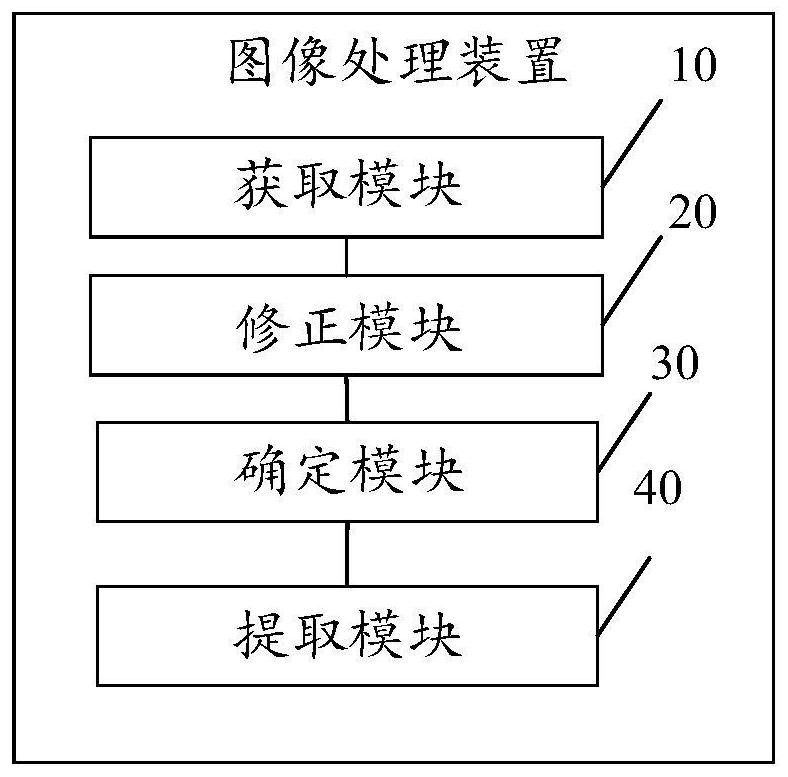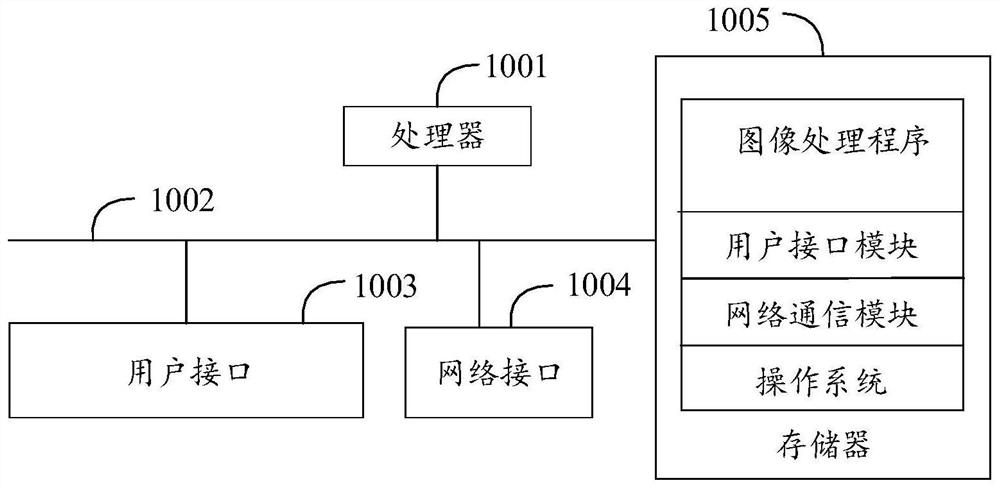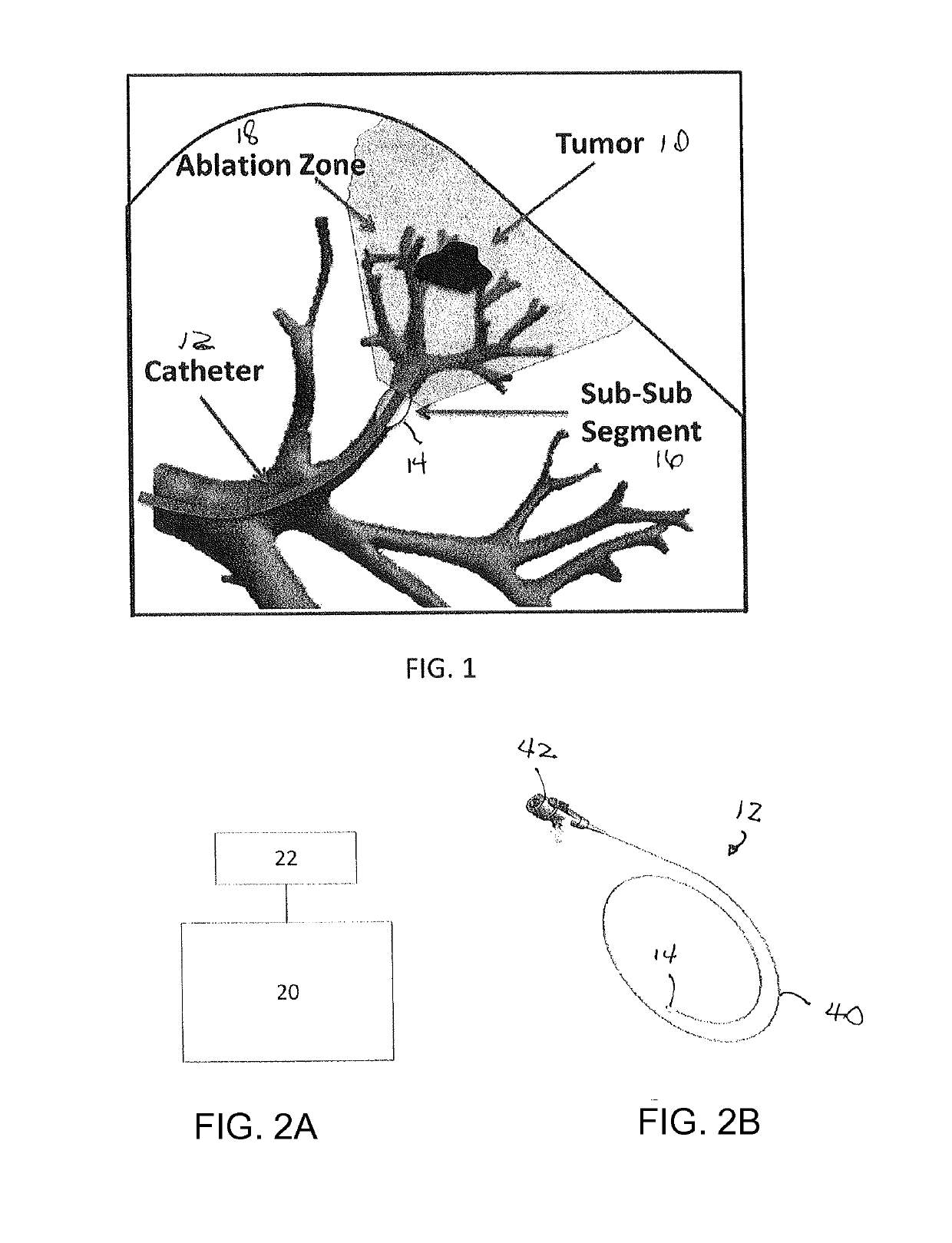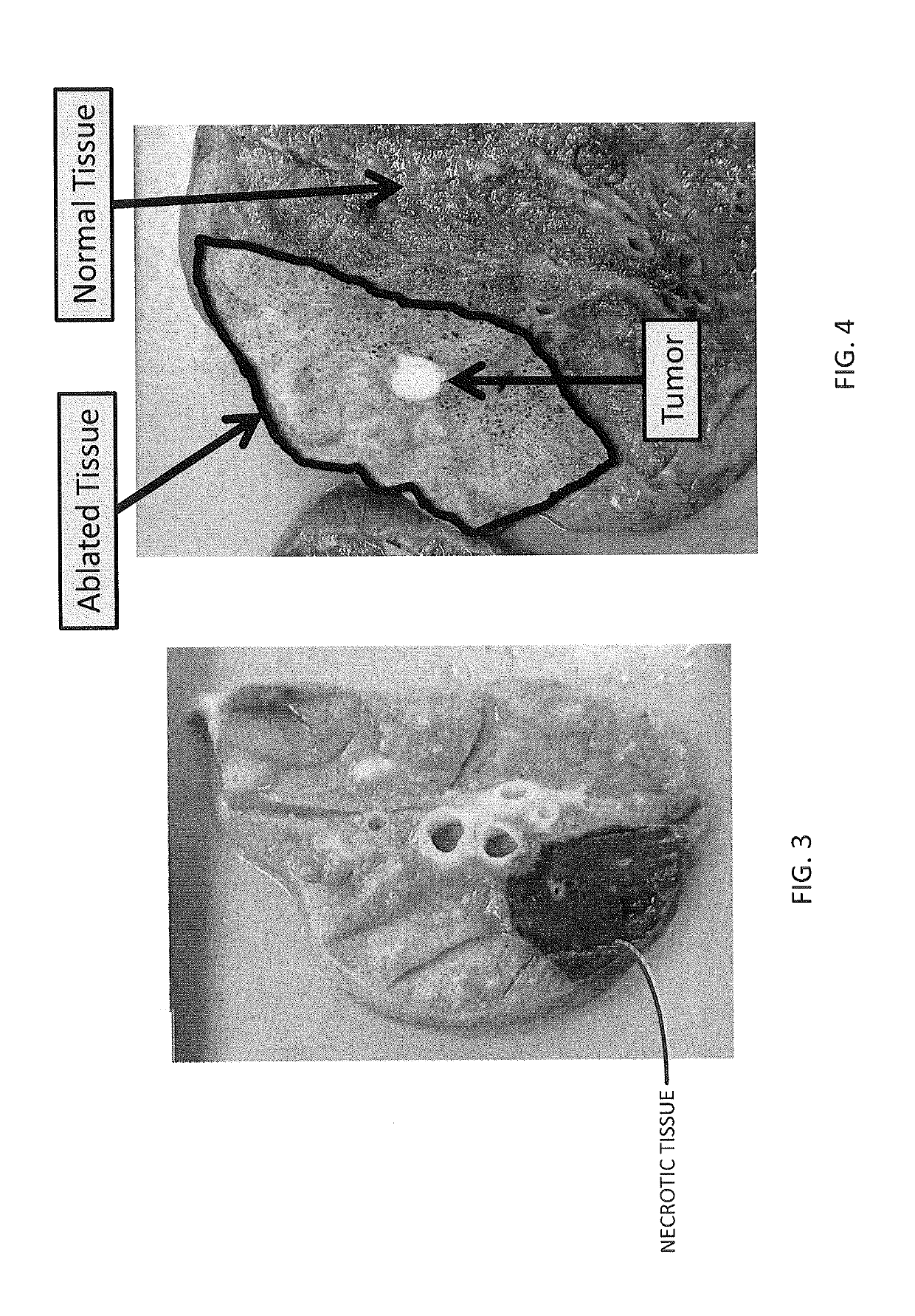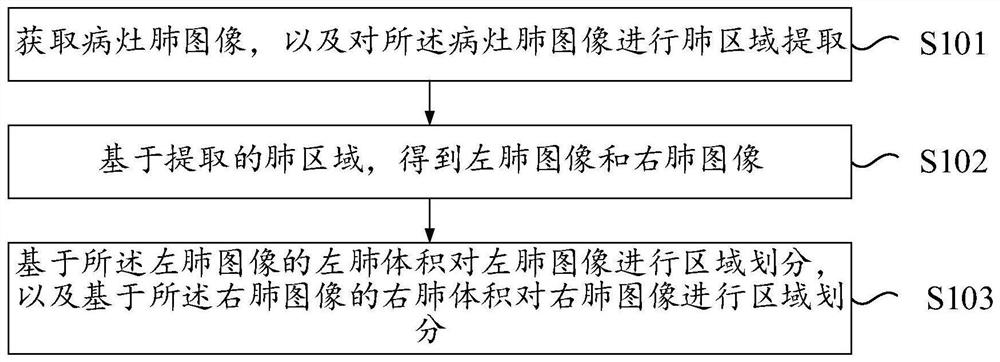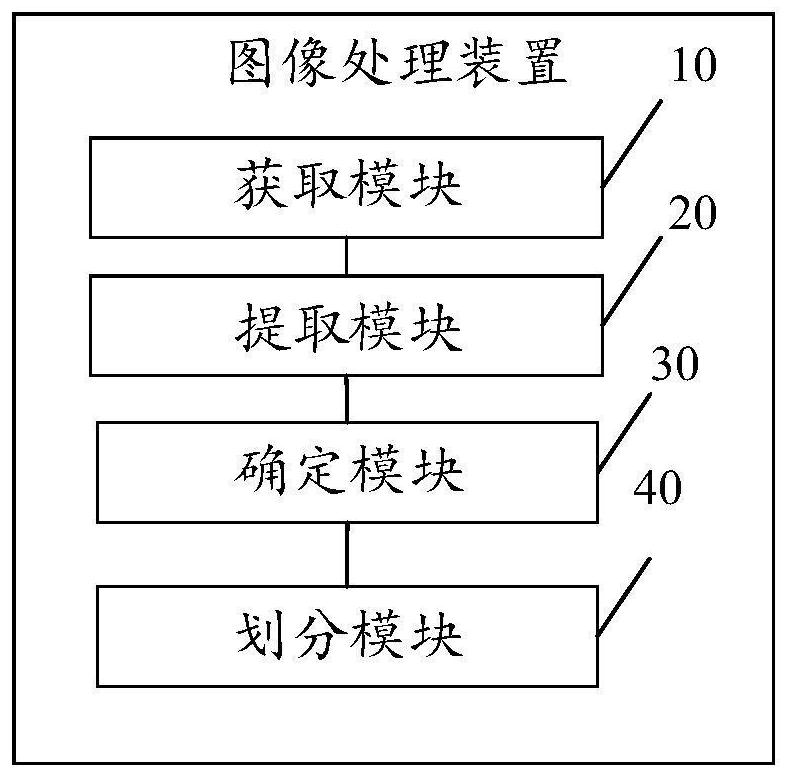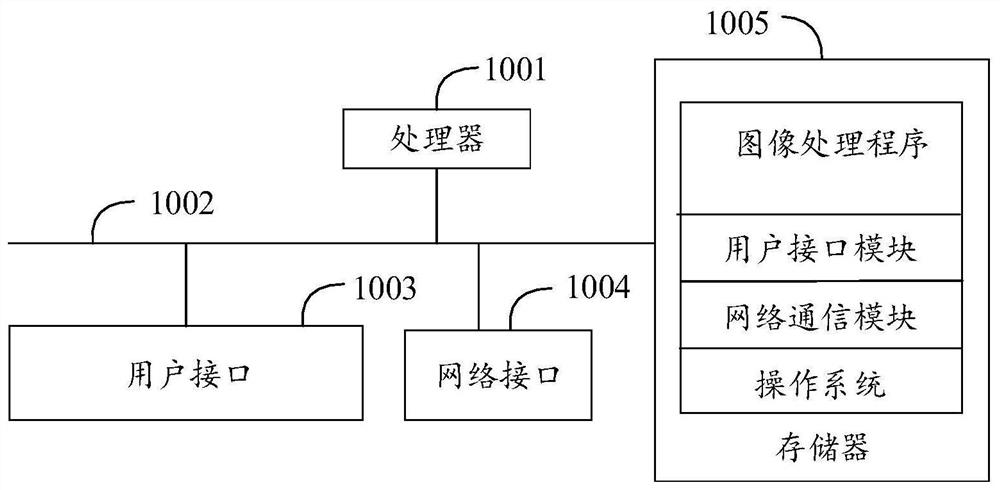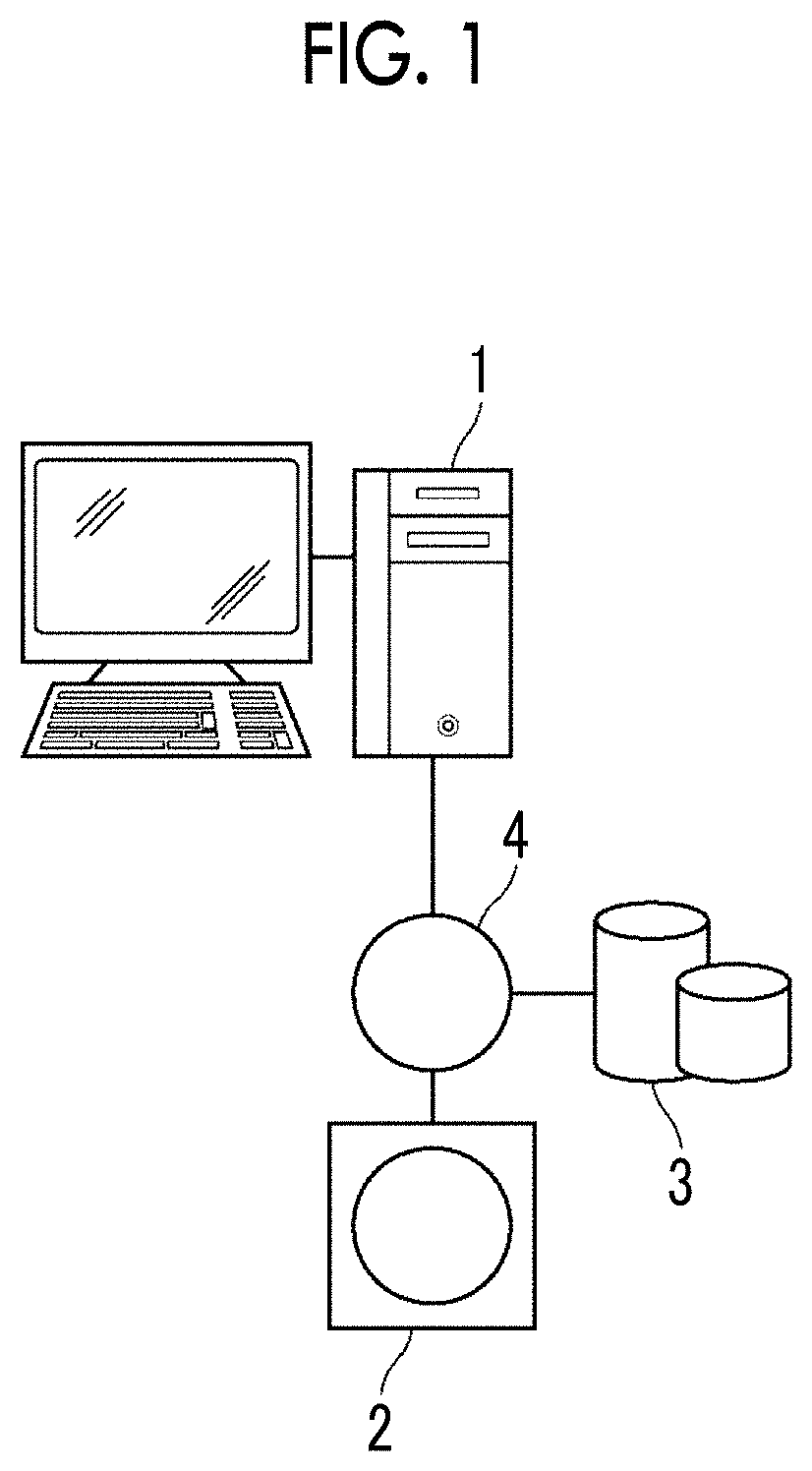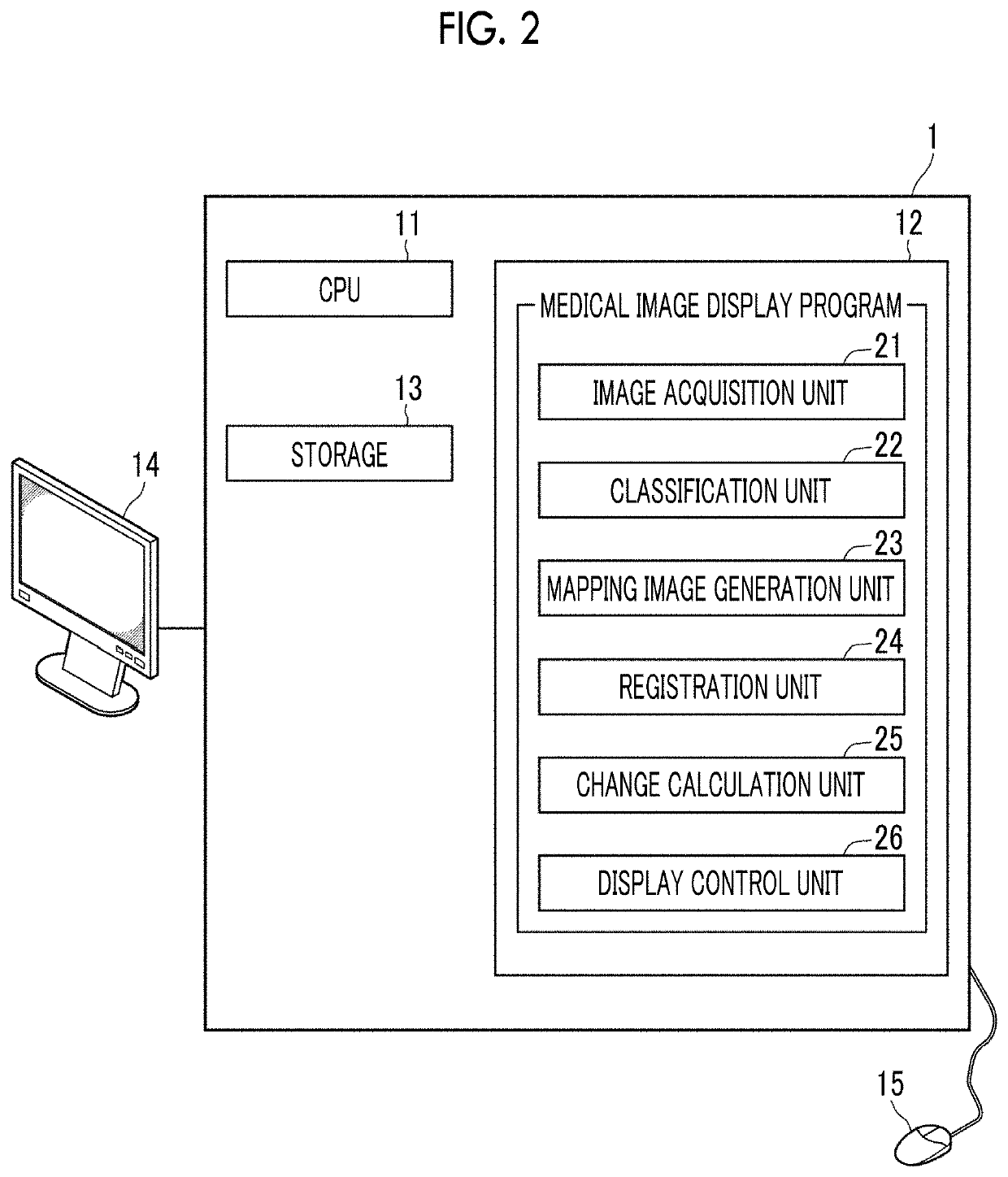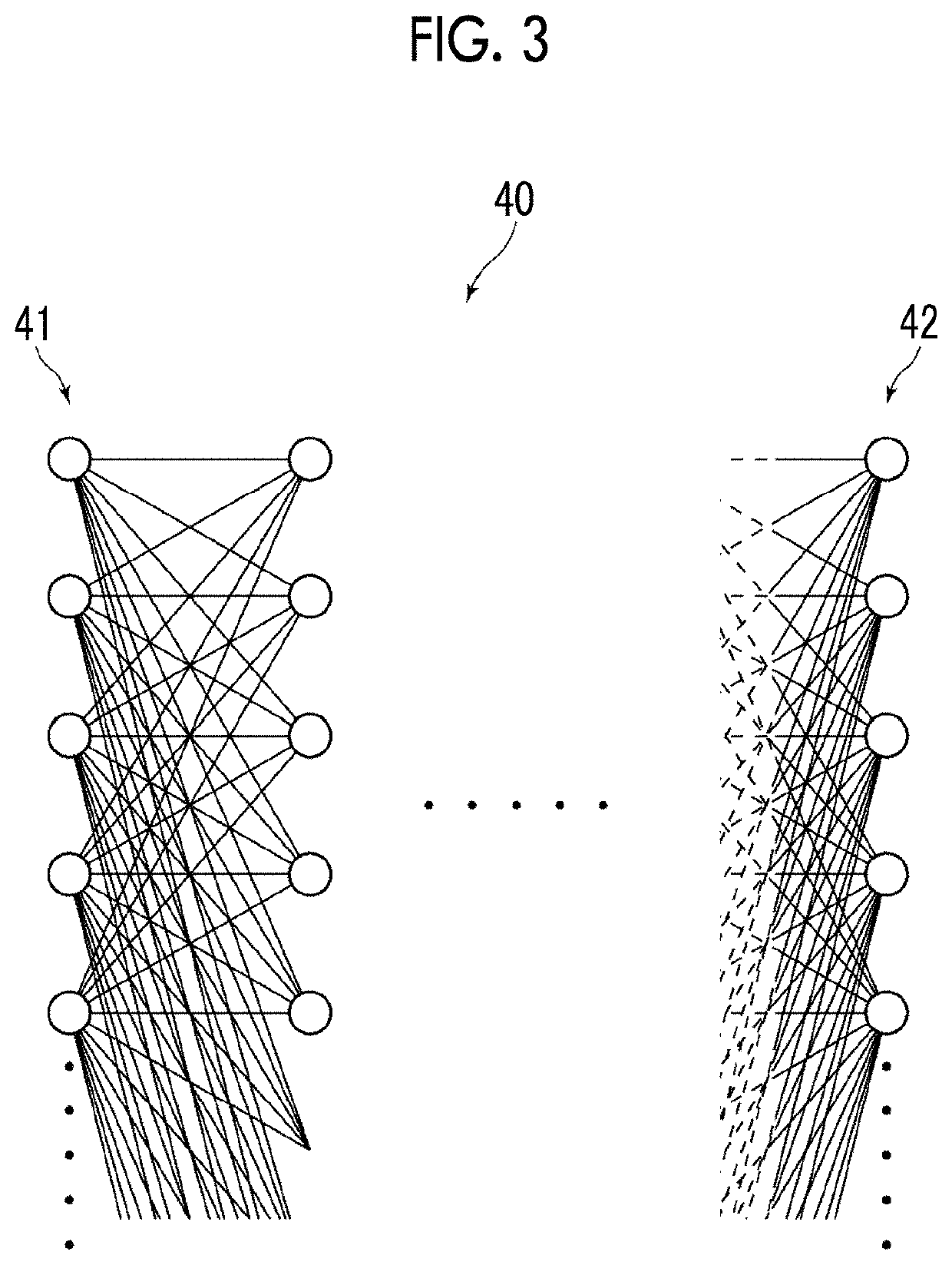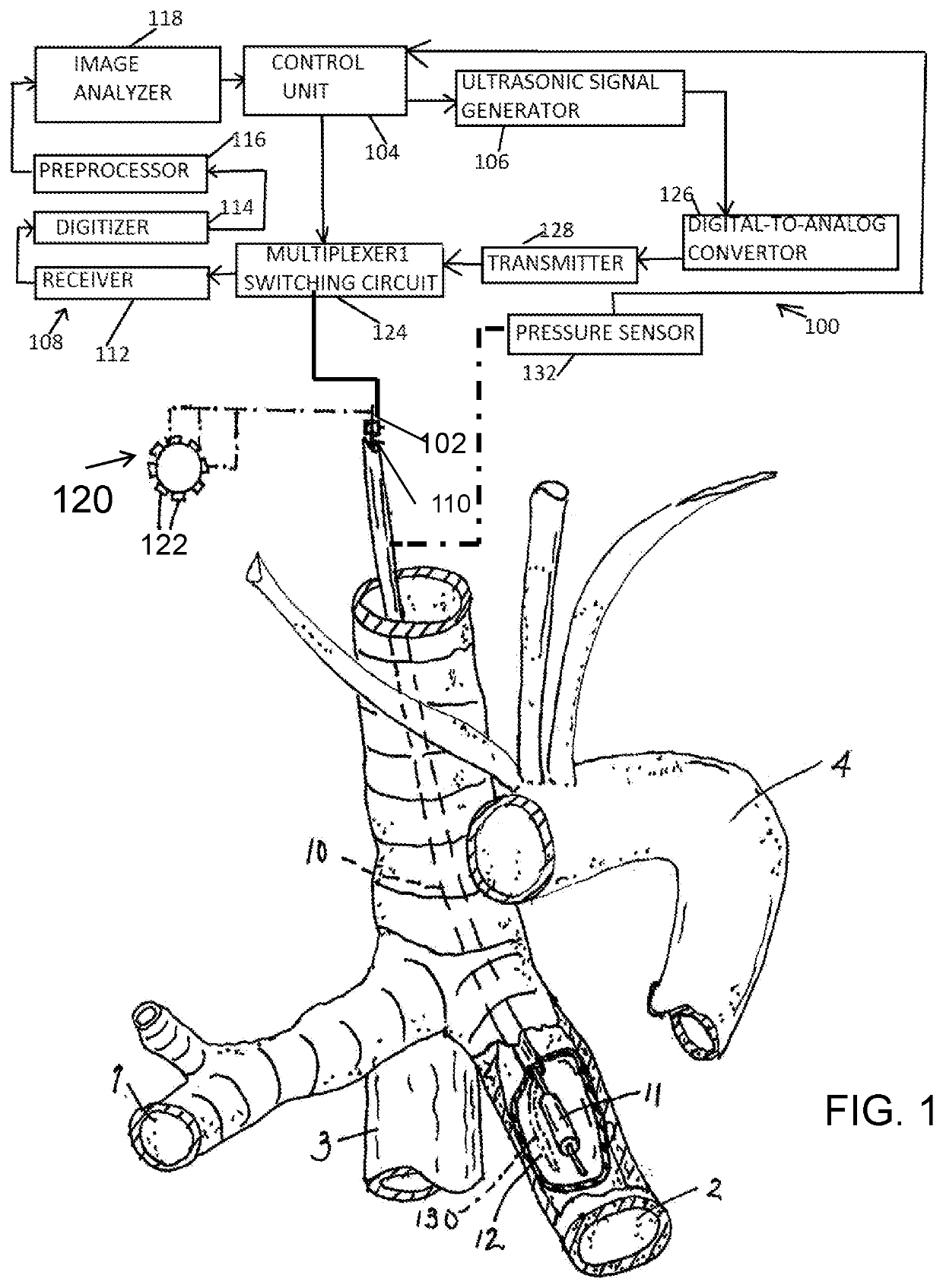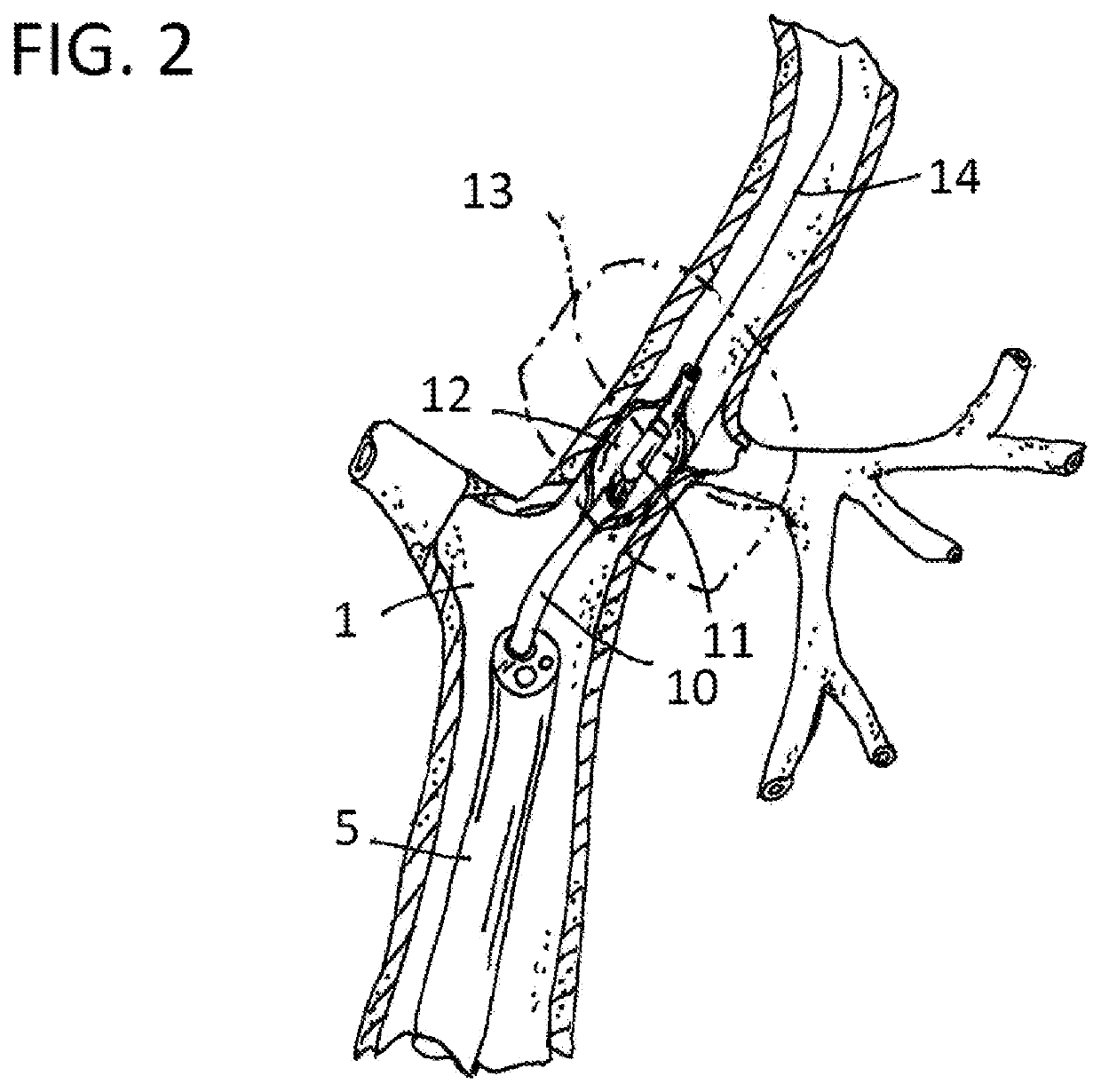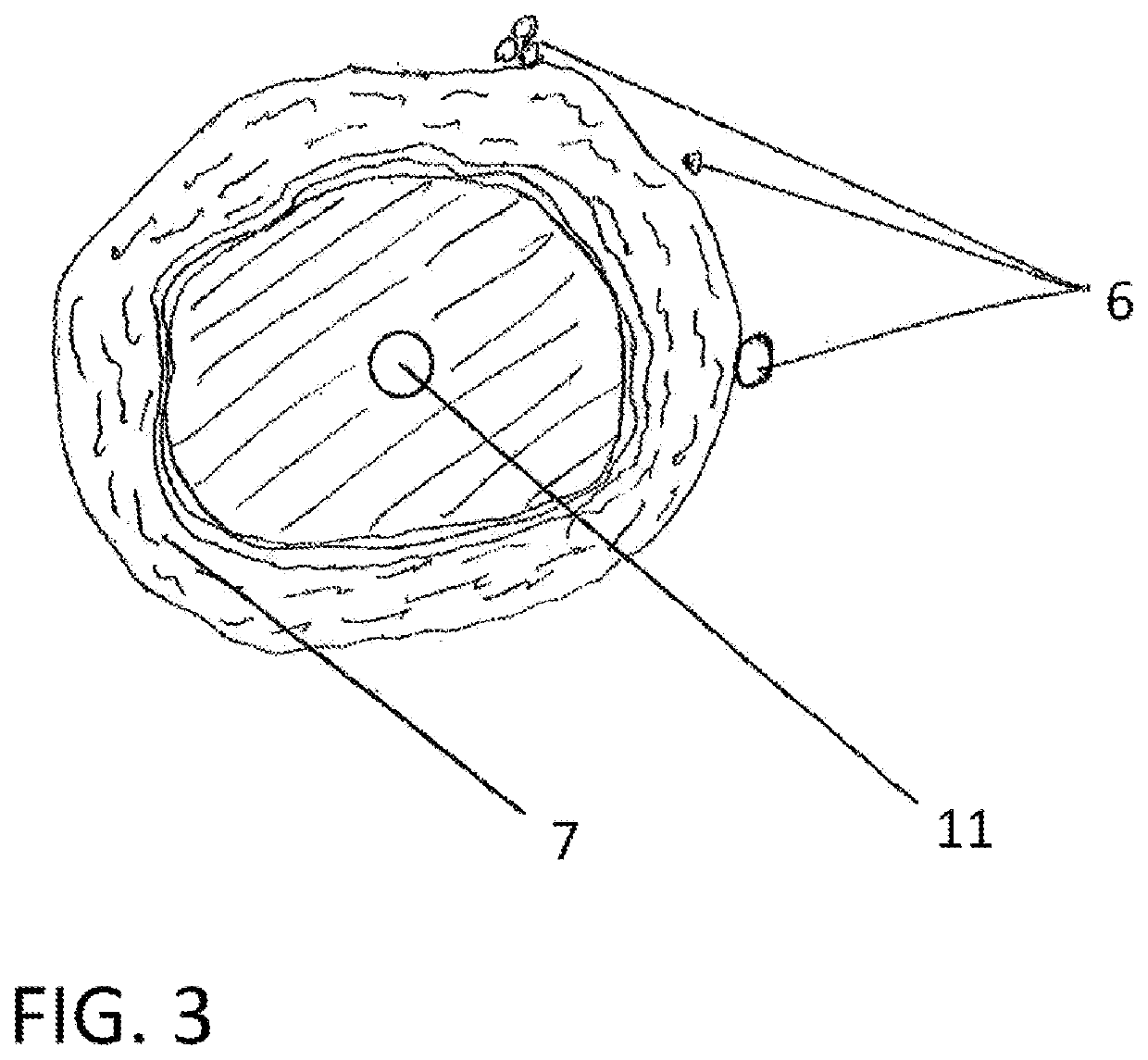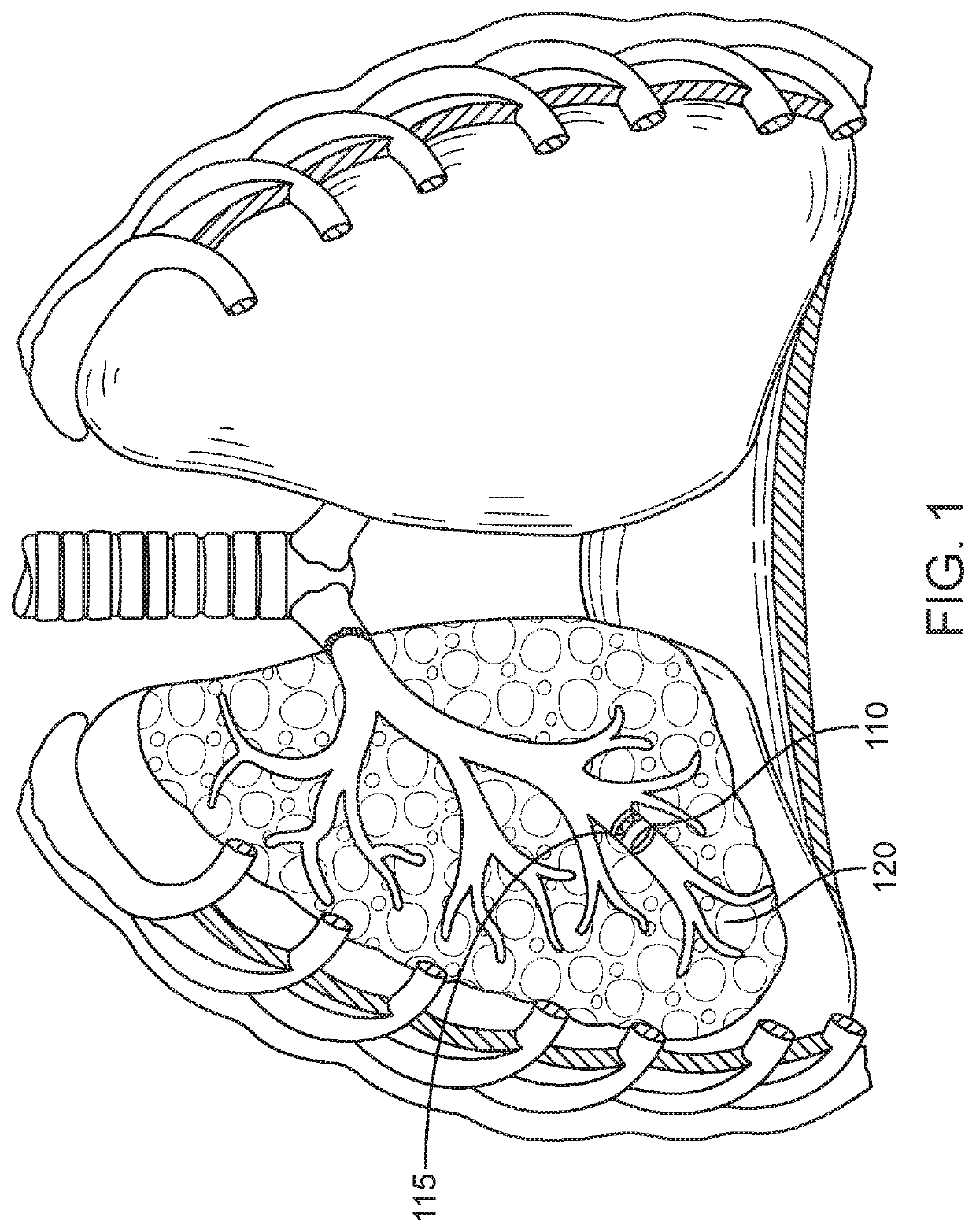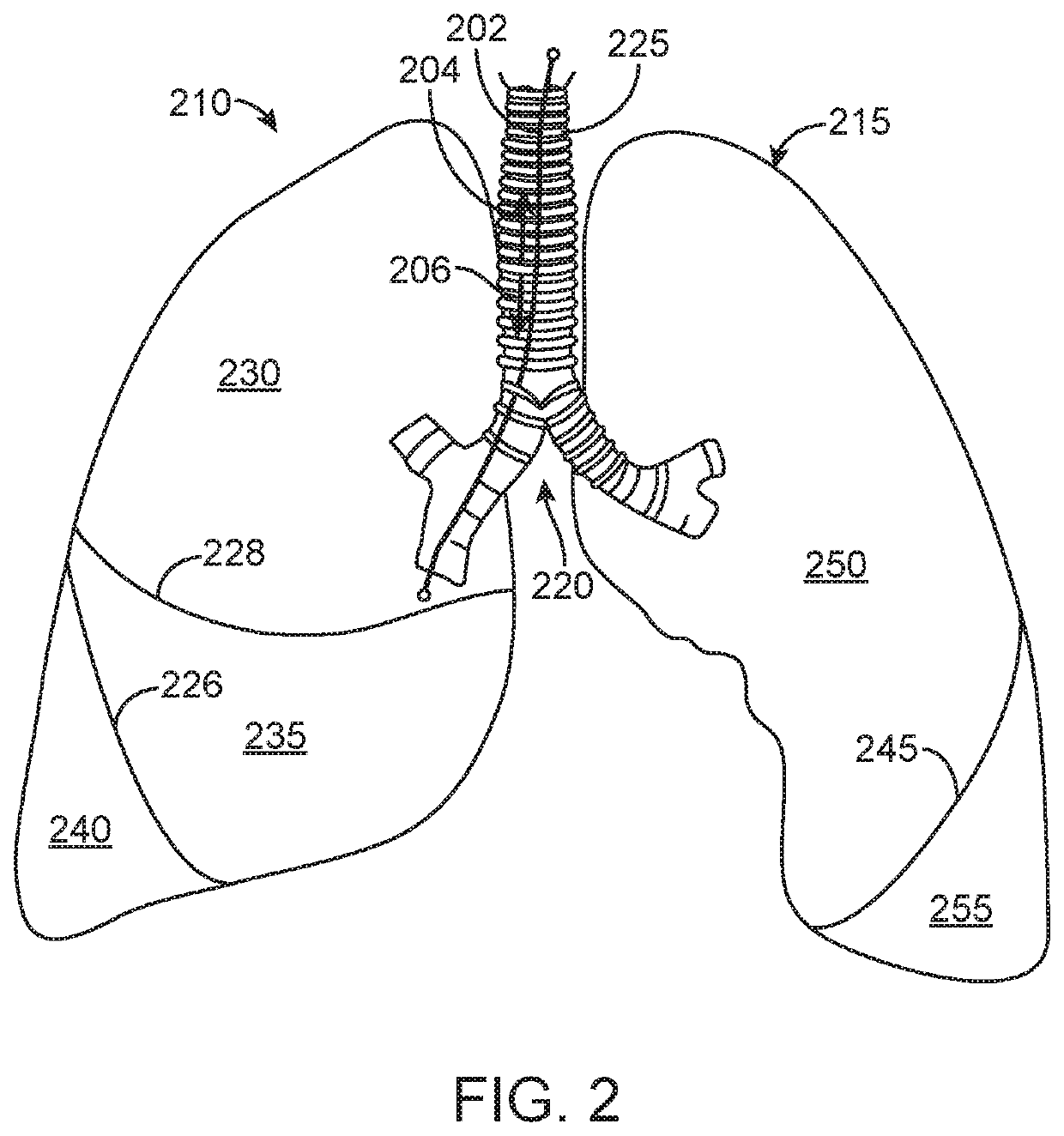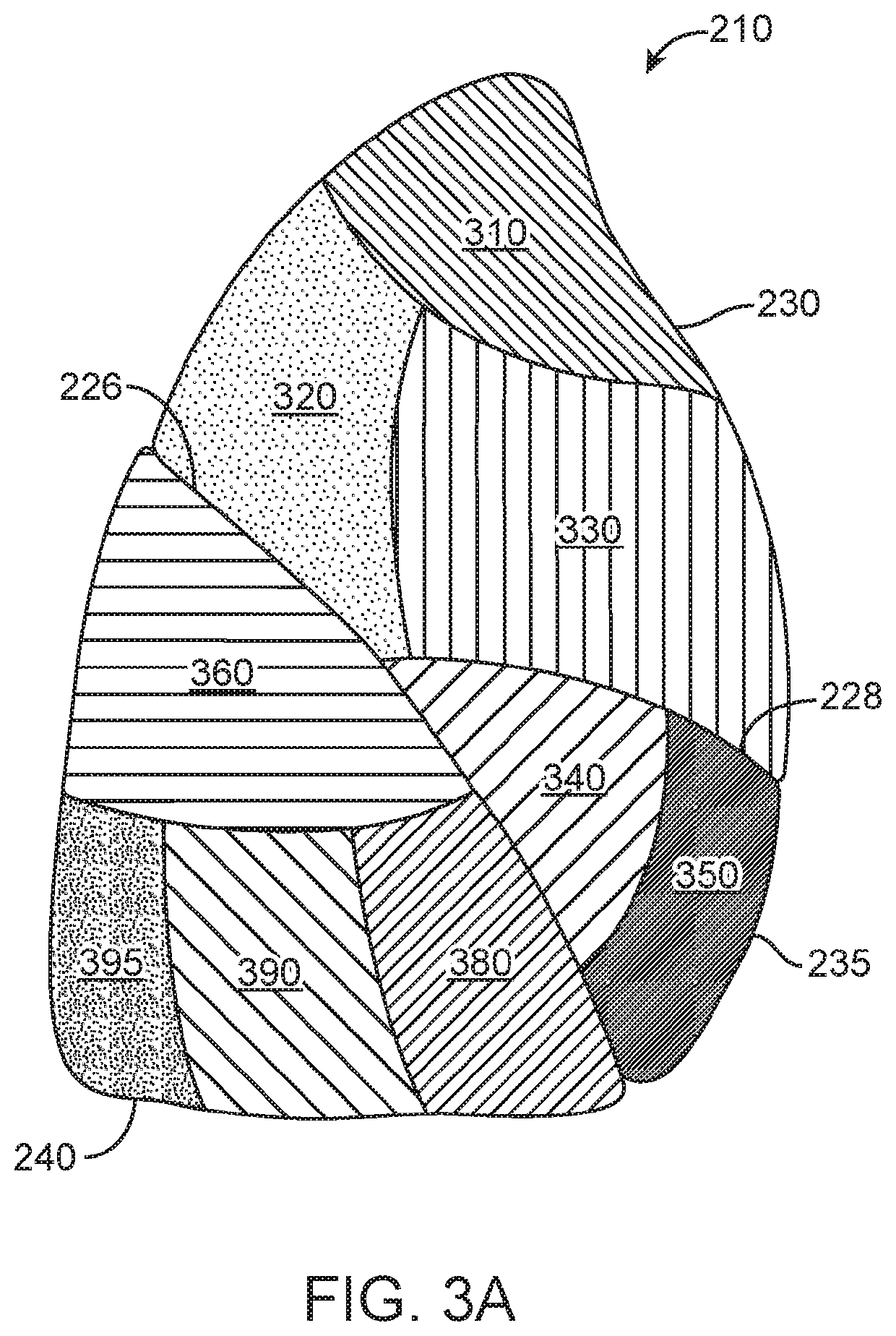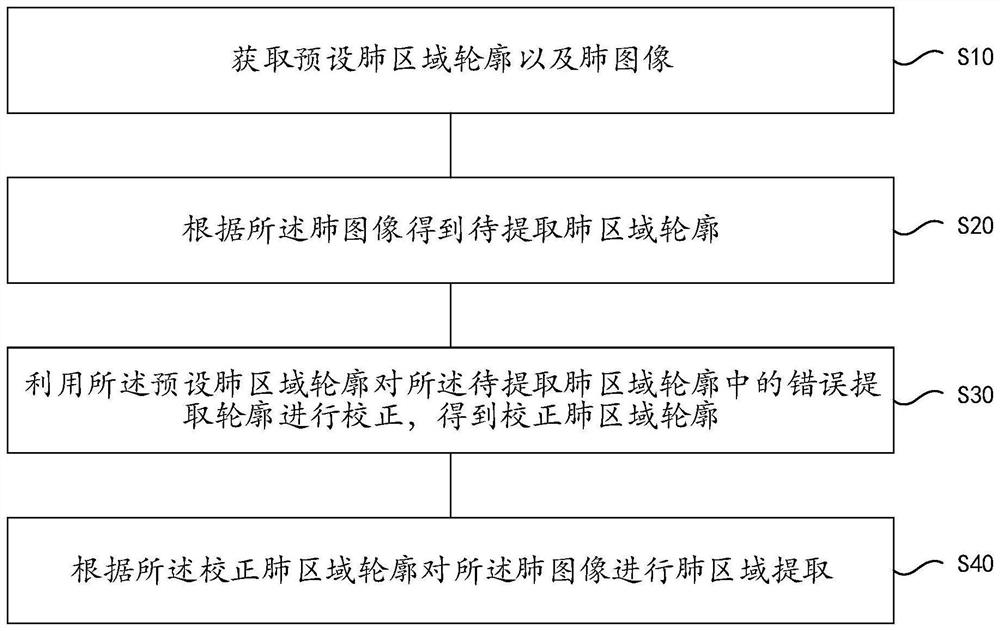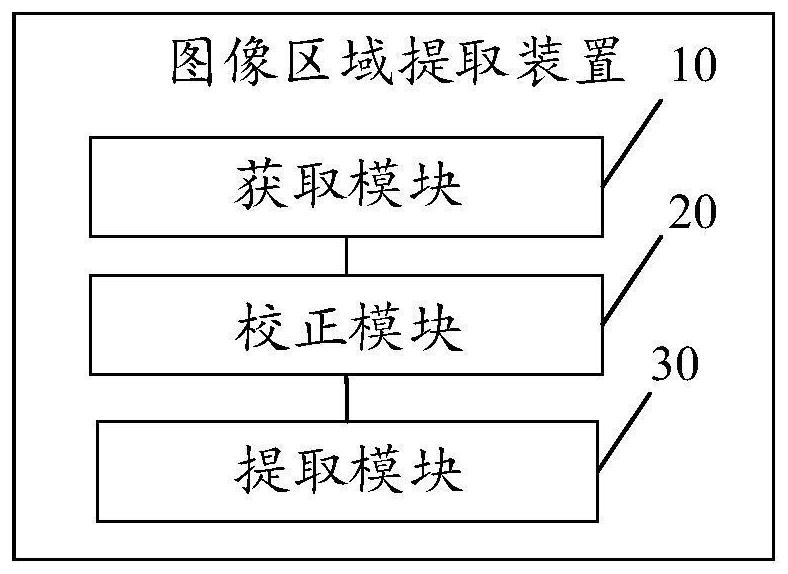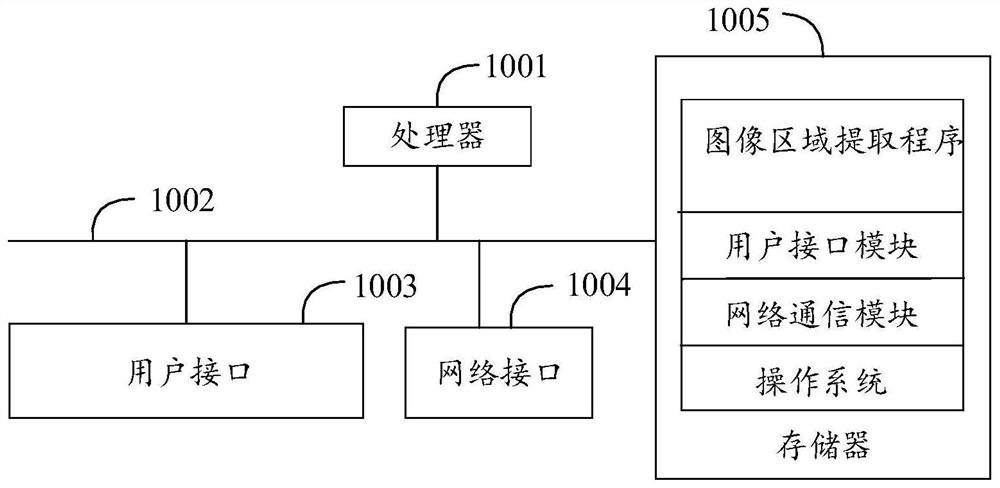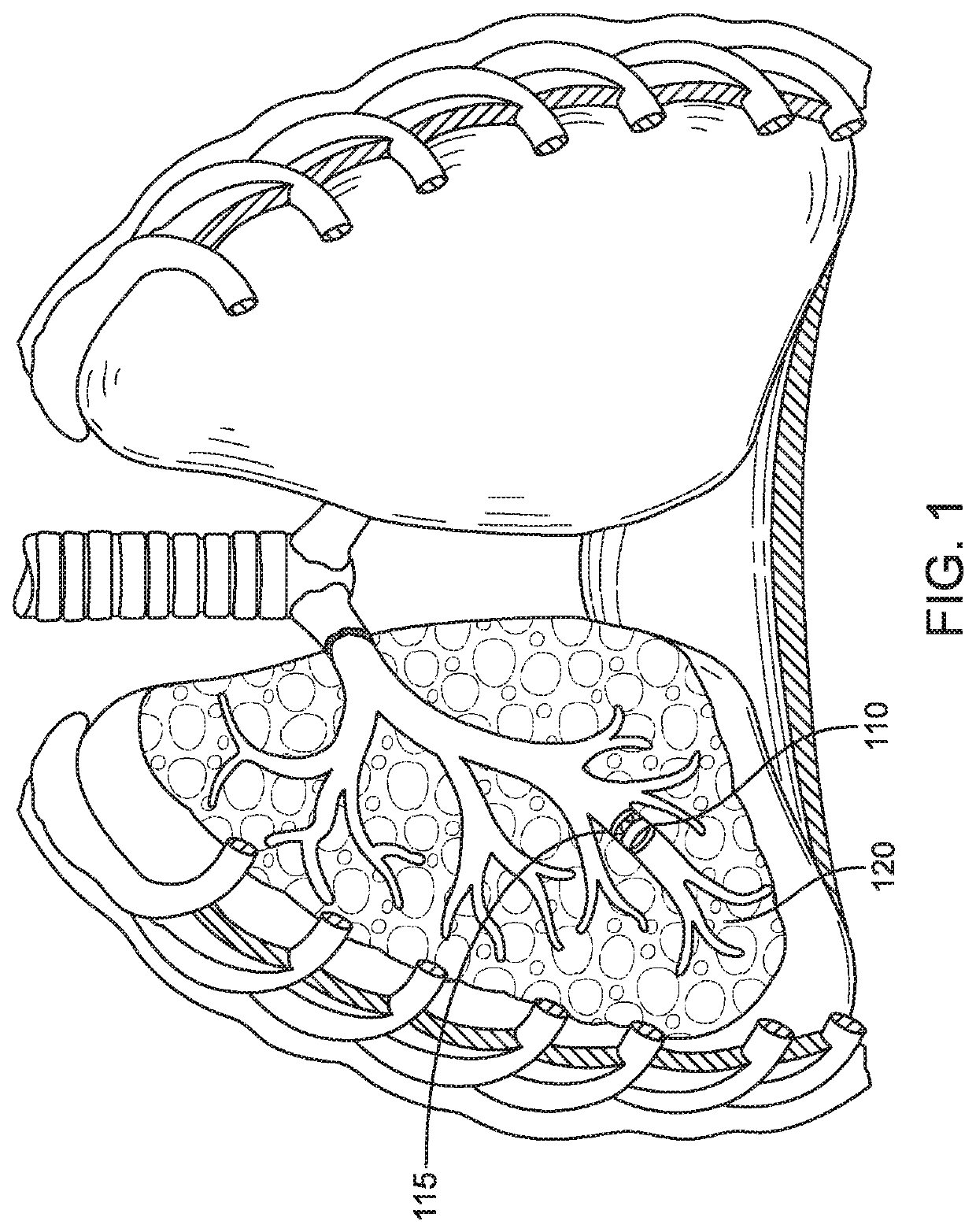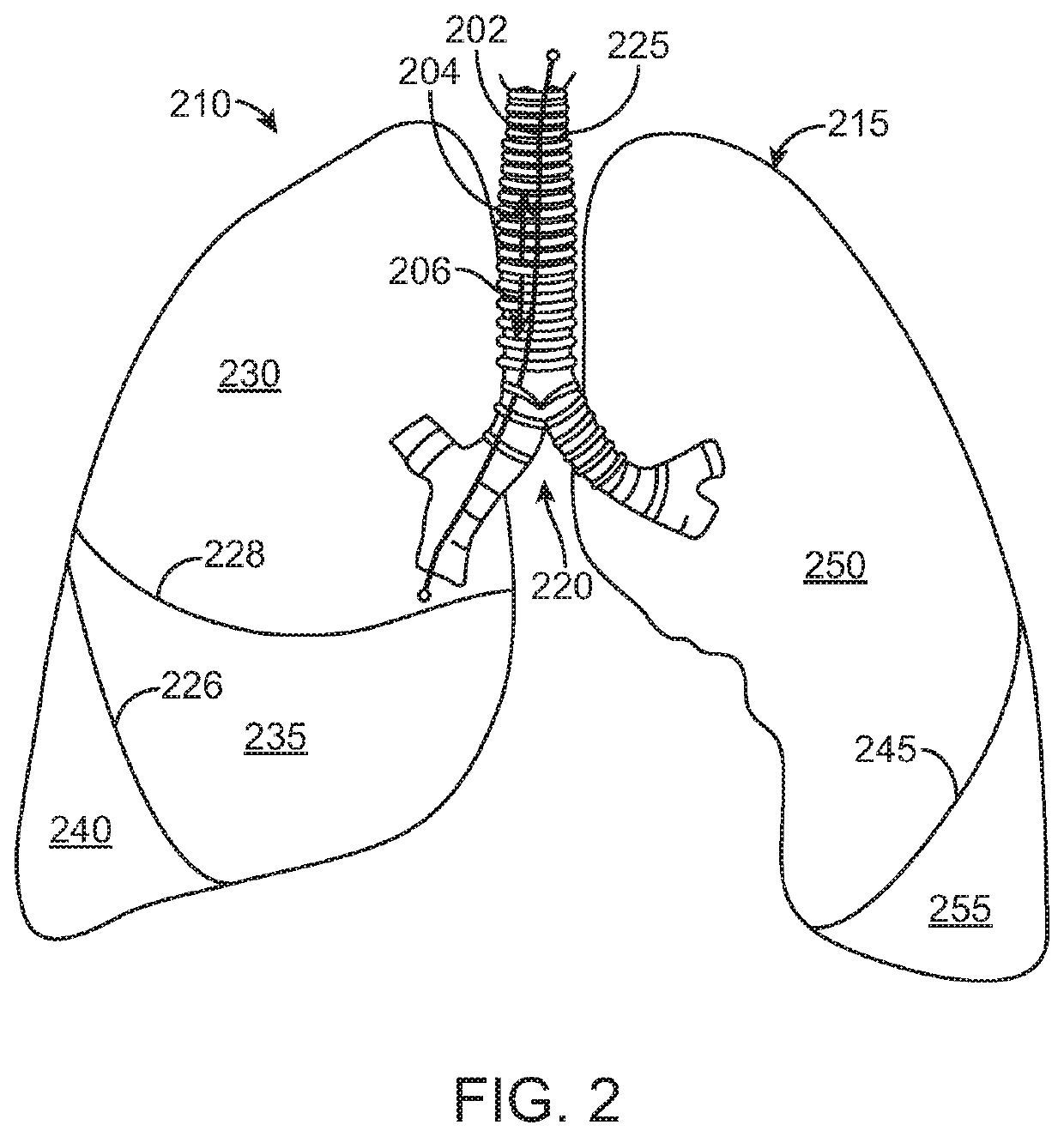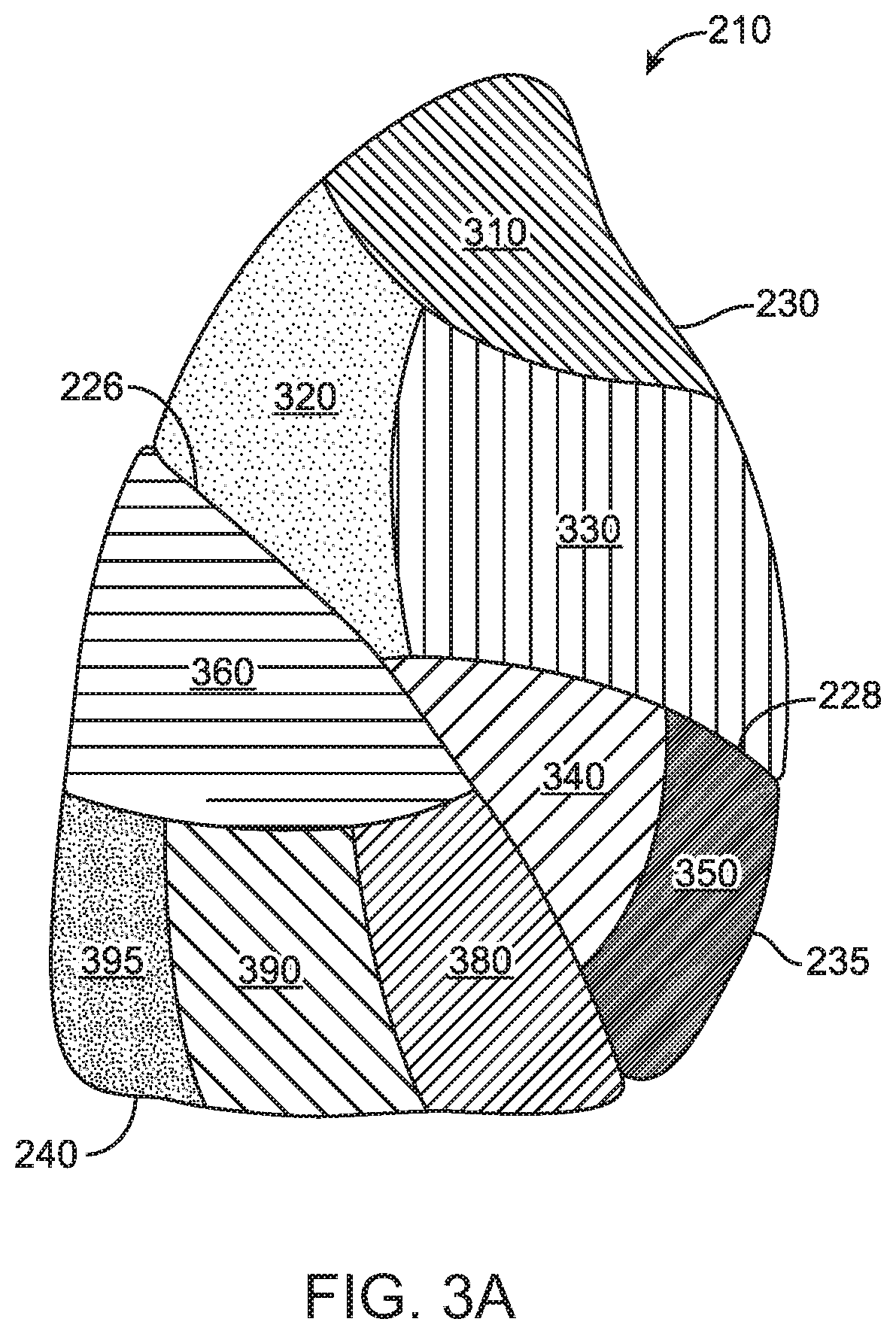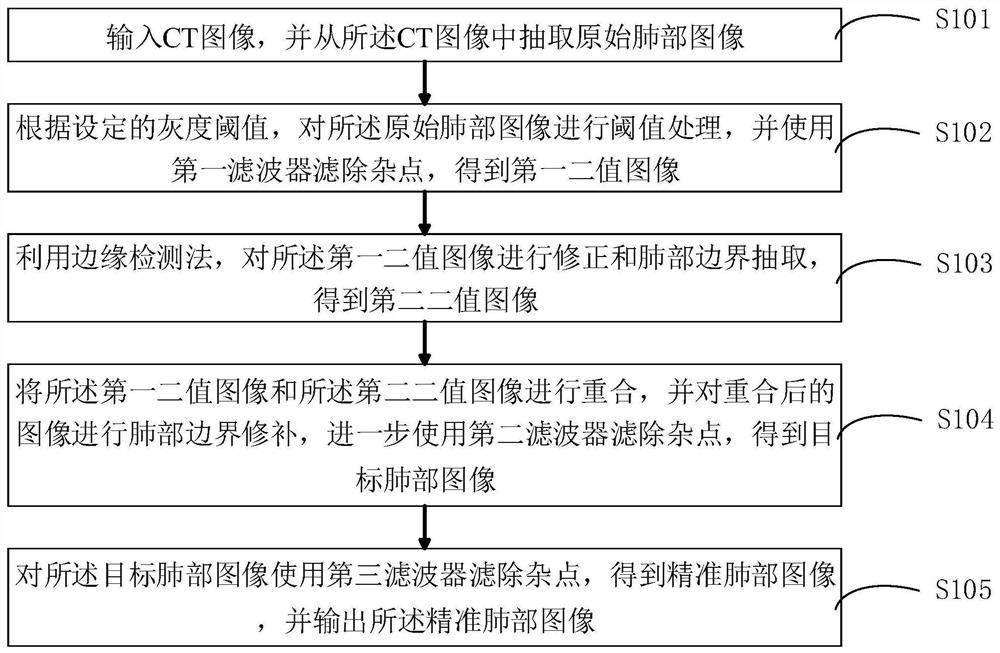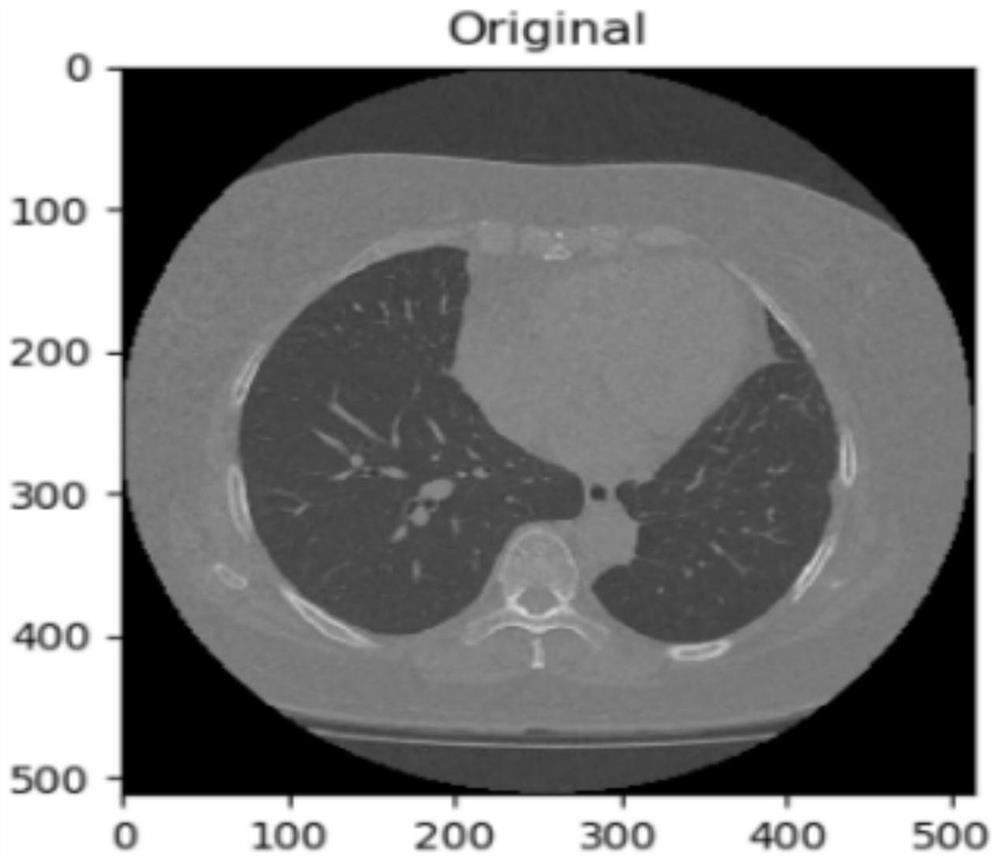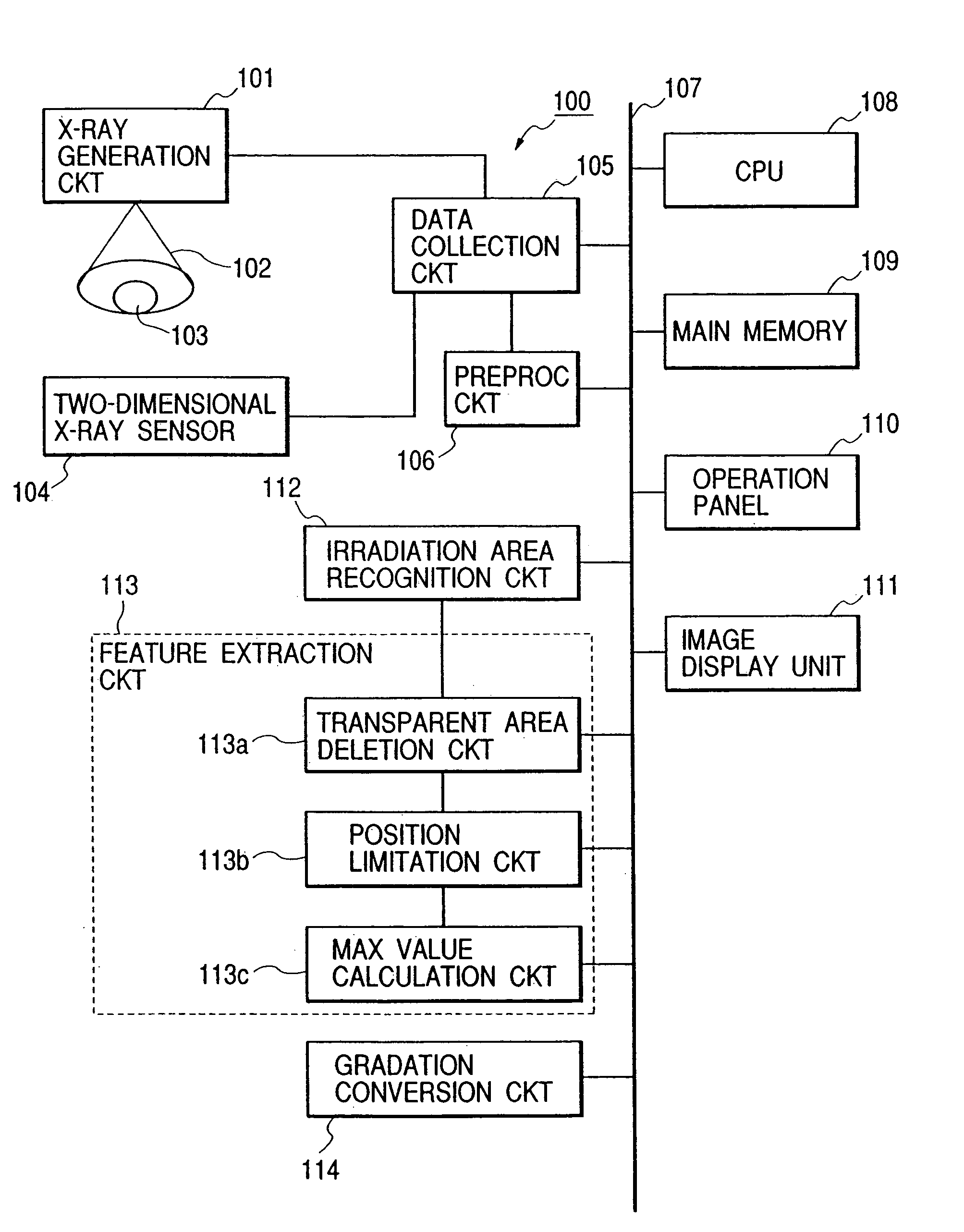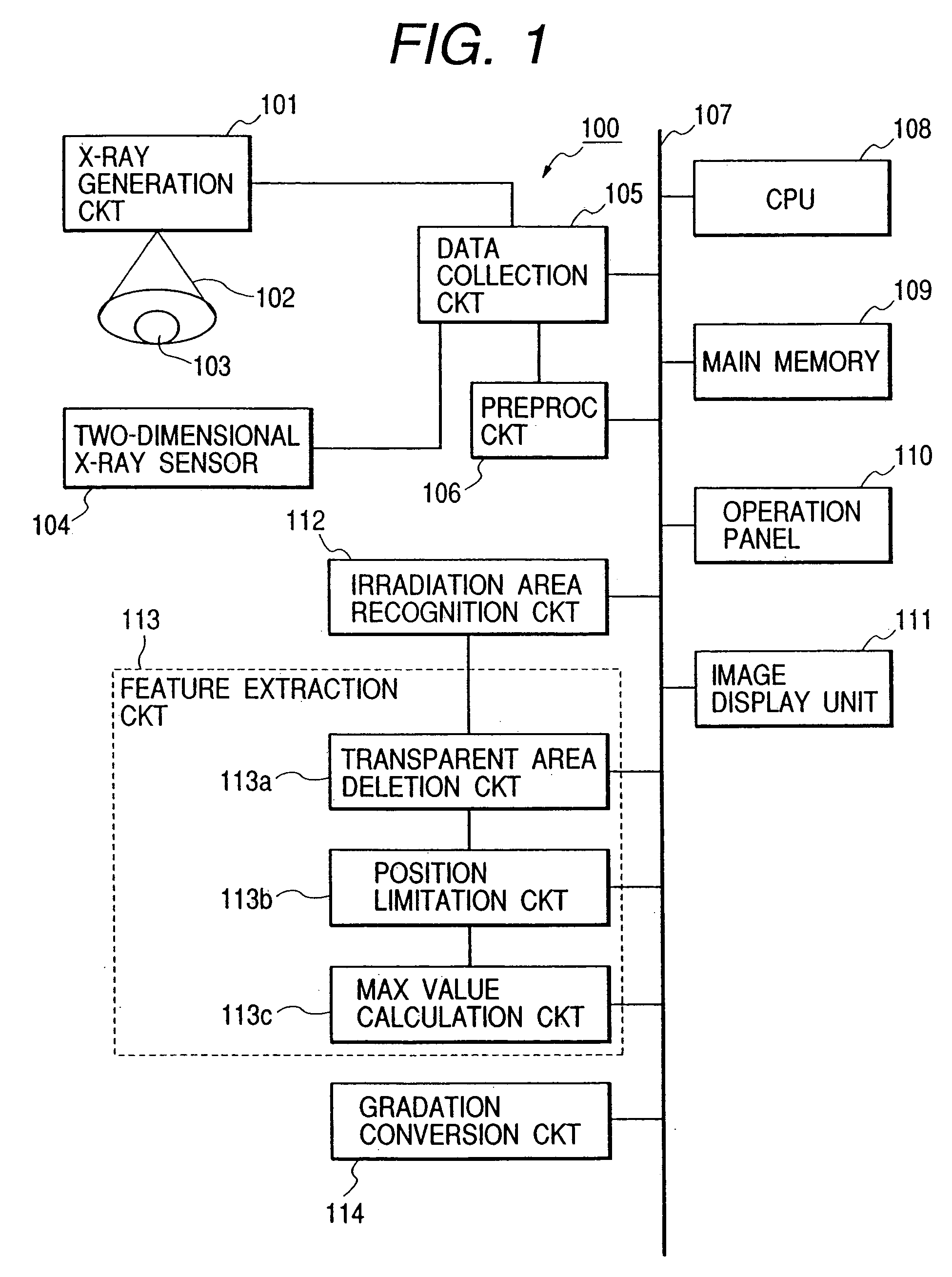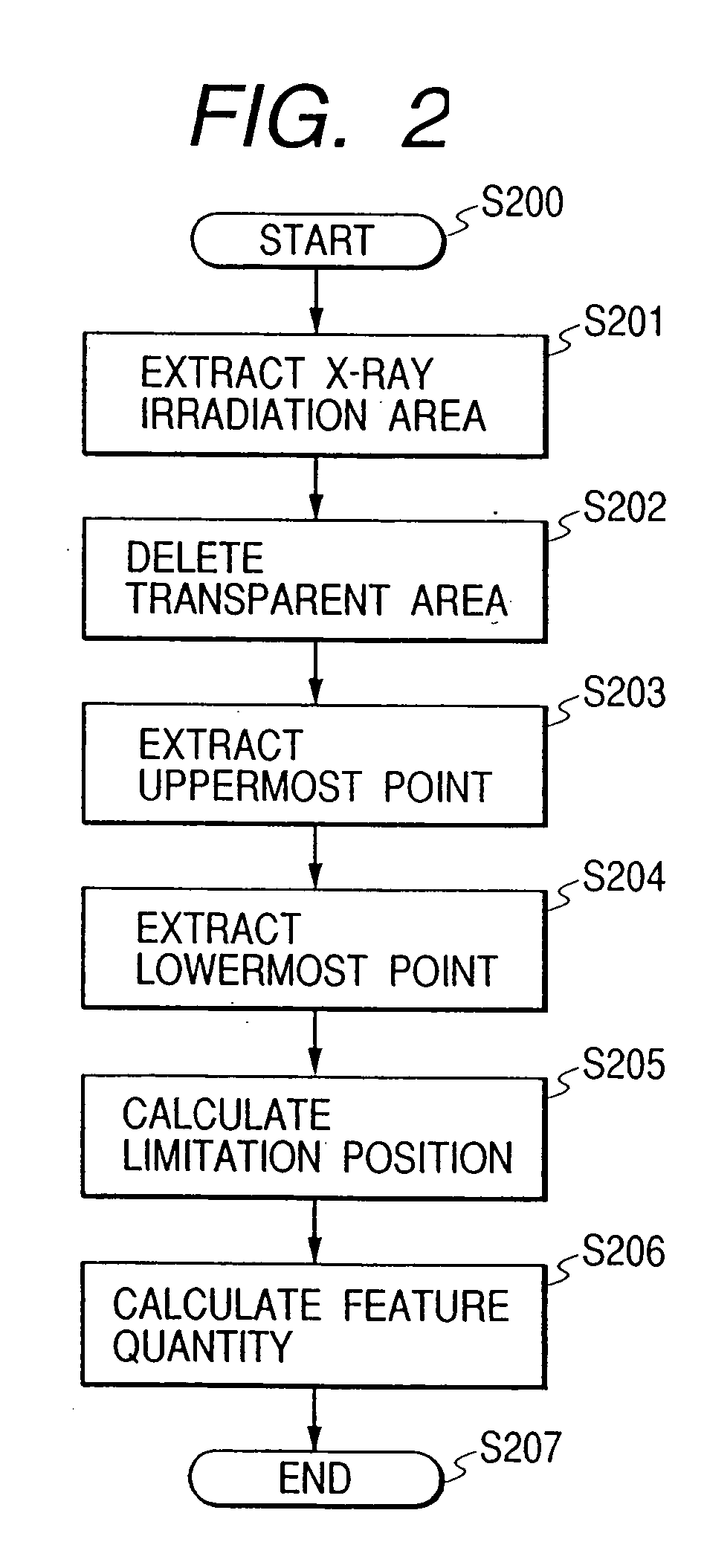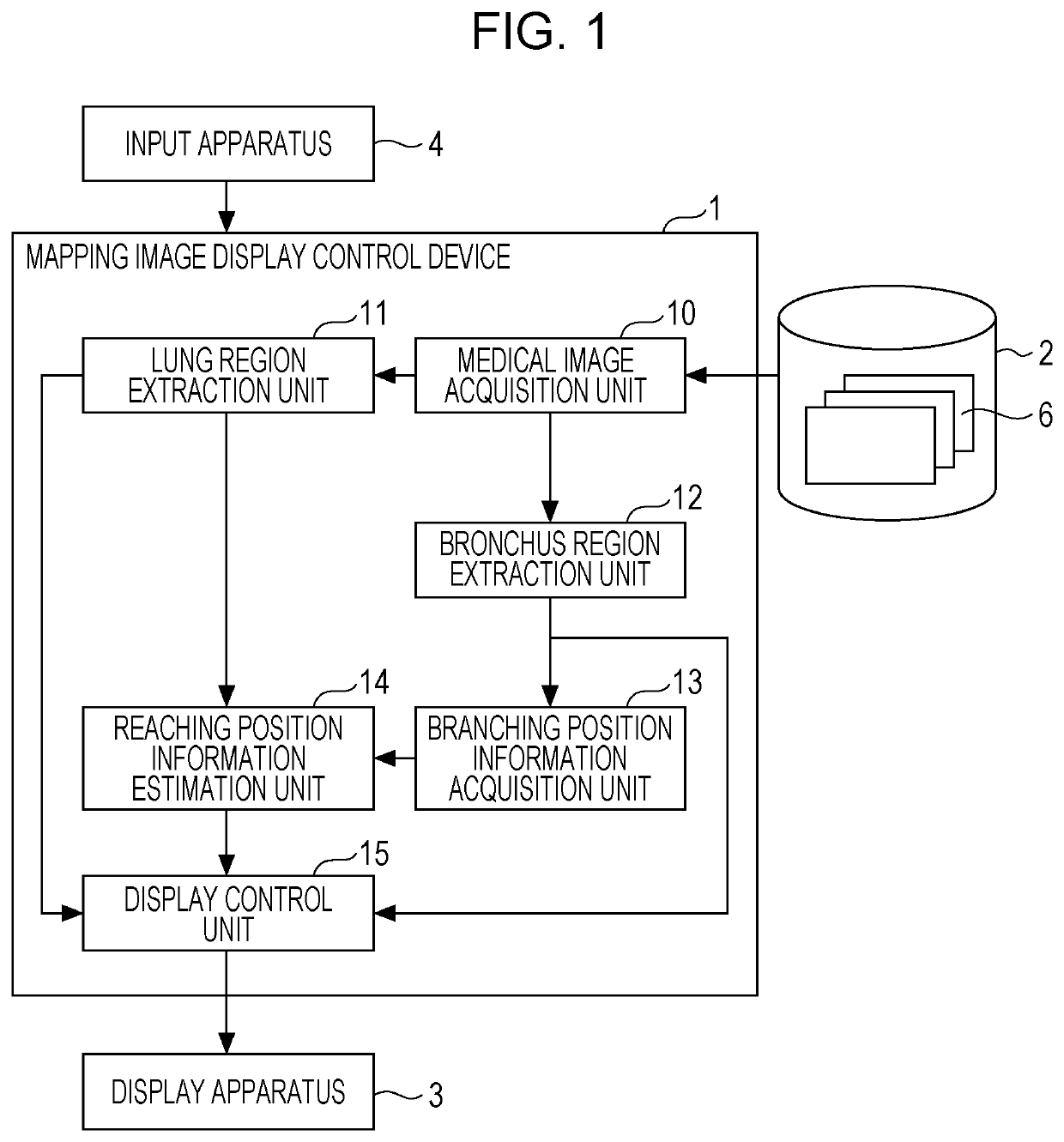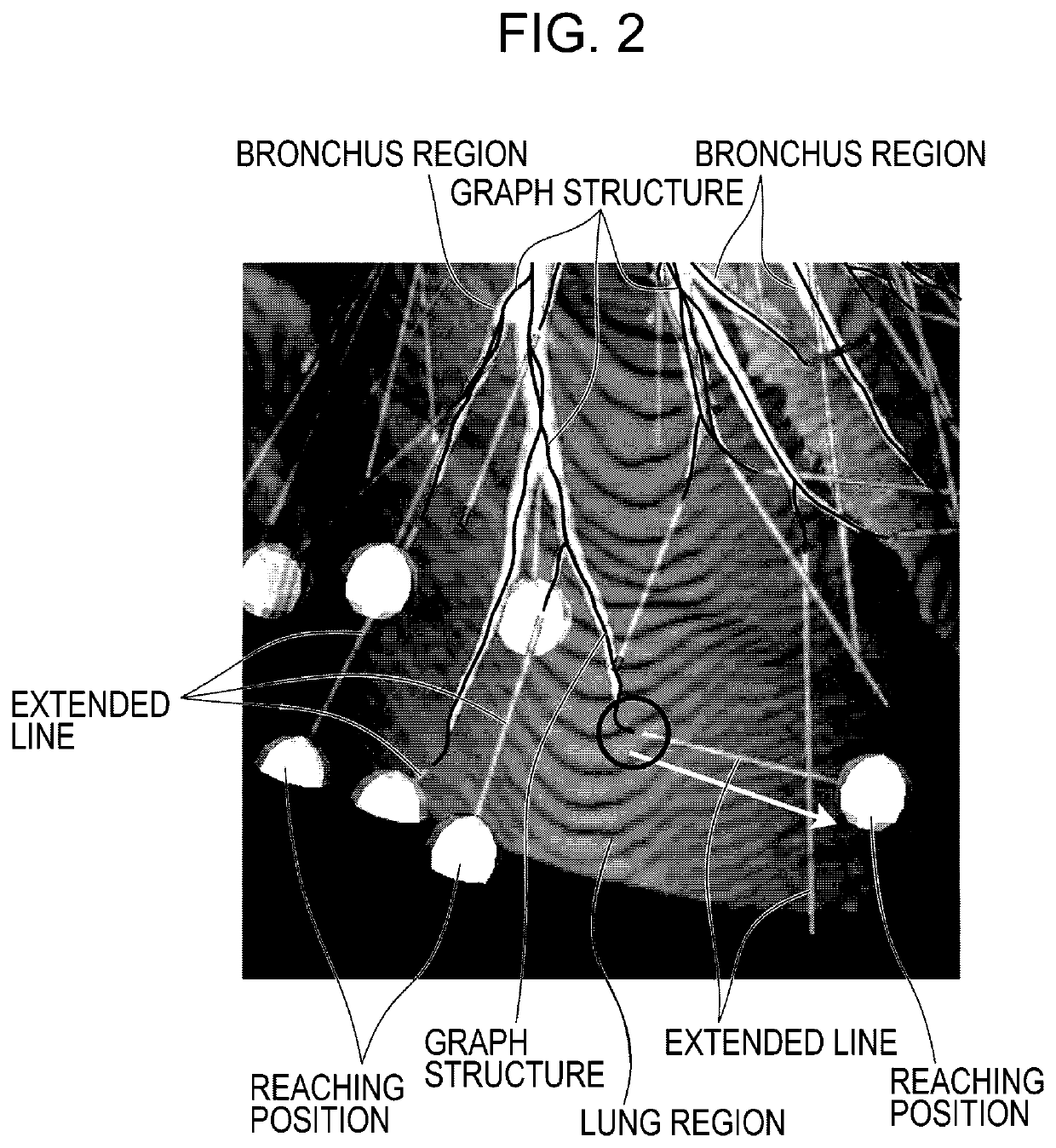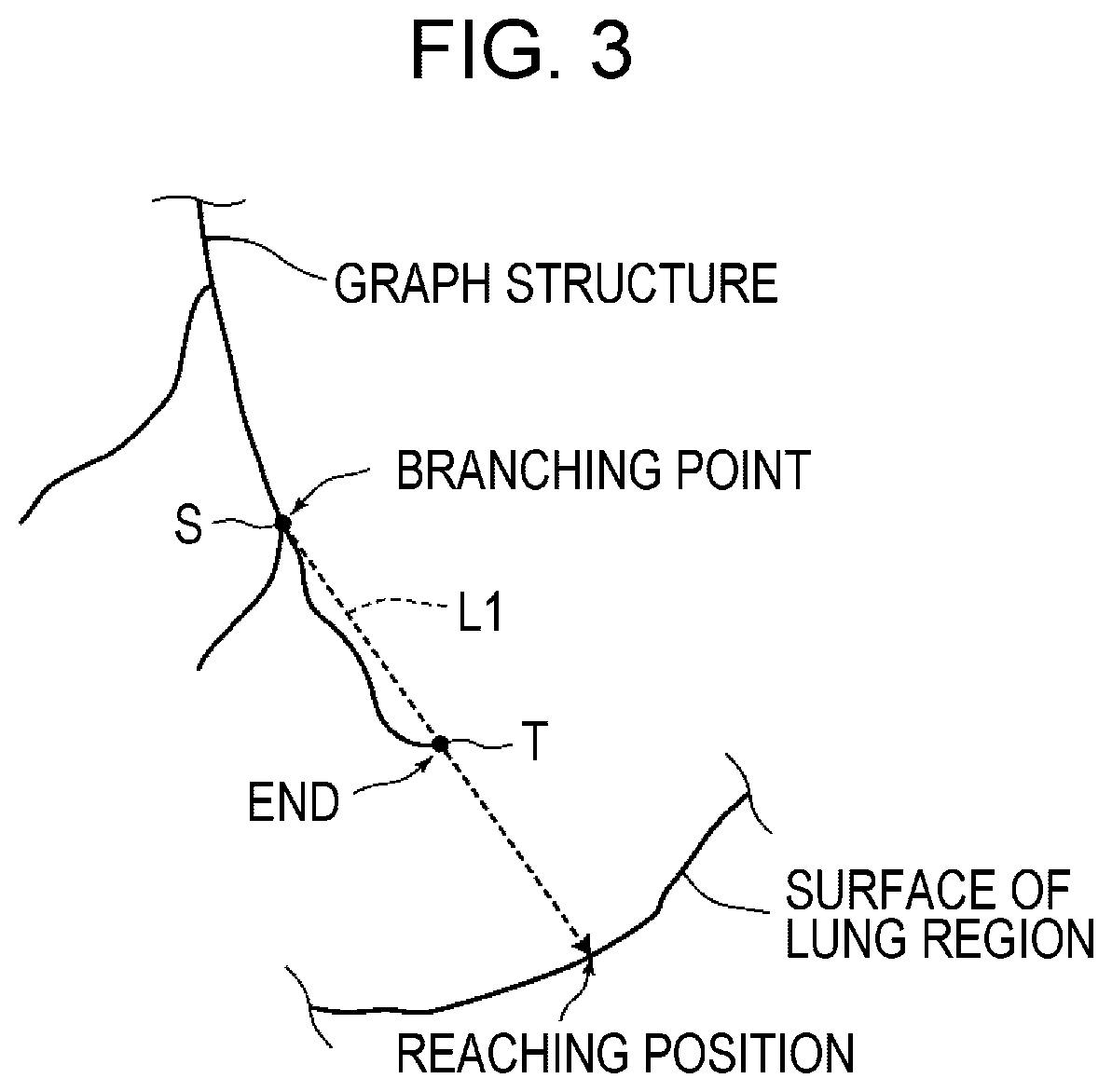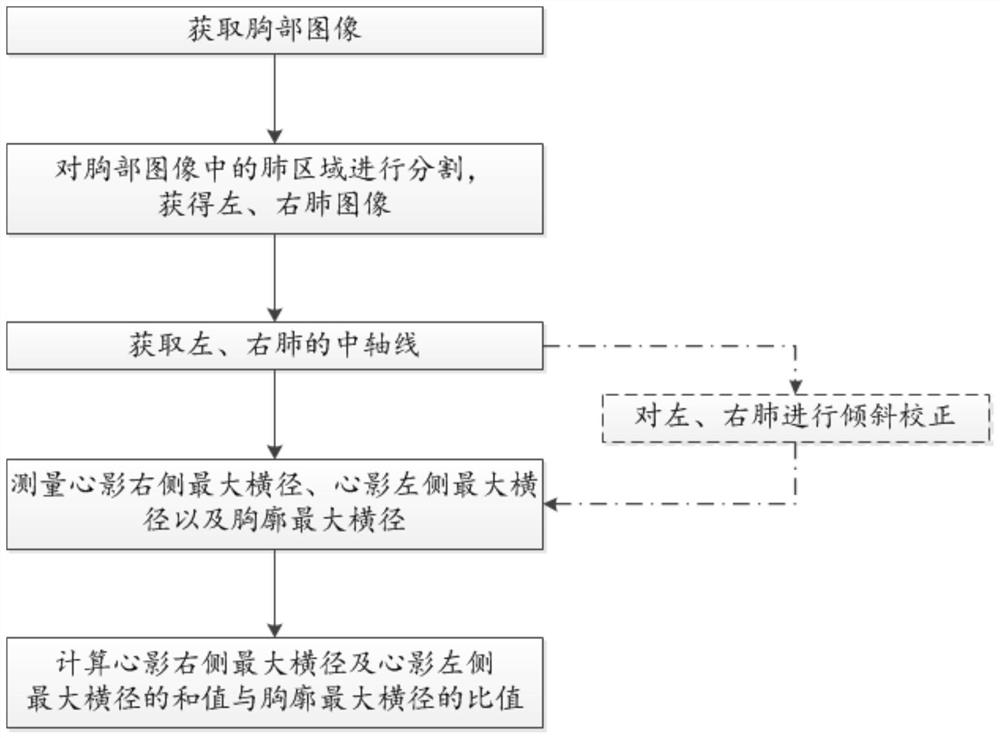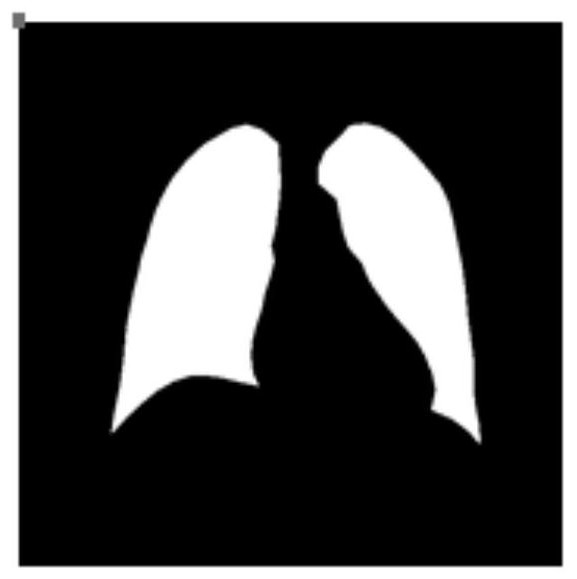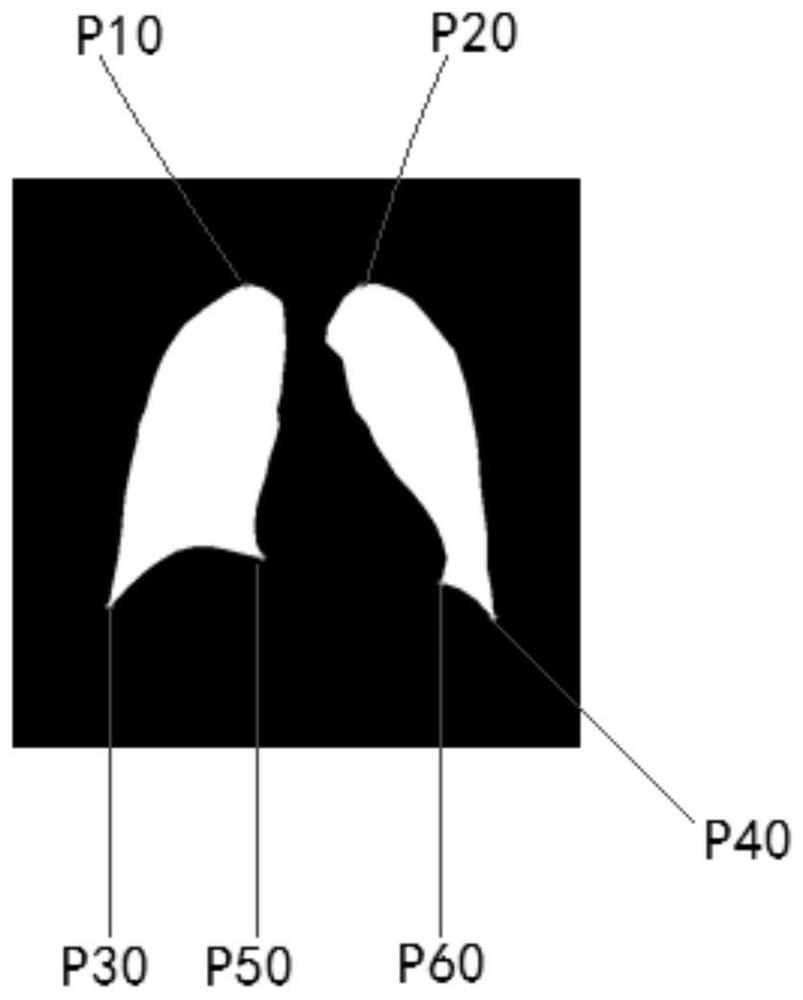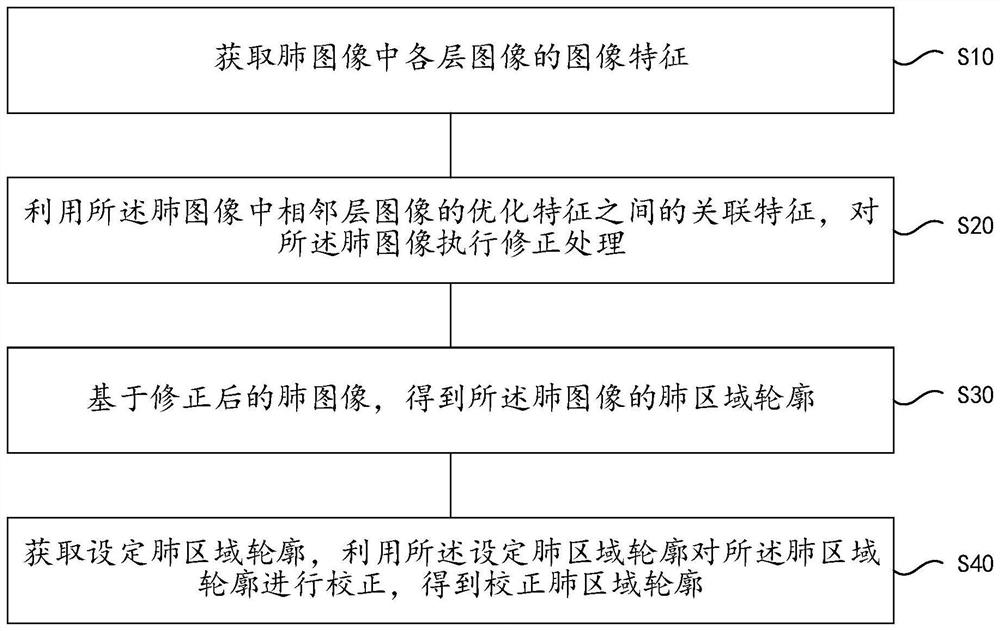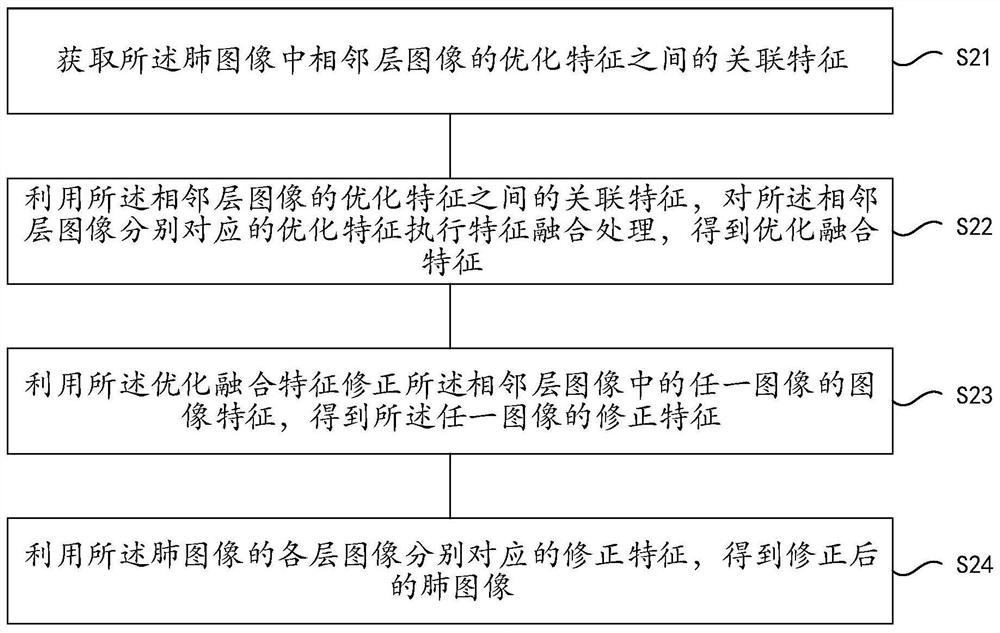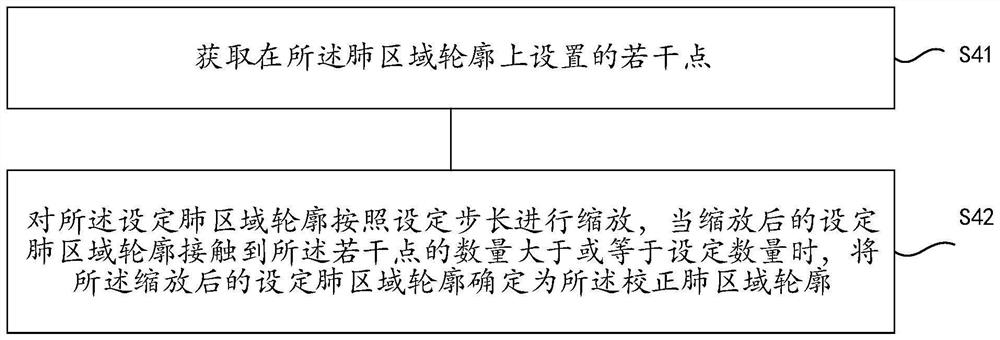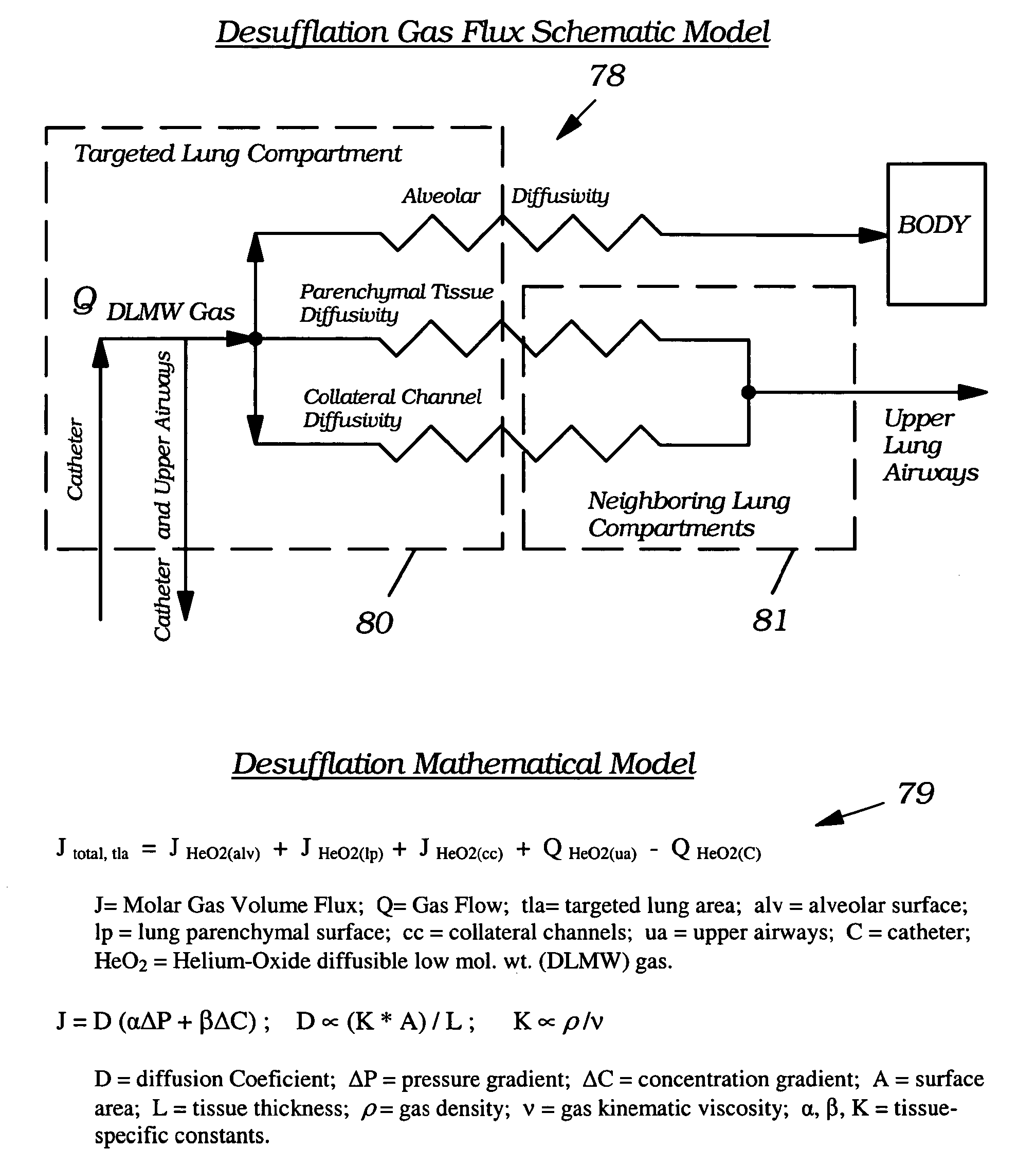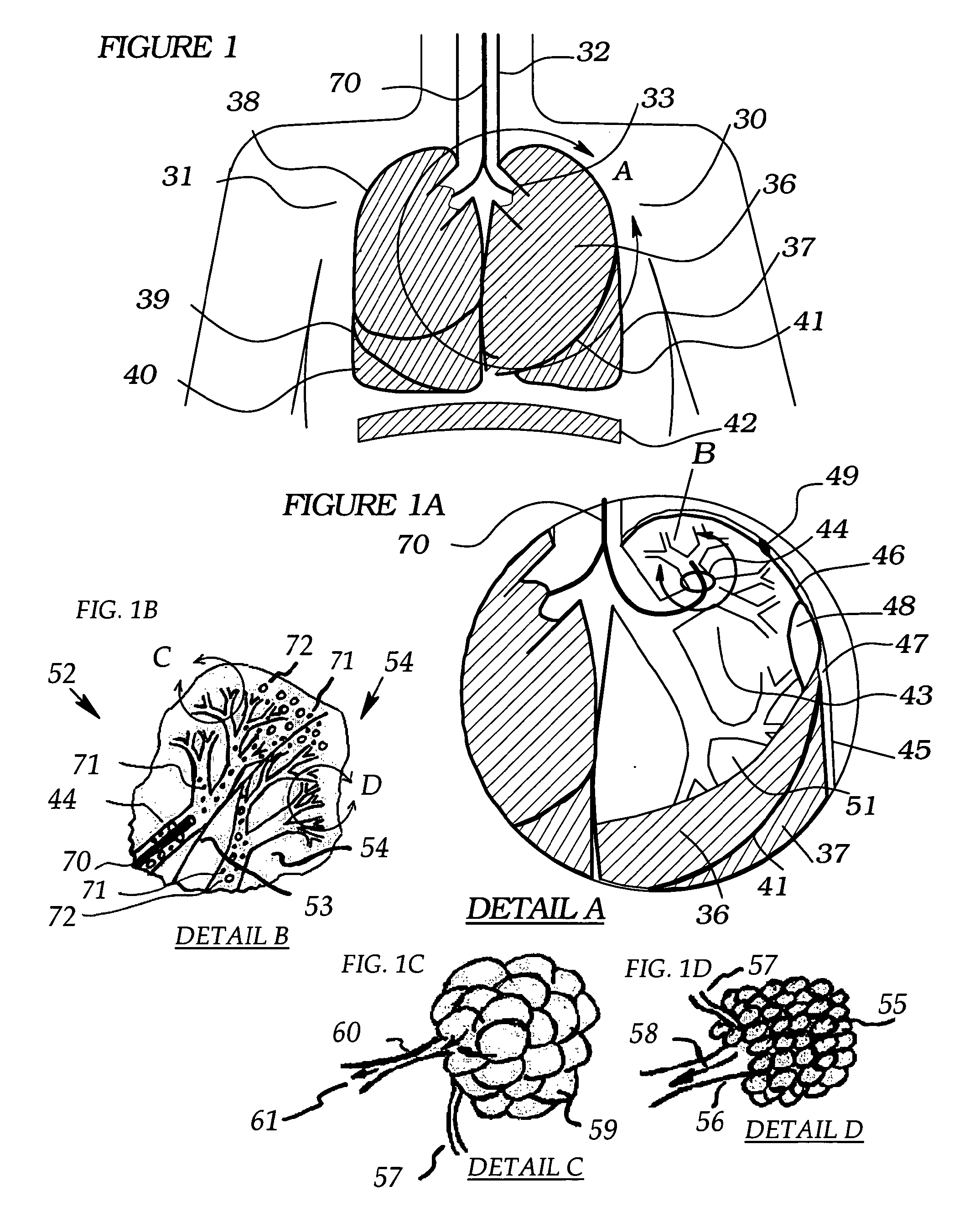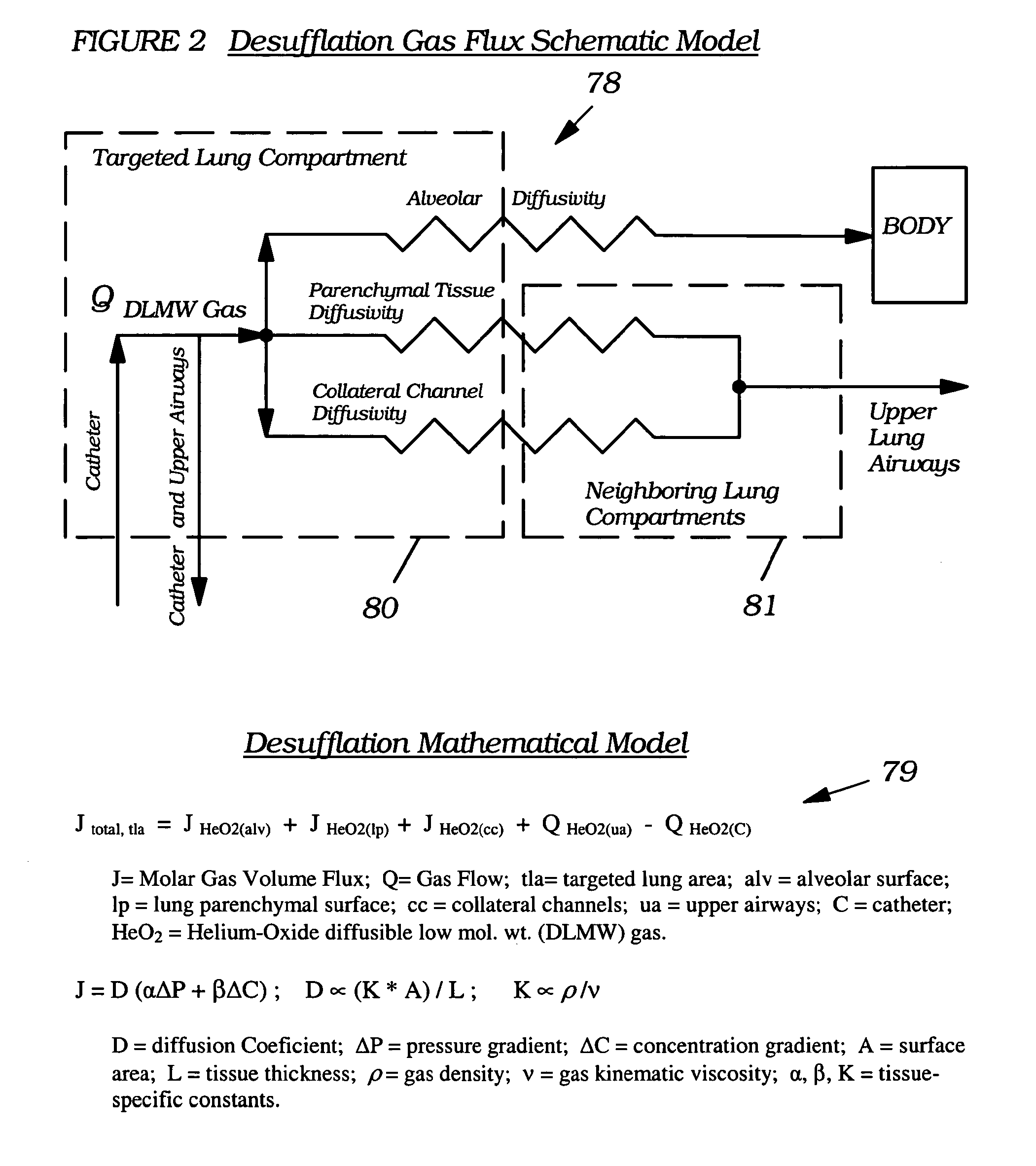Patents
Literature
37 results about "Pulmonary area" patented technology
Efficacy Topic
Property
Owner
Technical Advancement
Application Domain
Technology Topic
Technology Field Word
Patent Country/Region
Patent Type
Patent Status
Application Year
Inventor
Pulmonary area. pul·mo·nar·y ar·e·a. the region of the chest at the second left intercostal space, where sounds produced at the pulmonary valve of the right ventricle are heard most distinctly.
Methods and devices for inducing collapse in lung regions fed by collateral pathways
Disclosed are methods and devices for regulating fluid flow in one or more lung regions that are supplied fluid through one or more collateral pathways. An identified region of the lung is targeted for volume reduction or collapse. The targeted lung region is then bronchially isolated to inhibit air from flowing into the targeted lung region through bronchial pathways that directly feed air to the targeted lung region. If the targeted lung region does not collapse after bronchially isolating the targeted lung region, then it is possible that a collateral pathway is feeding air to the targeted lung region, thereby preventing the targeted lung region from collapsing. In such a case, the collateral pathway is identified and air flow into the targeted lung region via the collateral pathway is reduced or eliminated.
Owner:PULMONX
Bronchial catheter and method of use
InactiveUS20110245665A1Ultrasonic/sonic/infrasonic diagnosticsOther blood circulation devicesDistal portionBronchial tube
A catheter assembly and method of using the catheter assembly is provided herein. The catheter assembly has a catheter shaft having an elongated body extending about a longitudinal axis, a proximal portion and a distal portion, an outer surface, and at least one lumen extending therethrough the elongated body at least one means for sealing at least a portion of the lumen of the bronchial vessel. At least a portion of the catheter assembly is configured for insertion into at least a portion of a bronchial vessel of a target lung region. The means for sealing is moveable between a collapsed state and an expanded state. At least a portion of the vessel can be sealed by inflating the means for sealing. The catheter assembly can then be used to infuse a dialysate solution into the target lung region.
Owner:ANGIODYNAMICS INC
Method and system for grading and managing detection of pulmonary nodes based on in-depth learning
ActiveCN107103187AAutomatic nodule grading managementAutomatic diagnosisCharacter and pattern recognitionMedical automated diagnosisMedicineLow-Dose Spiral CT
The invention discloses a method for grading and managing detection of pulmonary nodes based on in-depth learning. The method for grading and managing detection of the pulmonary nodes based on in-depth learning is characterized by comprising the steps of S100, collecting a chest ultralow-dose-spiral CT thin slice image, sketching a lung area in the CT image, and labeling all pulmonary nodes in the lung area; S200, training a lung area segmentation network, a suspected pulmonary node detection network and a pulmonary node sifting grading network; S300, obtaining pulmonary node temporal sequences of all patients in an image set and grading information marks corresponding to the pulmonary node sequences to construct a pulmonary node management database; S400, training a lung cancer diagnosis network based on a three-dimensional convolutional neural network and a long-short-term memory network. According to the method for grading and managing detection of the pulmonary nodes based on in-depth learning, the lung area segmentation network, the suspected pulmonary node detection network, the pulmonary node sifting grading network and the lung cancer diagnosis network are trained based on in-depth learning, the pulmonary nodes are accurately detected, and through the combination of subsequent tracking and visiting, more accurate diagnosis information and clinic strategies are obtained.
Owner:SICHUAN CANCER HOSPITAL +1
Pulmonary nodule automatic detection method and system based on chest CT image
InactiveCN107274402AImprove detection efficiencyImage enhancementImage analysisPulmonary noduleNerve network
The invention discloses a pulmonary nodule automatic detection method and system based on a chest CT image; the method comprises the following steps: receiving a chest CT image, using a preset 3D convolution nerve network to carry out pulmonary nodule focus detection for the chest CT image, and outputting a detection result; receiving the CT image and the detection result, and loading the detection result with the corresponding chest CT image to form a fused file; obtaining the fused file and carrying out visualization treatment, providing browse auxiliary operations for users on the fused file with the visualization treatment, and providing a calculation and measuring function. The method and system can isolate lung areas, extract candidate pulmonary nodules and remove false positives, thus improving focus detection efficiency, and the false positive efficiency can reach 97.7%. the method can use visualization three dimensional forms to directly assist a doctor to determine the pulmonary nodule forms.
Owner:BEIJING SHENRUI BOLIAN TECH CO LTD +1
Pulmonary nodule three-dimensional segmentation and feature extraction method and system thereof
InactiveCN101763644AReduce distractionsImprove accuracyImage analysisPulmonary noduleFeature extraction
The invention belongs to the application field of computer analysis technology of medical image, and relates to a pulmonary nodule three-dimensional segmentation and feature extraction method and a system thereof based on chest CT. By adopting a level set method based on a three-dimensional space, pulmonary nodule is divided within a three-dimensional interest area, and the feature of the nodule can be extracted by combining the characteristics of a bounding curved surface and the interest area of the pulmonary nodule. The invention comprises a lung area segmentation module, a three-dimensional interest area extracting module, a pulmonary nodule three-dimensional segmentation module, a nodule feature extraction and quantification module and an output module. The invention fully utilizes the three-dimensional space information of HRCT image, thus reducing the interference of normal tissues around the nodule for segmentation and feature extraction, and improving the accuracy of feature extraction.
Owner:HUAZHONG UNIV OF SCI & TECH
System, method and apparatus for small pulmonary nodule computer aided diagnosis from computed tomography scans
ActiveUS7499578B2Improve consistencyImprove accuracyImage enhancementImage analysisPulmonary noduleVoxel
The present invention is a multi-stage detection algorithm using a successive nodule candidate refinement approach. The detection algorithm involves four major steps. First, the lung region is segmented from a whole lung CT scan. This is followed by a hypothesis generation stage in which nodule candidate locations are identified from the lung region. In the third stage, nodule candidate sub-images pass through a streaking artifact removal process. The nodule candidates are then successively refined using a sequence of filters of increasing complexity. A first filter uses attachment area information to remove vessels and large vessel bifurcation points from the nodule candidate list. A second filter removes small bifurcation points. The invention also improves the consistency of nodule segmentations. This invention uses rigid-body registration, histogram-matching, and a rule-based adjustment system to remove missegmented voxels between two segmentations of the same nodule at different times.
Owner:CORNELL RES FOUNDATION INC
Method for automated analysis of digital chest radiographs
InactiveUS20070086640A1Improve display qualityMakes robustImage enhancementImage analysisImaging processingLung region
A method for automatically segmenting lung regions in a chest radiographic image comprising; providing an input digital chest radiograph image; preprocessing the input digital radiographic image; extracting the chest body midline and lung centerlines from the preprocessed image. Locating one-by-one, the chest body model, the spine model and the two lung models in the image based on the extracted chest body midline and two lung centerlines; and detecting the lung contours by deforming the lung shape models to converge to the true lung boundaries as a function of the extracting and locating image processing.
Owner:CARESTREAM HEALTH INC
Segmentation method, device and equipment for lung segments and storage medium
PendingCN110956635ARapid positioningSolve the slow test speedImage enhancementImage analysisLung lobeSegmental pulmonary vein
The invention discloses a segmentation method, device and equipment for lung segments and a storage medium. The method comprises the steps: obtaining a to-be-identified image and a corresponding lunglobe segmentation result; performing lung segment coarse segmentation on the to-be-identified image based on a lung segment coarse segmentation model to obtain a lung region segmentation result; determining a first sub-image corresponding to the lung region segmentation result in the to-be-identified image; determining a second sub-image corresponding to the lung region segmentation result in thelung lobe segmentation result; taking the first sub-image and the second sub-image as input of a dual-channel lung segment fine segmentation model, and performing lung segment fine segmentation on thefirst sub-image based on the dual-channel lung segment fine segmentation model to obtain a first lung segment segmentation result. By means of the technical scheme, lung segment coarse positioning can be rapidly conducted, the data acquisition speed is increased, the fine segmentation of lung segments only needs to be conducted on the lung region segmentation result obtained through coarse segmentation, the segmentation of lung segments is assisted through the lung lobe segmentation result, and the method is more accurate and efficient.
Owner:SHANGHAI UNITED IMAGING INTELLIGENT MEDICAL TECH CO LTD
Region extraction apparatus, method and program
ActiveUS20140079306A1Limited rangeHigh-speed and highly-accurate extraction processingImage enhancementImage analysisVoxelLung region
A three-dimensional medical image obtainment unit that obtains a three-dimensional medical image of a chest, a bronchial structure extraction unit that extracts a bronchial structure from the three-dimensional medical image, a divided lung region obtainment unit that divides, based on the divergence of the bronchial structure, the bronchial structure into plural bronchial structures, and obtains plural divided lung regions based on the plural divided bronchial structures, a distance image generation unit that generates, based on the plural divided lung regions, a distance image based on a distance between each voxel in an entire region excluding at least one of the plural divided lung regions and each of the plural divided lung regions, and a border non-existing region extraction unit that extracts, based on the distance image generated by the distance image generation unit, a border non-existing region, which does not include any borders of the divided lung regions, are provided.
Owner:FUJIFILM CORP
System, Method and Apparatus for Small Pulmonary Nodule Computer Aided Diagnosis from Computed Tomography Scans
InactiveUS20090080748A1Improve consistencyImprove accuracyImage enhancementImage analysisPulmonary noduleVoxel
The present invention is a multi-stage detection algorithm using a successive nodule candidate refinement approach. The detection algorithm involves four major steps. First, the lung region is segmented from a whole lung CT scan. This is followed by a hypothesis generation stage in which nodule candidate locations are identified from the lung region. In the third stage, nodule candidate sub-images pass through a streaking artifact removal process. The nodule candidates are then successively refined using a sequence of filters of increasing complexity. A first filter uses attachment area information to remove vessels and large vessel bifurcation points from the nodule candidate list. A second filter removes small bifurcation points. The invention also improves the consistency of nodule segmentations. This invention uses rigid-body registration, histogram-matching, and a rule-based adjustment system to remove missegmented voxels between two segmentations of the same nodule at different times.
Owner:CORNELL RES FOUNDATION INC
Lung lobe lung segment segmentation model training method and device
PendingCN111681247AHigh speedQuality improvementImage enhancementImage analysisContour segmentationLung lobe
The embodiment of the invention provides a lung lobe lung segment segmentation model training method and device. The problem that an existing lung lobe lung segment segmentation model training mode islow in accuracy is solved. The lung lobe and lung segment segmentation model training method comprises the steps of obtaining sample image data including a lung region mark, a lung lobe region mark and a lung segment region mark; inputting the sample image data into an instance segmentation model to obtain a lung lobe contour segmentation result and a lung segment contour segmentation result; calculating a loss function value according to the difference between the lung lobe contour segmentation result and the lung segment contour segmentation result and the difference between the lung lobe region mark and the lung segment region mark; and adjusting network parameters of the instance segmentation model based on the loss function value.
Owner:HANGZHOU SHENRUI BOLIAN TECH CO LTD +1
Method and system for three-dimensional segmentation and feature extraction of pulmonary nodules
InactiveCN101763644BReduce distractionsImprove accuracyImage analysisPulmonary noduleFeature extraction
The invention belongs to the application field of computer analysis technology of medical images, and is a method and system for three-dimensional segmentation and feature extraction of pulmonary nodules based on chest CT. The present invention uses a three-dimensional space-based level set method to segment pulmonary nodules in a three-dimensional region of interest, and extracts nodule features in combination with the pulmonary nodule boundary surface and the characteristics of the region of interest. The invention comprises a lung region segmentation module, a three-dimensional interested region extraction module, a pulmonary nodule three-dimensional segmentation module, a nodule feature extraction and quantification module and an output module. The invention makes full use of the three-dimensional space information of the HRCT image, can reduce the interference of normal tissues around the nodules on its segmentation and feature extraction, and improves the accuracy of feature extraction.
Owner:HUAZHONG UNIV OF SCI & TECH
Automatic lung organ model leaf division method and system based on CT image
PendingCN114581476AMeet the needs of intelligent processing applicationsReduce distractionsImage enhancementImage analysisPulmonary parenchymaRadiology
The invention discloses a lung organ model automatic leaf division method based on a CT image. The lung organ model automatic leaf division method comprises the following steps: importing original data ImageData of a chest sequence CT image; extracting a lung parenchyma region by adopting a threshold segmentation algorithm to obtain a binary image of the lung parenchyma, recording the binary image as MASK1, and performing three-dimensional reconstruction on the detected and segmented lung parenchyma region; calculating the maximum bounding box of the pulmonary parenchyma according to whether the outermost boundary of the binary image of the pulmonary parenchyma has a binary point, performing enhancement calculation on the sheet structure to obtain enhanced image data MASK2, further processing to obtain a binary image MASK3, and extracting a set of all points of the left and right binary data as a left lung point cloud S1 and a right lung point cloud S2; performing left lung cutting segmentation by taking the left lung point cloud S1 as input data; and taking the right lung point cloud S2 as input data to sequentially carry out right lung first-stage cutting and right lung second-stage cutting. The method can reduce the interference of the non-lung region on the extraction of the lung gap point cloud, can improve the operation efficiency, does not need manual intervention, and can significantly reduce the workload.
Owner:深圳市一图智能科技有限公司
Nuclear medicine pulmonary perfusion imaging quantitative analysis method and analysis equipment, and storage medium
ActiveCN111358484AAccurate quantitative analysisAccurate calculationImage enhancementImage analysisLung volumesLung perfusion
The invention relates to the measurement technology of pulmonary volume and pulmonary perfusion volume, in particular to a nuclear medicine pulmonary perfusion imaging quantitative analysis method andanalysis equipment, and a storage medium. The analysis method comprises the following steps of: preprocessing a patient examination image, and classifying images into dissection images and perfusionimages; and according to different types of images, selecting a corresponding way to process the examination image, obtaining dissected pulmonary net volume and perfused lung net volume, and carryingout calculation to obtain a perfusion effective volume ratio. The analysis method can automatically identify a pulmonary area in the image and can accurately carry out pulmonary perfusion imaging quantitative analysis.
Owner:THE FIRST AFFILIATED HOSPITAL OF GUANGZHOU MEDICAL UNIV (GUANGZHOU RESPIRATORY CENT)
Three-dimensional imaging method based on wearable magnetocardiogram three-dimensional measuring device
ActiveCN114287943AImprove portabilityLow costDiagnostic recording/measuringWater resource assessmentHuman bodyReal time analysis
The invention relates to a three-dimensional imaging method based on a wearable magnetocardiography three-dimensional measuring device, and the wearable magnetocardiography three-dimensional measuring device obtains all three-dimensional magnetocardiography signals of a human body through a plurality of measuring sensors fixed by an adjustable vest in a magnetic shielding space. The method comprises the following steps: screening transmitted three-dimensional magnetocardiogram signals according to preset amplitude information, carrying out noise reduction and dimension reduction processing on the screened magnetocardiogram signals by adopting an independent component analysis and empirical mode decomposition method, and establishing a three-dimensional grid model comprising a trunk region, a heart region and a double-lung region based on a CT (Computed Tomography) image of a human body, a lead field matrix of magnetic field conduction from the heart to the position of the in-vitro sensor is obtained in a forward solving mode, and magnetic field distribution, used for real-time display, of the outer membrane surface of the heart is reversely solved based on the lead field matrix and the multi-channel signals. The wearable magnetocardiogram three-dimensional measuring device can synchronously obtain the three-dimensional magnetocardiogram signals, analyzes and displays the three-dimensional magnetocardiogram signals in real time, and is low in cost and convenient to carry.
Owner:HANGZHOU INNOVATION RES INST OF BEIJING UNIV OF AERONAUTICS & ASTRONAUTICS
Image processing method, device and equipment and storage medium
PendingCN111626998AImprove feature accuracyGuaranteed to be clear and completeImage enhancementImage analysisLung lobeThoracic cavity
The invention discloses an image processing method, device and equipment and a storage medium, and the method comprises the steps: obtaining the image features of a lesion lung image, and the lesion lung image is a lung image where the boundary of a lung region adheres to the inner wall of a thoracic cavity; correcting the lesion lung image based on the image features, and determining the lung area volume of the lesion lung image based on the lung area contour obtained by the corrected lesion lung image; and determining a lung lobe position of the focus lung image based on the lung area volume, and extracting lung lobes based on the lung lobe position. The lung lobe area can be rapidly and accurately divided, and rapid quantitative analysis of clinical diseases can be achieved in an assisted mode.
Owner:WEBANK (CHINA)
Vapor treatment of lung nodules and tumors
ActiveUS10485604B2Reduce impactImprove morbiditySurgical instruments for heatingPulmonary noduleCatheter
Systems and methods for treating a lesion in a lung of a patient are described. Embodiments can include navigating a vapor exit port of a vapor delivery catheter to an airway point near a lung region in which the lesion resides, delivering condensable vapor from the vapor delivery catheter along anatomic boundaries of the lung region, and creating a uniform field of necrosis in tissue around the lesion by allowing the condensable vapor to condense.
Owner:UPTAKE MEDICAL TECH INC
Image processing method, device and equipment and storage medium
PendingCN111627026AImprove feature accuracyShorten division timeImage enhancementImage analysisLung lobeImaging processing
The invention discloses an image processing method, device and equipment and a storage medium, and the method comprises the steps: obtaining a lesion lung image, and carrying out the lung region extraction of the lesion lung image based on a preset lung region contour; obtaining a left lung image and a right lung image based on the extracted lung area; and performing region division on the left lung image based on the left lung volume of the left lung image, and performing region division on the right lung image based on the right lung volume of the right lung image. The lung lobe region division precision can be improved, the lung lobe region division time can be shortened, and an auxiliary effect can be provided for quantitative analysis of lung diseases.
Owner:WEBANK (CHINA)
Method and system for pulmonary nodule detection, grading and management based on deep learning
ActiveCN107103187BAvoid delayCharacter and pattern recognitionMedical automated diagnosisPulmonary noduleUltra low dose
The invention discloses a method for detecting, grading and managing pulmonary nodules based on deep learning, which is characterized in that it includes the following steps: S100: collecting ultra-low-dose spiral CT thin-layer images of the chest, delineating the lung area in the CT image, and marking out All lung nodules in the lung area; S200: train the lung area segmentation network, suspected lung nodule detection network and lung nodule screening and grading network; S300: obtain the time series of lung nodules and their corresponding grading for all patients in the image set Information labeling, constructing a pulmonary nodule management database; S400: Training a lung cancer diagnosis network based on a three-dimensional convolutional neural network and a long-term short-term memory network. Based on deep learning, the present invention trains the lung region segmentation network, suspected pulmonary nodule detection network, pulmonary nodule screening and grading network and lung cancer diagnosis network, accurately detects pulmonary nodules, and combines follow-up follow-up to obtain more accurate diagnosis Information and Clinical Strategies.
Owner:SICHUAN CANCER HOSPITAL +1
Medical image display device, method, and program
ActiveUS10980493B2Accurate timingAccurate calculationImage enhancementImage analysis3d imageRadiology
A classification unit classifies a lung region, which is included in each of two three-dimensional images having different imaging times for the same subject, into a plurality of types of case regions. A mapping image generation unit generates a plurality of mapping images corresponding to the three-dimensional images by labeling each of the classified case regions. A change calculation unit calculates the center-of-gravity position of each case region for case regions at corresponding positions in the mapping images, and calculates the movement amount and the movement direction of the center-of-gravity position between the mapping images as a change of each case region. A display control unit displays information regarding the change on a display.
Owner:FUJIFILM CORP
Method and apparatus for performance of thermal bronchioplasty to reduce COVID-19-induced respiratory distress and treat COVID-19-damaged distal lung regions
ActiveUS11273330B2Reduce the possibilityInactivate nerve conductionBronchoscopesUltrasound therapyUltrasonic sensorLeft main bronchus
Owner:AERWAVE MEDICAL INC
High resistance implanted bronchial isolation devices and methods
Disclosed are methods and devices for regulating fluid flow to and from a region of a patient's lung, such as to achieve a desired fluid flow dynamic to a lung region during respiration and / or to induce collapse in one or more lung regions. Pursuant to an exemplary procedure, an identified region of the lung is targeted for treatment. The targeted lung region is then bronchially isolated to regulate airflow into and / or out of the targeted lung region through one or more bronchial passageways that feed air to the targeted lung region. An exemplary flow control device is configured to block fluid flow in the inspiratory direction and the expiratory direction at normal breathing pressures and allow fluid flow in the expiratory direction at coughing pressures.
Owner:PULMONX
Image area extraction method, device and equipment and storage medium
PendingCN111627037ACalibration is complete and accurateImage enhancementImage analysisRadiologyNuclear medicine
The invention discloses an image region extraction method, apparatus and device, and a storage medium. The method comprises the steps of obtaining a preset lung region contour and a lung image; obtaining a lung region contour to be extracted according to the lung image; correcting a wrong extraction contour in the lung region contour to be extracted by using the preset lung region contour to obtain a corrected lung region contour; and performing lung region extraction on the lung image according to the corrected lung region contour. According to the method, the complete and accurate correctedlung region contour can be extracted.
Owner:WEBANK (CHINA)
High resistance implanted bronchial isolation devices and methods
Disclosed are methods and devices for regulating fluid flow to and from a region of a patient's lung, such as to achieve a desired fluid flow dynamic to a lung region during respiration and / or to induce collapse in one or more lung regions. Pursuant to an exemplary procedure, an identified region of the lung is targeted for treatment. The targeted lung region is then bronchially isolated to regulate airflow into and / or out of the targeted lung region through one or more bronchial passageways that feed air to the targeted lung region. An exemplary flow control device is configured to block fluid flow in the inspiratory direction and the expiratory direction at normal breathing pressures and allow fluid flow in the expiratory direction at higher than normal breathing pressures.
Owner:PULMONX
CT image-based lung segmentation method, device and computer-readable storage medium
ActiveCN109035272BIntegrity guaranteedAvoid missed diagnosisImage enhancementImage analysisLung regionImage based
The invention discloses a method, device and computer-readable storage medium for lung segmentation based on CT images. The method includes: inputting CT images and extracting original lung images; and classifying the original lung images according to the set grayscale threshold. The image is thresholded, and the first filter is used to filter out noise to obtain the first binary image; the edge detection method is used to correct the first binary image and extract the lung boundary to obtain the second binary image; The first binary image and the second binary image are overlapped, and the lung boundary is repaired on the overlapped image. The second filter is further used to filter out noise points to obtain the target lung image; the third filter is used to filter out Remove noise points, obtain accurate lung images, and output accurate lung images. The invention can automatically perform accurate lung segmentation on CT images, ensure the integrity of lung parenchymal region segmentation, and avoid the problem of missed diagnosis in the subsequent diagnosis process due to missing edges and missing regions of the lung region.
Owner:GUANGZHOU UNIVERSITY
Image processing apparatus, method and storage medium
InactiveUS7139419B2Satisfactory imageAccurate extractionImage enhancementImage analysisImaging processingVertical axis
An image processing apparatus which can always accurately extract, from a photographed image, an optimum feature quantity to be used for image processing is provided. In the apparatus, a limitation unit limits a predetermined area to extract the feature quantity in a lung area of an image (lung image obtained by radiographing). For example, as the predetermined area, the limitation unit limits an area obtained by dividing the lung area in a predetermined ratio, an area extending from ¼ to ½ from a head side of a maximum-length vertical axis of the lung area, or an area within a predetermined-length range from the upside of the lung area. An extraction unit extracts a feature quantity (maximum pixel value) from the predetermined area.
Owner:CANON KK
Mapping image display control device, method, and program
A mapping image display control device includes a lung region extraction unit 11 that extracts a lung region included in a three-dimensional image, a bronchus region extraction unit 12 that extracts a bronchus region included in the lung region, a branching position information acquisition unit 13 that acquires information about a branching position of the bronchus region, a reaching position information estimation unit 14 that estimates reaching position information about a position at which an extended line of a branch included in the bronchus region reaches a surface of the lung region on the basis of the information about the branching position, and a display control unit 15 that generates a mapping image in which the reaching position information is mapped to the surface of the lung region and that causes a display apparatus 3 to display the mapping image.
Owner:FUJIFILM CORP
A Method for Calculating Cardiothoracic Ratio in Medical Images
ActiveCN107665497BConvenient automatic measurementImage enhancementImage analysisCardiothoracic ratioComputer vision
Owner:SHANGHAI UNITED IMAGING HEALTHCARE
Image area correction method, device and equipment and storage medium
PendingCN111627036AHigh precisionImprove detection accuracyImage enhancementImage analysisRadiologyImaging Feature
The invention discloses an image region correction method and device, equipment and a storage medium, and the method comprises the steps: obtaining the image features of all layers of images in a lungimage, and the lung image comprises a multi-layer superposed image; performing correction processing on the lung image by using associated features between optimized features of adjacent layers of images in the lung image, and obtaining a lung region contour of the lung image based on the corrected lung image; and obtaining a set lung area contour, and correcting the lung area contour by using the set lung area contour to obtain a corrected lung area contour. According to the invention, the lung region contour detection precision can be improved, and the lung image region detection time can be shortened.
Owner:WEBANK (CHINA)
Methods, systems and devices for desufflating a lung area
InactiveUS8082921B2Improve fatigueReduce the probability of spreadingTracheal tubesBreathing masksCOPDPositive pressure
Methods, systems and devices are described for temporarily or permanently evacuating stagnating air from a diseased lung area, typically for the purpose of treating COPD. Evacuation is accomplished by displacing the stagnant CO2-rich air with a readily diffusible gas using a transluminal indwelling catheter specially configured to remain anchored in the targeted area for long term treatment without supervision. Appropriate elevated positive gas pressure in the targeted area is then regulated via the catheter and a pneumatic control unit to force under positive pressure effusion of the diffusible gas out of the area into neighboring areas while inhibiting infusion of other gases thus effecting a gradual gas volume decrease and deflation of the targeted area.
Owner:WONDKA ANTHONY DAVID
Features
- R&D
- Intellectual Property
- Life Sciences
- Materials
- Tech Scout
Why Patsnap Eureka
- Unparalleled Data Quality
- Higher Quality Content
- 60% Fewer Hallucinations
Social media
Patsnap Eureka Blog
Learn More Browse by: Latest US Patents, China's latest patents, Technical Efficacy Thesaurus, Application Domain, Technology Topic, Popular Technical Reports.
© 2025 PatSnap. All rights reserved.Legal|Privacy policy|Modern Slavery Act Transparency Statement|Sitemap|About US| Contact US: help@patsnap.com
